The best password managers in 2024
Securely store and autofill your passwords with one of the best password managers

- Best overall
- Best security
- Best for iPhone
- Best on a budget
- Best features
- How to choose
- How we test
The best passwords managers allow you to easily and securely store all of your passwords in one place. Then when you need to enter one on a website or in an app, you can use autofill instead of having to remember them.
With one of the best password managers, you can also generate strong, complex passwords for each one of your accounts to avoid the dangerous practice of password reuse . At the same time, most password managers now either support passkeys or are working on adding this feature for even more secure logins. Many password managers also throw in several extras like a VPN or antivirus software to help sweeten the deal too.
To help you pick the best password manager for your needs or even for your entire family, we’ve rounded up the top ones you can get today while highlighting their unique features along with which platforms and browsers they support.
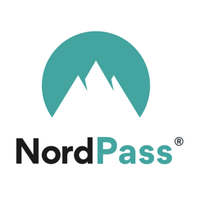
Reader Offer: Save 61% on NordPass Premium NordPass offers an easy-to-use password manager that allows you to save unlimited passwords and passkeys across mobile and desktop. Save 61% on NordPass Premium and get 6 months free.
Preferred partner ( What does this mean? )

The quick list
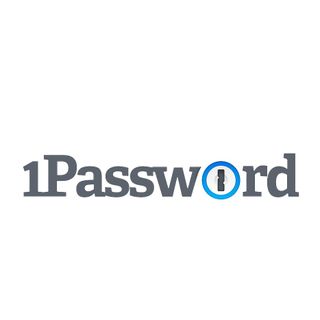
1Password offers both individual and family plans and is available on a wide variety of platforms for both desktop and mobile. Its Travel Mode feature protects your passwords on the go and it even offers "masked" email addresses for greater privacy.
Read more below
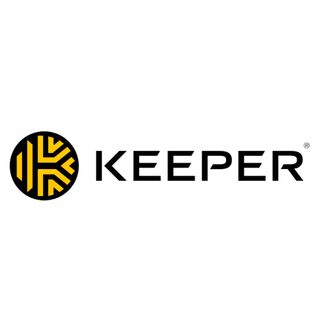
Keeper is a great password manager backed by top-notch security. There are plans for both individuals and families available along with some serious discounts for Tom's Guide readers. Keeper comes with an offline mode and there are also add-ons available for extra cloud storage and dark-web monitoring.
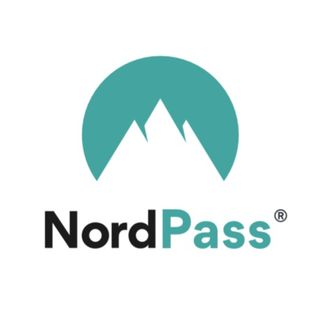
NordPass has individual and family plans along with a free plan with fewer limitations than some of its competitors. New features like a web vault, a standalone browser extension and biometric login support have been added in recent updates too.
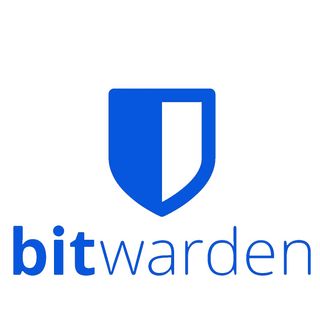
Bitwarden is one of the few password managers that still offers a totally unlimited free version. However, there's also a premium and family plan available that add additional features.
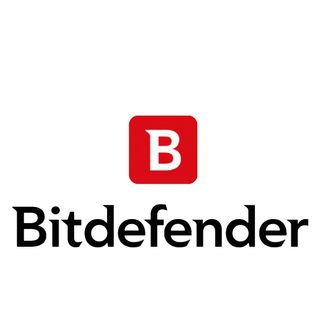
Bitdefender Password Manager is available in individual and family plans and is available for most platforms and browsers. Its low price, layered encryption and integration with the company's other products are some of its best features.
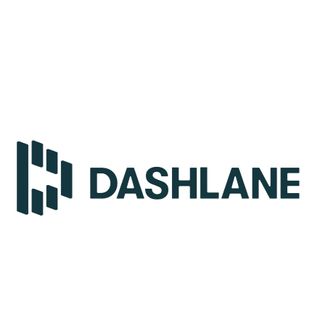
Dashlane offers individual and family plans most major platforms and browsers. Its intuitive interface is a great feature along with its bulk password changer.
The best password managers you can buy today
Why you can trust Tom's Guide Our writers and editors spend hours analyzing and reviewing products, services, and apps to help find what's best for you. Find out more about how we test, analyze, and rate.
The best password manager overall
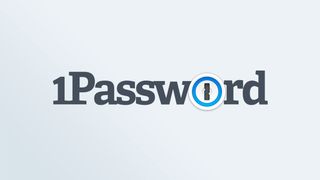
1. 1Password
Our expert review:
Specifications
Reasons to buy, reasons to avoid.
1Password is competitively priced, easy to use and comes with all the features you’ll need in a password manager. From core functions like autofilling passwords across an unlimited number of devices to premium security monitoring, 2FA and passkey support, 1Password is a full-featured password manager with plans for both individuals and families.
With support for Windows, Mac, Chrome OS and Linux on desktop as well as both iOS and Android, you’ll be able to use 1Password to store and sync your passwords on whatever device you’re using. Likewise, 1Password also offers browser extensions for Google Chrome , Safari, Firefox, Brave and Microsoft Edge .
While 1Password doesn’t offer a free tier like some of its competitors, this isn’t a deal breaker as most of these free plans come with significantly less features and loads of limitations. This password manager does have a few unique features too like Travel Mode which lets you temporarily hide logins as well as the ability to restore recently deleted records.
1Password is a top-notch password manager with built-in security that’s both easy and intuitive to use. We also liked how its passkey support is more advanced than its competitors and how you don’t have to pay for extras like a VPN that you may not necessarily need. 1Password is a great choice if you want an excellent password manager that works across all platforms.
Read our full 1Password review .
The best password manager for security
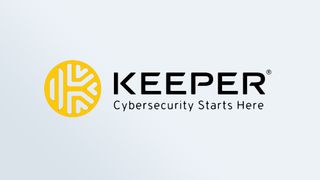
Keeper ( $20.98 per year for Tom's Guide readers ) is another competitively priced password manager with a strong emphasis on security and a consistent user experience across platforms. It has a simple design which makes it easy to use and Keeper matches most of the features found in its top two competitors: 1Password and Dashlane.
Keeper works across Windows, Mac and Linux on desktop as well as on iOS and Android on mobile. However, there are also browser extensions available for Google Chrome, Safari, Firefox, Opera and Microsoft Edge.
Unlike 1Password, Keeper does have a free tier but it likely won’t be useful for most people as it’s limited to just one mobile device. As for its paid plans, you can pick between either an individual or family plan and the latter supports up to five people. Instead of making you pay more for features you might not need, Keeper lets you add dark-web monitoring and additional cloud storage space as part of its Plus Bundle. There are other add-ons too like the one for priority support which you can add to either the individual or family plan.
Keeper has expanded the number of built-in templates for storing other types of sensitive data and 20 new ones were recently added to its password manager. We’re also big fans of the service’s offline mode which creates an encrypted copy of your vault and stores it locally for when you need to access your passwords but don’t have internet access. Keeper falls slightly short of 1Password but it’s definitely worth considering if you’re looking for a secure password manager that’s easy to use. Read our full Keeper review .
The best password manager for iPhone
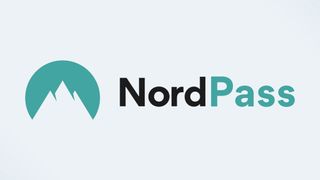
3. NordPass
NordPass is a password manager with a simple, intuitive design from the company behind NordVPN. It’s still a relatively new password manager compared to the competition but it has added a number of new features like a web vault, a standalone browser extension and biometric login support across all platforms in an effort to catch up.
NordPass is available for Windows, Mac and Linux on desktop and while there isn’t an official Chrome OS app, you can use its web vault on a Chromebook. It also works on both iOS and Android on mobile devices and there are browser extensions for Chrome, Safari, Friefox, Edge, Brave and Opera.
In addition to its individual and family plan with support for up to six people, there’s also a free tier. NordPass free allows you to store an unlimited number of passwords and it also comes with autofill capabilities, passkey support, secure notes and multifactor authentication. However, the free tier only allows you to stay logged in on one device at a time. NordPass’ paid plans are a bit more expensive than the competition but frequent discounts can cut the cost of a subscription significantly. In fact, Tom's Guide readers can save an extra 55% and get an extra 6 months free when they sign up for NordPass' two-year plan here .
In addition to more robust password management, upgrading to one of NordPass’ premium plans also gets you security monitoring for your passwords, secure online storage, passkey sharing and Emergency Access capabilities. NordPass has come closer to competing with 1Password and Keeper with its recent updates while its free tier is one of the best after Bitwarden. If you want a password manager with a consistent user experience and all the premium features you could need, NordPass is certainly worth considering.
Read our full NordPass review .
The best free password manager
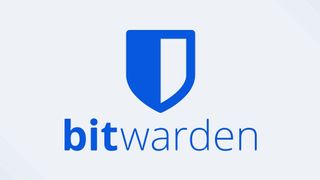
4. Bitwarden
Bitwarden offers a whole lot of value for the price regardless of whether you stick with its free plan or upgrade to one of the paid ones. At the same time, this password manager is highly secure, open source and many premium features are available on its free tier. Bitwarden has apps for Windows, Mac and Linux on desktop as well as for iOS and Android on mobile. One other thing that sets this password manager apart from the competition besides its low cost is that it also offers browser extensions for Vivaldi, Tor, brave and DuckDuckGo in addition to more popular browsers like Chrome, Safari, Firefox, Edge and Opera.
Even if you only sign up for the free version of Bitwarden, you still get unlimited syncing for as many passwords as you want along with autofilling, secure-note storage and sharing. Of all the password managers we’ve tested, Bitwarden’s free plan has the fewest limitations. However, upgrading to this password manager’s premium plans won’t set you back that much at all. Bitwarden’s premium plan costs just $10 per year while its family plan is only $40 per year for up to six people. You also get access to secure cloud storage, priority support, advanced 2FA options and health reports which show if your passwords are weak or have been exposed in a data breach.
Bitwarden does offer quite a lot with either its free tier or its premium plans but it isn’t the most intuitive password manager to use, especially with features like its autofill function. However, it does the basics really well and has the cheapest premium tier of any password manager we’ve tested.
Read our full Bitwarden review .
The best password manager on a budget
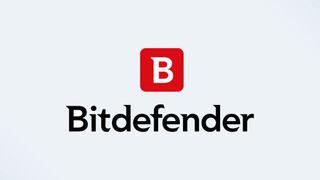
5. Bitdefender Password Manager
Like NordPass, Bitdefender Password Manager is another relatively new offering but it’s also backed by a security company. As such, it’s integrated into Bitdefender Antivirus and the company’s other products with seriously strong encryption to protect your credentials and your privacy.
Bitdefender Password Manager has apps for Windows and Mac on desktop and for iOS and Android on mobile. There are also browser extensions for Chrome, Safari, Edge and Firefox. One thing that sets it apart from other password managers is that if you forget your master password, Bitdefender can recover your entire account for you.
While Bitdefender doesn’t offer a free tier of its password manager, it does give you a discounted rate during your first year of service. Bitdefender Password Manager costs $20 for the first year for its individual plan and goes up to $30 upon renewal. There’s also a shared plan for up to four people that costs $40 for the first year and then $60 after that.
Bitdefender Password Manager is a reasonably priced password manager from one of the biggest names in online security. Several layers of heavy-duty security protect your privacy while 2FA keeps your account and your passwords safe from hackers. If you already use Bitdefender to secure your PC, then signing up for the company’s password manager makes sense, especially as it’s one of the cheapest premium password managers we’ve tested.
Read our full Bitdefender Password Manager review .
The best password manager for features
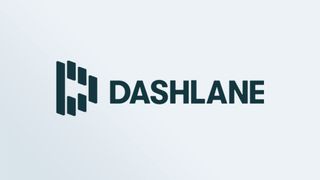
6. Dashlane
Dashlane is a premium password manager with a price tag to match. Still though, for the price you also get dark-web monitoring and access to a VPN from Hotspot Shield . Dashlane does have a very easy-to-use interface across all of the platforms it supports and there’s a guided setup process to make getting started easier.
Dashlane offers apps for Windows, Mac, Linux and Chrome OS on desktop as well as mobile apps for iOS and Android. There are also browser extensions available for Chrome, Safari, Edge, Firefox, Brave and Opera.
If you want to try out Dashlane before signing up, there is a free plan though it does come with serious limitations and you can only store 25 passwords on a single device. As for its paid plans, Dashlane Premium costs $60 per year for a single user while its friends & family plan covers up to 10 people for $90 per year. While its the most expensive password manager we’ve tested, a big part of its higher price is the included VPN service which would cost just under $100 per year on its own.
Dashlane has fallen behind 1Password and Keeper in recent years in terms of price but it remains one of the easiest password managers to use. If you want to get access to a VPN and a premium password manager with one subscription though, it could be worth signing up for Dashlane, especially if you take advantage of its friends & family plan to help justify its higher cost.
Read our full Dashlane review .
How to choose the best password manager for you
Most of the best password managers have the same essential functions but things differ when you get to their extra features.
Some of them, such as Dashlane, 1Password and Keeper, alert you about the latest data breaches, sometimes for an extra price. Many password managers can also offer to save your personal details, credit card numbers and other frequently used information so that they can quickly fill out online forms for you. (This is much safer than letting retail websites save your credit card information.)
LastPass once offered an excellent, unlimited free service tier but that baton has since been passed to Bitwarden which also has a $10 annual premium plan that covers most of the basics.
1Password’s Mac and iOS apps have generally been kept more up-to-date than the company’s Android and Windows applications. It may be the best choice if you exclusively use Apple devices, but the other password managers work just fine across all platforms.
We also tested and reviewed a number of other password managers that didn't quite make the cut for this guide but are certainly worth considering if you want even more options. They include Zoho Vault , True Key , Myki , RoboForm , Blur and KeePass .
The biggest decision though is whether you want your passwords to be stored locally on your own computers and mobile devices, or in the cloud on someone else’s servers. There are pros and cons to each approach though.
Cloud vs. local management
When it comes to picking the right password manager for you, it’s worth considering whether you want your saved passwords to be stored in the cloud or locally on your devices.
For instance, 1Password still gives you the option to store and sync your “vault” of passwords and other sensitive information locally . However, the company still prefers that you use its cloud servers instead.
For KeePass though, local sync is the default option but setting up your Dropbox, iCloud or other cloud storage accounts to sync online isn’t difficult. Meanwhile, the third-party cloud-account option is standard for Enpass but the service has also added a local Wi-Fi syncing feature .
By default, Bitwarden syncs passwords on its own servers but it does provide very detailed instructions on how to shift this function to servers you control instead.
Syncing your passwords locally does provide a security advantage as none of this data needs to reach the internet. For those who want to maintain total control over their passwords, this is the way to go.
The downside here is that it can be a hassle to synchronize these passwords on all of your devices. Some services will allow you to do so over a local network such as a Wi-Fi network or on your own server. Alternatively, you could also put your password vault on a USB flash drive and physically move it from one computer to another.
Cloud-based password managers are far more convenient as these services keep encrypted copies of your vault on their own servers. This ensures that all of your devices will be synced and transmissions between your devices and a company’s servers are encrypted.
Although small, the risk is that one of the cloud servers – even one that you control using Bitwarden or use with Enpass – could be breached and your passwords could be leaked into the wild. For instance, LastPass has had a few documented security issues though all were quickly fixed without any passwords being lost.
If a password manager is doing its job correctly, it’s storing all of your passwords in an encrypted format and only storing your master password as a “hash” that is the result of an irreversible mathematical process.
Whether it’s local or cloud-synced, a password manager puts all of your eggs in one basket, so to speak unless you use more than one password manager. For most people though, the demonstrable benefits of using a password manager far outweigh the disadvantages.
How we test the best password managers
To see how well the best password managers stack up, we put them through extensive testing while conducting our reviews. This involves trying out their desktop apps, mobile apps and browser extensions on a variety of smartphones, tablets, computers and web browsers. However, we also look at the support options available to see whether or not each service has useful setup guides for each platform.
In our latest round of testing, we used a ThinkPad T470 running Windows 10, a Samsung Note 20 smartphone and an iPad Pro. As for the browsers used during our tests, we tested out the best password managers using Google Chrome, Microsoft Edge and Mozilla Firefox.
From here, we added our credentials from several sites like Twitter, Facebook and the Washington Post to each password manager. We then tested out their autofill capabilities as we went about our normal web browsing. This way we could see whether or not a particular password manager is easy to use in your day to day life.
For more on our testing procedures, check out our how we test page for Tom's Guide .
Sign up to get the BEST of Tom's Guide direct to your inbox.
Get instant access to breaking news, the hottest reviews, great deals and helpful tips.
Anthony Spadafora is the security and networking editor at Tom’s Guide where he covers everything from data breaches and ransomware gangs to password managers and the best way to cover your whole home or business with Wi-Fi. Before joining the team, he wrote for ITProPortal while living in Korea and later for TechRadar Pro after moving back to the US. Based in Houston, Texas, when he’s not writing Anthony can be found tinkering with PCs and game consoles, managing cables and upgrading his smart home.
Hurry! Save 50% on this top-rated password manager
Hurry! One of our top password managers is 50% off right now
I tried mouth taping for better sleep — here’s what happened
Most Popular
- 2 5 best Hulu miniseries to binge-watch this weekend
- 3 iPhone 16 or iPhone 16 Pro? Here’s which one our editors would buy
- 4 PS5 Pro — 3 reasons to buy and 2 reasons to skip
- 5 Samsung Galaxy S25 Ultra could get SOS satellite support — what you need to know
Advertisement
- Software and apps
The Best Password Managers

By Max Eddy
Max Eddy is a writer who has covered privacy and security—including password managers, VPNs, security keys, and more—for over a decade.
Almost everyone should use a password manager. It’s the most important thing you can do —alongside two-factor authentication —to keep your online data safe. We’ve evaluated dozens of paid and free password managers, and we’ve concluded that 1Password offers the best combination of features, compatibility, security, and ease of use. You don’t have to pay for a good password manager, but if you can, 1Password is worth the $36 per year. If you prefer free software, Bitwarden does everything you’ll need and doesn’t cost anything.
Everything we recommend
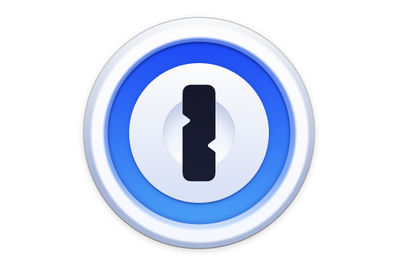
The best password manager
1Password offers attractive and straightforward apps. Newbies will like its plain-language security recommendations and colorful interface, while the technically inclined will appreciate its advanced features and security.
Buying Options
Budget pick.
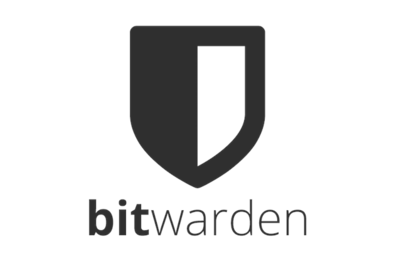
The best free password manager
The free version of Bitwarden covers all the basics of a good password manager and doesn’t cost anything. But features like advanced security reports and encrypted file storage cost extra.
What to know
A password manager creates a unique password for every account, which helps protect you from data breaches.
Password managers automatically fill in the username and password details for you, simplifying and speeding up the login process.
You’ll be able to access passwords from anywhere, including different computers, tablets, and your phone.
Password managers are locked behind a single password, so make it hard to guess and use multi-factor authentication on your account.
1Password has easy-to-use, polished apps that work on Windows PCs, Macs, Chromebooks, iPhones, iPads, Android devices, and the major web browsers. The Watchtower feature helps you identify and change weak, reused, or compromised passwords, and 1Password walks you through correcting these problems in clear, digestible language. 1Password uses strong encryption and good security practices , which sometimes leads to tedious interactions.
The free version of Bitwarden gets the basics right and doesn’t cost a thing, but it lacks a few features that make 1Password such a standout option. Many of those features, such as password checkups and 1 GB of encrypted storage, are available with Bitwarden’s reasonably priced, $10-per-year premium plan. Bitwarden isn’t as polished overall and lacks the in-app guidance of 1Password, which makes it harder for beginners to get the hang of. But the free version of Bitwarden offers the core features you need in a password manager, including the ability to sync as many passwords as you want across as many devices as you own, support for software multi-factor (or two-factor) authentication , and sharing between two people with separate logins using a two-person organization . Bitwarden works on the same devices as 1Password, so you can use it with any computer, phone, tablet, or browser.
Regardless of the password manager you use, it’s important to protect your data with a strong master password—we have advice for how to do that below.
The research
Why you should trust us, why you need a password manager, how we picked, how we tested, the best password manager: 1password, a great free password manager: bitwarden, making a good master password, why can’t you just use the chrome or browser password manager, is it safe to trust a password manager with all your passwords, the competition, frequently asked questions.
Wirecutter has been testing and recommending password managers since 2016.
Max Eddy is Wirecutter’s senior staff writer covering privacy and security. He previously worked at PCMag for 11 years, where he also wrote about password managers and other tools for improving personal security.
Thorin Klosowski has spent a decade writing about technology, with a focus on software for many of those years. He has written about privacy and security for the bulk of that time and has tested countless password managers.
Andrew Cunningham spent years testing, reviewing, and otherwise writing about computers, phones, operating systems, apps, and other gadgets for AnandTech, Ars Technica, and Wirecutter. He has been building, upgrading, and fixing PCs for more than 15 years, and he spent five of those years in IT departments buying and repairing laptops and desktops as well as helping people buy the best hardware and software for their needs.
Passwords are as annoying as they are necessary, and a good password manager can keep you secure while making it easier to juggle the sheer number of passwords you need to be a person on the internet. Using a password manager is one of the most important things you can do to protect yourself online , aside from using multi-factor authentication and keeping your operating system and web browser up to date. If any of your passwords are weak and easy to guess, if you reuse any of your passwords across multiple sites, or if the sites you use are ever hacked and your account is compromised, you risk losing access to your accounts and your data. In fact, if you reuse passwords, chances are good that your password is already out there. You can even check to see if your email address or password has been involved in a data breach.
Password managers generate strong new passwords when you create accounts or change a password. They also store all of your passwords and, if you want, your credit card numbers, addresses, bank accounts, and other information in one place, secured with a single strong master password. All you need to remember is your master password, and your password manager can remember everything else, filling in your username and password for you whenever you log in to a site on your phone or computer. The best part is that once set up, a password manager makes your digital life easier, speeding up the login process and simplifying managing your online accounts. Getting started can be intimidating, but once you’ve done that, it’s a (mostly) painless experience.
For this guide, we’re focusing on the password managers that work best for individuals, rather than those intended for businesses to deploy and manage. To separate the great ones from the merely okay ones, we use the following criteria:
- Good protection for your passwords: You’re trusting your password manager with your entire digital existence, and your password manager should store your data securely . A good password manager needs to use strong encryption to protect your data on your computer, on your password manager’s server, and when your data is moving between the two. But those promises of security only go so far, so we require that any password managers we recommend participate in regular third-party security audits (preferably audits that they make public) and have a bug-bounty program. Security audits aren’t perfect—they offer just a snapshot of the software and infrastructure—but they are a signal of trust and transparency.
- Privacy: A password manager shouldn’t share data with third parties for advertising, so we check both the privacy policies and the mobile apps to confirm that they aren’t sharing data they aren’t supposed to.
- Unlimited password storage: Any paid password manager should be able to store an unlimited number of passwords and other records, and enough free ones offer unlimited storage that you shouldn’t settle for less.
- Sync between devices (and no limits on the number of devices you can use): You probably have more than one device that you use every day, between your home computer, your work computer, your phone, and your laptop. A good password manager should offer cloud syncing so that your passwords remain accessible anywhere on an unlimited number of devices.
- Desktop and laptop compatibility: A password manager should have a Windows and macOS app that you can use to browse, add, and edit your information. We note Linux compatibility but don’t require it. Support for Chrome OS is generally covered by Chrome browser extensions.
- Web browser compatibility: We prefer those password managers that offer browser extensions for Chrome, Edge, Firefox, and Safari. The extensions are responsible for autofilling passwords and other forms, as well as for generating and saving new passwords when you change one or make a new account.
- iOS and Android compatibility: A password manager should have apps for both iOS and Android that are easy to use and capable of autofilling passwords in browser windows and within apps. The apps should walk you through the process of setting them up and giving them the permissions they need to work.
- Ease of setup and use: A password manager should make it easy to get started or to transition from using browser-based password autofill, as well as to set up all the apps and browser extensions required. And once you’ve set up your password manager, it should be easy (not annoying) to use when you need it.
- Tools to fix your security problems: Once your data is in your password manager, it should be able to identify weak, reused, and compromised passwords, and it should give you clear and easy-to-follow directions for changing them.
- Support for biometric logins: If your phone, tablet, or laptop has a fingerprint reader or face-scanning camera, you should be able to unlock your password manager with that, rather than a password or PIN, for convenience’s sake.
- Price: The paid password managers we evaluated usually cost between $10 and $60 per year for one person to use, though decent options are available for free. Password managers that offer family plans usually cover four or five people, so they’re generally a good deal even if your family has only two people. Although password managers often advertise a monthly subscription fee, the fees are typically billed yearly.
- Password sharing: A good password manager should make it easy for you to securely share login data with someone else you trust for accounts that multiple people may need to access—for example, sites for paying your family’s bills, or shared email and social media accounts for a small business. This feature is common in paid password managers but rare in free ones.
After searching and consulting sites such as CNET , PCMag , Tom’s Guide , and Wired , we assembled a list of about 40 free and paid password managers. We dismissed most of them because they weren’t compatible with all of the operating systems and browsers we wanted or because they didn’t take part in third-party security audits.
In 2024, we tested 11 password managers: 1Password, Bitwarden, Dashlane, Enpass Premium, Keeper, mSecure, NordPass, Proton Pass, RoboForm Premium, Sticky Password, and Zoho Vault. We installed each of these password managers on a Windows PC, a Mac, an iPhone, and an Android phone.

1Password offers the best combination of compatibility, ease of use, features, and price of any paid password manager we’ve tested. It has polished apps that work on just about any computer, tablet, phone, or web browser. We like how easy it is to identify and change weak, reused, or compromised passwords through the Watchtower feature, and we like how 1Password walks you through correcting those problems in clear, easy-to-follow language. The company has good security practices and uses strong encryption to protect passwords. 1Password costs $36 a year for individuals or $60 a year for families of two to five—on the high end of average for paid password managers—though it does offer free accounts for politicians and activists as well as journalists .
1Password is compatible with the most-used operating systems and browsers. Standalone apps for Windows , macOS , iOS , and Android all allow you to view and edit all the items in your vault. 1Password also has browser extensions for Chrome, Firefox, Brave, and Microsoft Edge that handle basic functions like autofilling passwords and creating new ones. If you use Safari on Mac, you need to download the desktop app, which includes the extension for Safari. We recommend downloading the desktop and mobile apps for your operating systems, along with the browser extensions for whatever web browsers you use. 1Password’s desktop apps for Windows and Mac are also far superior to what you get with Bitwarden, which requires the web app for features beyond password generation and search.

It’s easy to set up and use. We know that password managers can seem overwhelming to set up, but we think everyone should use them, not just the technologically savvy. 1Password does the best job of making it easy to incorporate a password manager into your daily habits with a user interface that’s simple to understand even for people who are new to a password manager. You can quickly view and change saved passwords and other information. Your default “vault” stores login information, credit card numbers, and data for autofilling forms. And if sorting items alphabetically or by tag isn’t good enough, you can create any number of vaults to organize your information (if you want to store logins for your personal accounts and work accounts separately, for example). This is especially important for 1Password Families or Business accounts, where you might want to share the contents of one vault with other 1Password users while keeping other vaults private.
All versions of 1Password and Bitwarden support logging in with your face or fingerprint, depending on what biometric authentication options your computer, phone, or tablet offers. We recommend using this feature on iOS and Android especially, where typing in a long master password multiple times a day will cost you time and annoy you. Both apps can replace iOS’s and Android’s built-in password-autofill features and can work in apps as well as on websites.
No password manager has a foolproof introduction that teaches you everything you need to know, but 1Password’s extensive support articles —which usually include large screenshots or video tutorials—make it a solid choice for people new to password managers. It’s easier to learn than most free options, including Bitwarden.

It's affordable for individuals and families. 1Password costs $36 a year for one person or $60 a year for families (regardless of whether your family has as few as two or as many as five people); it’s more expensive than some of our other finalists but about average for an excellent password manager. LastPass Premium costs the same amount for individuals but only $48 for families of up to six. Bitwarden’s free plan and $10-per-year Premium plan allow you to share with one other person for no extra cost, but if you want to share with more people than that, you need to sign up for a family plan for $40 a year. If you decide not to renew your 1Password account, you can still access your passwords, but you can’t create new ones.
When you set up a 1Password family plan, you put your passwords and other information in your shared vault instead of your personal vault to give access to everyone else on your plan. “ Family organizers ,” a group that includes the 1Password account that created your family’s account plus anyone they designate as a “family organizer,” can recover the accounts of other family members if they forget their master password or secret key, which is useful for helping kids or less technically inclined folks. 1Password doesn’t have any sort of emergency-access feature in cases where you or another family member cannot access their account; if you want your account shared after death, storing the Emergency Kit in a shared safe is the only way to do so.
1Password has strong security policies. By default, all of your information is backed up to 1Password’s servers; the data is protected under end-to-end 256-bit AES encryption, which means that no one but you can read it on 1Password’s servers (including 1Password employees) or when the data is in transit between 1Password’s servers and your device. Additionally, you need to present your master password and a “Secret Key” each time you set up a new device. This is a little tedious, but 1Password says it allows the company to better secure your data and ensure attackers can’t steal the means to decrypt your vault from 1Password. (For details, you can read more about 1Password’s security model .)
1Password has comprehensive features that improve your online security. 1Password’s Watchtower feature—which is both a dedicated section of the app and a collective name for all the ways in which 1Password tries to protect your logins—identifies weak and reused passwords, passwords for websites that don’t use the secure HTTPS protocol, passwords for sites that have been hacked, passwords that are about to expire, and accounts for which two-factor authentication is available but has not been enabled. 1Password told us that Watchtower can also highlight sites in your vault that now offer passkey authentication. In all cases, the app offers straightforward directions for solving the problem. Bitwarden has a similar feature, called Vault Health Reports, that’s available only for paid subscribers.
Other handy 1Password features include 1 GB of secure online storage for sensitive files, such as scans of sensitive documents, and Travel Mode , which allows you to temporarily remove selected vaults from your device if you’re worried about your device being searched or stolen while you’re traveling. 1Password integrates with Privacy , a service for creating one-time-use credit cards, which is convenient when you’re shopping online at sites you’re not confident in or testing out subscription services you don’t want to auto-renew. It also allows you to securely share anything in your vault , including documents, even if the recipient doesn’t use 1Password. Recently, 1Password added the ability to store passkeys . Version 8 of 1Password added the ability to autofill passwords in desktop apps on both Windows and Mac with its Quick Access tool, which simplifies logging in to all sorts of software.
Flaws but not dealbreakers
It’s the least awkward, but it’s still quirky. In our latest round of testing, 1Password sometimes struggled to recognize password fields on Android. No password manager we tested was free of these types of little peculiarities, though, and 1Password was less glitchy than most.
The quirks of 1Password start the second you prepare to install it. You can install just the browser extensions and get most of the basic features that people usually need, or you can also install the desktop apps and get advanced features for organization and benefits like Face ID or Windows Hello support. Or you can install both the extension and the desktop app, which is what we typically recommend, even though it can sometimes be difficult to know which one to use and when.
On iPhone and iPad, 1Password offers two methods to access your passwords, either through the Safari extension or the autofill menu . The Safari extension lets you interact with 1Password through the same small icon placed on the login field as it does on desktop, which is a little difficult to navigate on the smaller screen of an iPhone. Enabling both isn’t necessary and just adds confusion, so we recommend sticking with autofill. The same goes for Bitwarden, or any other third-party password manager you use.
Its security features can sometimes cause headaches. 1Password’s requirement of a Secret Key and a password to set up a new device is annoying, and we also found that 1Password frequently locked itself and re-prompted us for authentication. When it locks depends on the device, but logging in several times a day can be a pain. It’s good security for a password manager to lock itself periodically, but we know that most people don’t want to use something that they find more irritating than helpful. You can easily change this behavior in 1Password’s settings, or you can enable biometric authentication to log in faster.
There’s no free version. 1Password’s features are worth paying for, but Bitwarden shows that it’s possible to offer a free password manager that leaves off a few features without feeling too restrictive. That said, we’ve concluded that 1Password more than justifies its expense.

If you don’t want to pay for a password manager, if the added features in 1Password aren’t appealing to you, or if you’d like to self-host your password manager, use Bitwarden . The free version of Bitwarden is missing a few features in comparison with 1Password, such as comprehensive password checkups, security-key support, and 1 GB of encrypted storage. But it has all the important features of a password manager: You can sync with as many devices as you want and store unlimited passwords, and the free account allows you to share password collections with one other person. And Bitwarden has the same wide-ranging compatibility as 1Password, so you can use it with just about any device. Bitwarden’s security protocol is similar to 1Password’s, so even if Bitwarden’s servers are compromised, your passwords are safe. Bitwarden now undergoes annual third-party security audits , similar to the repeated security audits 1Password does . If you’ve never used a password manager before, Bitwarden doesn’t teach you the basics as well as 1Password does, but its documentation is thorough and easy to search.
It’s widely supported across platforms. Bitwarden supports the same operating systems and browsers as 1Password does, including Windows , macOS , iOS , and Android . Bitwarden, like 1Password, supports logging in with your face or fingerprint, whichever method your device supports. It offers browser extensions for Chrome , Edge, Firefox , and several other browsers. Like 1Password, Bitwarden packs its Safari extension into the desktop app. You can also self-host Bitwarden, in which case it’ll never upload your password to the company’s servers, but setting that up is a complicated process .

It has clean, usable apps and extensions. Functionally, the Bitwarden extensions and desktop apps do the minimum we ask of a password manager: They store and generate passwords. They’re not as polished as 1Password’s apps, they don’t alert you about weak passwords when you log in (you can click an icon in the extension to check when you visit a login page, though), and they don’t support Bitwarden’s premium password-audit features (you need to use the web app for those). On top of that, free accounts don’t get any password reports aside from a data-breach report, which checks Have I Been Pwned? for your email address. To scan your accounts for breaches, reused passwords, exposed passwords, and unsecured websites, you need to visit the Bitwarden website and have a $10-per-year premium account.
By contrast, 1Password’s audit notes and suggestions are visible throughout its apps and don’t require you to visit the website. On free accounts, Bitwarden Send , a feature that lets you share encrypted files, is limited to text sharing, but on premium accounts you can share other files, as well. Both the free and premium versions of Bitwarden include built-in support for multiple email alias services , including our favorite , SimpleLogin and Fastmail. This integration allows you to create an email alias and password when creating new accounts, a feature that’s limited to Fastmail accounts in 1Password . Like 1Password, Bitwarden can also store passkeys.
It gives you pretty much everything you need from a password manager. The biggest features you’re likely to miss in the free version are password audits, the option to grant emergency access to a person you choose, the ability to send files securely , priority tech support, and the 1 GB of secure storage. If you’re new to password managers and you want to try Bitwarden, the service is worth the $10 for at least one year so you can improve any weak passwords you have right now. Unlike most free password managers, Bitwarden allows you to share a collection of passwords with one other Bitwarden user for free; you have to pay if you need to share with more people. This feature is handy if you want to share certain logins with a partner or roommate, for example, whether that’s for banking access or just your video-streaming account.
It doesn’t restrict the number of devices you can use or passwords you can store like other free password managers do. According to Bitwarden’s privacy policy , the company doesn’t sell or share any personal information for commercial purposes, (Bitwarden does gather some anonymized usage data, but it’s nothing we’re concerned about), though the free version does show you an ad for the premium account.
It has unique onboarding and support options. Bitwarden’s documentation has improved over the years , even introducing video tutorials , but 1Password still does a more comprehensive job of onboarding people who have never used a password manager before. Bitwarden does offer some tools that 1Password doesn’t, including occasional training events that walk you through the setup process and features. If you can’t attend, you can replay the event video. We think 1Password is easier to get the hang of using if you’ve never used a password manager before, but Bitwarden isn’t far behind.
The main benefit of using a password manager is that you need to remember only one password, instead of dozens, to access all of your accounts. But the one password you do need to keep track of—your master password—must be a good one.
The Cybersecurity and Infrastructure Security Agency recommends that passwords be at least 16 characters long or comprise five to seven individual words. 1Password suggests making a long but memorable password, perhaps composed of multiple random words with dashes, periods, or some other easy-to-remember punctuation in between. The password generators from 1Password and Bitwarden offer a handy way to make one of these passwords regardless of the software you use.

The argument for creating a memorable but unique password is that you can memorize it yourself without making it easy for others to guess; you should try to memorize your master password if at all possible. But in case of emergencies, you should also write it down on a physical piece of paper and put it somewhere safe—storing it digitally, especially using a cloud service like Dropbox, Google Drive, iCloud, or OneDrive, risks exposing it to hackers, which would defeat the purpose. 1Password even gives you a handy Emergency Kit printout on which you can write your account information, your secret key, and your password, along with a QR code you can scan when you set up 1Password on a new phone, tablet, or computer.
Of course, your master password shouldn’t be the only thing protecting your account. You should also protect your password manager by using two-factor authentication. An app such as Authy or a security key can secure your account further. When you log in, you’re asked to supply both your password and the second factor—either a code from an authentication app or a physical security key—before you can log in on a new device. This means that if someone gets your master password, they still won’t be able to log in to your account without the second factor. This extra step might sound like a pain, but it’s necessary only when you sign in from somewhere new—such as a new browser, laptop, or phone—so it doesn’t cause friction daily.
Most web browsers offer to save your passwords for you, and some—including newer versions of Chrome , Firefox , and Safari — offer to generate new ones for you, just like a password manager. They can even alert you to password reuse and breaches.
Using your browser’s password storage is far better than doing nothing; most major browsers support some kind of syncing across devices, offer encryption and two-factor authentication for password data, and can fill in other forms for you. But using a standalone password manager has one primary benefit: It can work across multiple operating systems and browsers depending on what you prefer. Interoperability is improving (you can now save a password in Chrome and access it in Safari on mobile, for example), but browser-based password managers still sometimes work only in that browser, and if they do offer support across platforms, that feature tends to be awkward to use. But those restrictions can be a strength, too: Built-in password managers are often easier to use for newcomers, and since they’re integrated at a system or browser level, they are less clunky and require less setup than standalone software.
Good standalone password managers also include features not often found in browser-based password managers, such as mechanisms for easily sharing passwords with family members and friends when many people need to log in to a single site. And because the password managers we recommend include standalone apps as well as browser extensions, you can easily use a password manager to store other data, such as software product keys, addresses, bank account numbers, and credit card numbers (some browsers also offer to store these things for you; others don’t).
If you have been using your browser’s built-in mechanism for saving passwords and want to move on to a standalone password manager, both 1Password and Bitwarden can import saved passwords so you don’t need to start from scratch.
Protecting all of your passwords with a strong master password is convenient, but what happens if your password manager’s servers are compromised and your data is stolen?
Both 1Password and Bitwarden are transparent about their security models and what they’re doing to keep your data safe even in the event of a hack . Both use 256-bit AES encryption to make your data unreadable to anyone without your master password, whether your data is stored on your personal phone or computer, stored on 1Password’s or Bitwarden’s servers, or in transit between your devices and the servers. Both also claim to have a “zero-knowledge” security model, where no one working for 1Password or Bitwarden can ever see your master password, so no employee (and no one who has broken into their systems) could decrypt your data and see it even if they had access to it. 1Password routinely subjects itself to third-party security audits to make sure that its systems are secure and that it follows security best practices. Bitwarden does security audits every year, completing its most recent audit in 2023 . Both 1Password and Bitwarden also interact with security researchers through public bug-bounty programs.
Using a password manager that stores data in the cloud comes with some inherent risk, but we think 1Password and Bitwarden manage it well. If you absolutely must keep your passwords stored locally, KeePassXC may be a good fit.
The privacy policies of 1Password and Bitwarden lay out what information the companies gather and in what circumstances third parties might be involved. We didn’t see anything that gave cause for concern. Both companies told us directly, and state in their documentation, that they will not sell or share customer data for commercial purposes.
1Password and Bitwarden both support generating multi-factor authentication codes for your logins—storing what’s called TOTP codes just like a standalone authentication app would—but we do not recommend using this feature in your password manager. Although the feature provides some convenience by autofilling the code for you, the result is that if an intruder gains access to your password manager, they can also get into all your accounts. You should enable multi-factor authentication for the password manager itself, so you might as well use that same authenticator app (or security key) for the rest of your authentication needs.
LastPass Free was once an easy recommendation, but in December 2022, LastPass announced a data breach that exposed encrypted password vaults along with personal details , including names, email addresses, IP addresses, phone numbers, and some billing information. Account passwords weren’t exposed, but hackers can theoretically access password vaults by guessing master passwords. If a master password is weak, that exposure could happen quickly . The breach was so bad that security experts recommended that anyone who uses LastPass change all their passwords and consider moving to another password manager . In February 2023, the company revealed that an attacker had also gained access to a LastPass employee’s home computer , snagging the employee’s password for a corporate vault in the process. This doesn’t affect the already bad state of customer accounts, but it does make the company look even worse. Since then, the company has changed some policies to improve the security of vault data.
Dashlane Premium is as polished as 1Password and also has a free version, but that version is limited to one device, and most people have multiple devices. At $60 a year, Dashlane’s most popular plan is expensive; the $90-a-year family plan that covers up to 10 people is a better deal, but that’s still $30 more annually than 1Password’s family plan.
Proton offers a password manager called Proton Pass alongside its family of privacy-focused products that also includes email, online storage, and the best free VPN we’ve tested. The service has improved greatly with expanded support for desktop apps as well as browsers, email aliases, and a reduced price. Proton Pass has a surprisingly feature-rich free plan, but still lacks the advanced tools of our top picks and doesn’t offer an affordable family plan.
Keeper and NordPass have many of the same paid features as 1Password does, but we found both apps less intuitive to use than 1Password. The pricing plans of both are confusing, relying on annual discounts or doling out specific features piecemeal. Zoho Vault is especially intriguing because it’s completely free for one person, but we found it was overly complicated and clearly intended for enterprise use. And although we found Enpass Premium too complex for most people, it’s an intriguing option for anyone who wants to keep control of their password manager data.
We dismissed most other password managers for lacking one or more features, such as not participating in third-party security audits or not supporting one or more of our desired operating systems. That list includes Ascendo DataVault Password Manager , Avira Password Manager Pro , Bitdefender Password Manager, eWallet , F-Secure ID Protection , LogMeOnce , McAfee True Key , mSecure , Norton Password Manager , oneSafe , Password Boss , Password Safe , RoboForm Premium , SaferPass Premium , SplashID Pro , and Sticky Password .
This article was edited by Caitlin McGarry.
Additional reporting for this guide was contributed by former Wirecutter editor Thorin Klosowski.
Should I use the two-factor authentication codes my password manager provides?
1Password and Bitwarden both support storing two-factor authentication codes, but we don’t recommend using that feature. If a snoop or intruder does somehow access your password manager, they would then also get into all the accounts with two-factor authentication enabled. You should enable two-factor authentication to protect your password manager account anyway, so you might as well use that same 2FA app (or key) for the rest of your authentication needs. (Note that Bitwarden now offers a stand alone 2FA app.)
Can I use a password manager with a YubiKey?
Usually, yes. Both 1Password and Bitwarden Premium accounts support security keys as a second factor for login.
Are “suggested passwords” safe?
Yes. Suggested passwords are randomly generated, so it’s very unlikely that someone could guess them. Both of our picks allow you to set up different rules for password creation—such as what sorts of characters to include or whether to use real words—but the default settings are secure enough for most people. However, if one of your suggested passwords is swept up in a data breach, you should still change it.
Doesn’t prefilling passwords mean that anyone at my computer can log in to my accounts?
That’s true only if you unlock your password manager and then walk away from your computer. Password managers are generally designed to “lock” after a period of inactivity, requiring your master password before they’ll work again.
You can also avoid the problem by locking your computer whenever you walk away from it. You can do so by putting your computer to sleep, or by pressing the Windows+L (on Windows) or Control+Shift+Power (on MacBooks) keyboard shortcut.
Can I access my passwords on a public computer?
Yes. 1Password and Bitwarden both have web apps that you can log in to from anywhere—they don’t support the same convenient autofill capabilities as the browser extensions, but they do provide easy access to your passwords and any other information you have stored. Remember to log out of them when you’re done using the public computer.
Does a password manager work on my iPhone or Android phone?
Yes. Most password managers with iOS and Android apps can autofill usernames and passwords both on websites and in apps, replacing (or augmenting) the built-in autofill features in those operating systems. You can find directions for setting this up in 1Password on iOS and Android , as well as directions for Bitwarden on iOS and Android .
What if I forget my master password?
A good password manager is designed so that a person who doesn’t know your master password will never be able to get into your account and access your data—and that includes yourself. Make sure to write down your master password (and we mean actually write it down, with pen and paper) and store it somewhere safe to prevent this from happening.
If you have forgotten your master password, your options depend on which password manager you’re using. In Bitwarden, you need to delete your entire account and start again from scratch. 1Password gives you a couple of other options, including resetting your master password from another family member’s account. If you do need to start from scratch, the process is annoying and time-consuming, but it isn’t the end of the world—you’ll need to reset every password on every site you use, but once you’ve done that, you’ll be back where you started.
Can I share passwords with a family member?
A 1Password family plan allows family members to share different vaults, so you can share some logins (for paying bills or managing finances, for example) but not others (for personal email or sites you use for work, say). Bitwarden offers the same features for less money, though it’s less user-friendly; you need to set up an “ organization ” to create and share password vaults. A two-person organization is free, while larger organizations cost $3 per month per person.
How do password managers work with passkeys?
Passkeys are a new secure authentication technology, endorsed by Apple, Google, and Microsoft, that is designed to replace passwords. That might lead you to think the days of password managers are numbered, but that isn’t the case. For one thing, passkeys are very new and still aren’t widely supported. For another, you need a place to store your passkeys, and several password managers—including 1Password and Bitwarden—now let you do just that. You can even log in to a Bitwarden account with a passkey, and the same feature is currently available in beta on 1Password .
Sarah Brown, What if 1Password gets hacked? , 1Password Blog , April 8, 2020
Kyle Spearrin, Bitwarden Upholds High Security Standards with Annual Third-Party Audits , The Bitwarden Blog , February 28, 2023
Bitwarden Security Paper (PDF) , Bitwarden, October 2020
1Password Security Design (PDF) , 1Password , October 25, 2023
Meet your guide

Max Eddy is a senior staff writer at Wirecutter specializing in security and privacy. He was previously lead security analyst at PC Magazine.
Further reading

Back Up and Secure Your Digital Life
From password managers to backup software, here are the apps and services everyone needs to protect themselves from security breaches and data loss.

The Best Security Key for Multi-Factor Authentication
A physical security key helps you protect your online accounts, and Yubico still makes the best one.

Our Favorite Password Manager Remembers All of Your Logins So You Don’t Have To
1Password remembers all of your online logins so that you don’t have to.

How to Get the Most Out of 1Password
Everyone should use a password manager. Our expert walks you through how to set up and take advantage of the features in our favorite, 1Password.
TechRepublic
Account information.
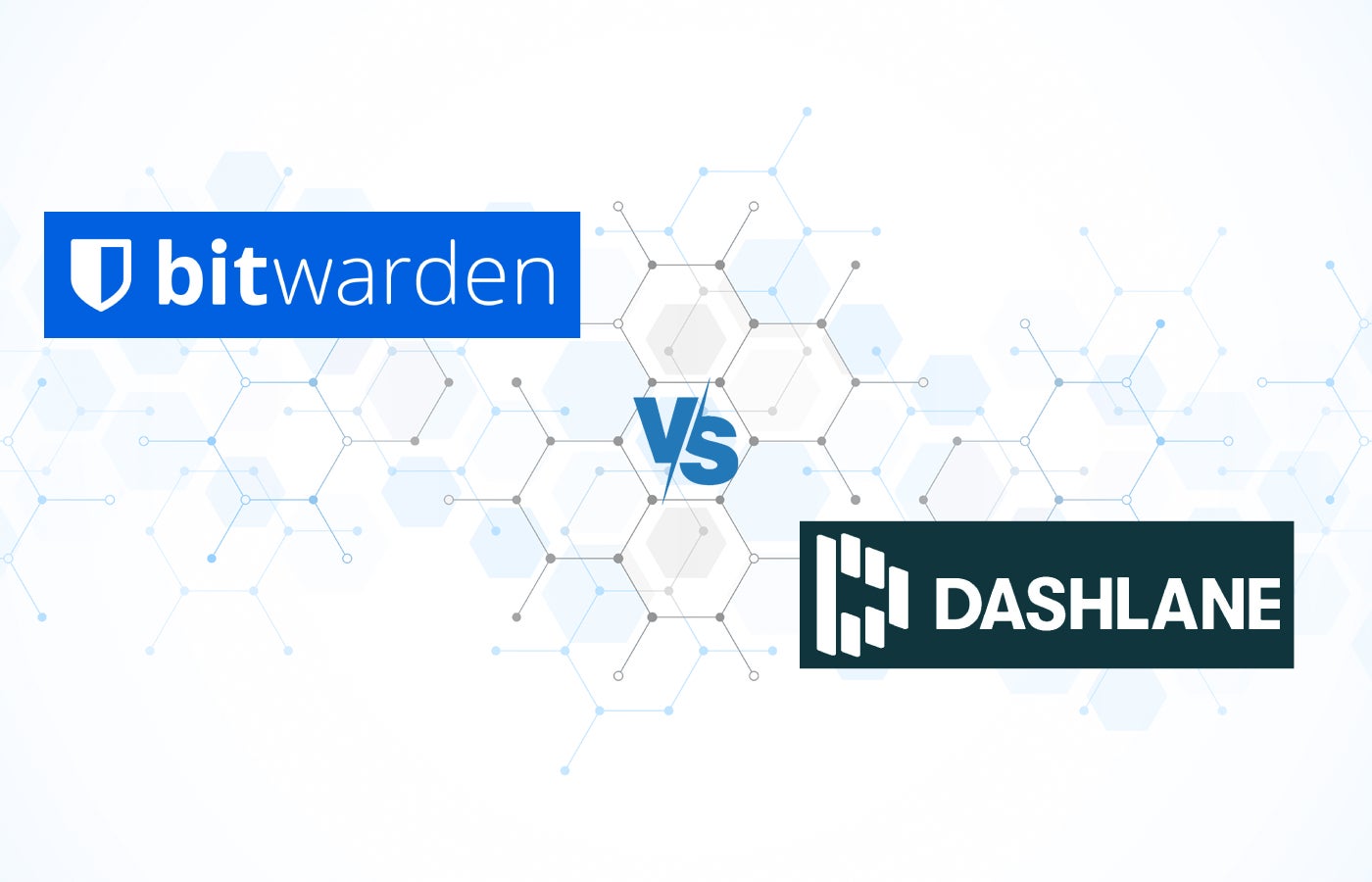
Share with Your Friends
Bitwarden vs Dashlane (2024): Which Password Manager Is Best?
Your email has been sent

Bitwarden and Dashlane are two of the most popular password managers available today. Despite being similarly popular, the two providers reached their success by offering distinct and unique password management solutions.
SEE: Bitwarden vs 1Password (2024): Password Manager Comparison (TechRepublic)
Bitwarden’s open-source software and wide platform support are perfect for more advanced users. On the other hand, Dashlane’s polished user interface makes it an appealing choice for less tech-savvy users.
In this article, we explore which password manager is best for you and your organization.
Featured Partners
1 uniqkey - business password manager.

Bitwarden vs. Dashlane: Comparison
Bitwarden vs. dashlane: pricing.
Both Bitwarden and Dashlane offer two types of subscriptions: Personal and Business. On paper, Bitwarden is the more affordable option across the board. It also has a free version that provides unlimited password storage, while Dashlane has a maximum of 25 logins for its free plan.
SEE: How to Start a Career in Cybersecurity (TechRepublic Premium)
To Dashlane’s credit, it has free trial options for both its consumer and business plans — a 30-day trial for Premium and a 14-day trial for Business. On the other hand, Bitwarden offers a seven-day free trial for its Enterprise plan.
Bitwarden pricing
- Free : Unlimited passwords, 1 device.
- Premium : $0.83 per month; unlimited devices.
- Families : $3.33 per month; up to 6 users.
- Teams : $4 per month per user; data sharing, directory integration and event log monitoring.
- Enterprise : $6 per month per user; enterprise policies and passwordless SSO.
- Personalized quote : Contact sales for custom quotation.
If you want to learn more, read our full Bitwarden review .
Dashlane pricing
- Free : 25 passwords; 1 device.
- Premium : $4.99 per month; unlimited devices.
- Family : $7.49 per month; up to 10 users.
- Business : $8 per month per user; unlimited seats, SSO, activity logs and advanced policies.
- Enterprise : Contact sales for pricing; all Business features and dedicated customer success manager, onboarding specialists and engineer.
If you want to learn more, read our full Dashlane review .
Bitwarden vs. Dashlane: Feature comparison
Security and encryption.
Winner: Tie
Both Bitwarden and Dashlane provide top-tier security and encryption in their respective services. In terms of encryption, the two providers utilize the same AES 256-bit encryption algorithm, which is considered the best in the business.
SEE: Bitwarden vs LastPass 2024: Which Password Manager Is Best? (TechRepublic)
In addition, both password managers get good marks in terms of third-party testing. Dashlane recently announced they’ve achieved ISO 27001 certification. This shows Dashlane’s internal structures and processes meet the high security standards required of modern businesses.
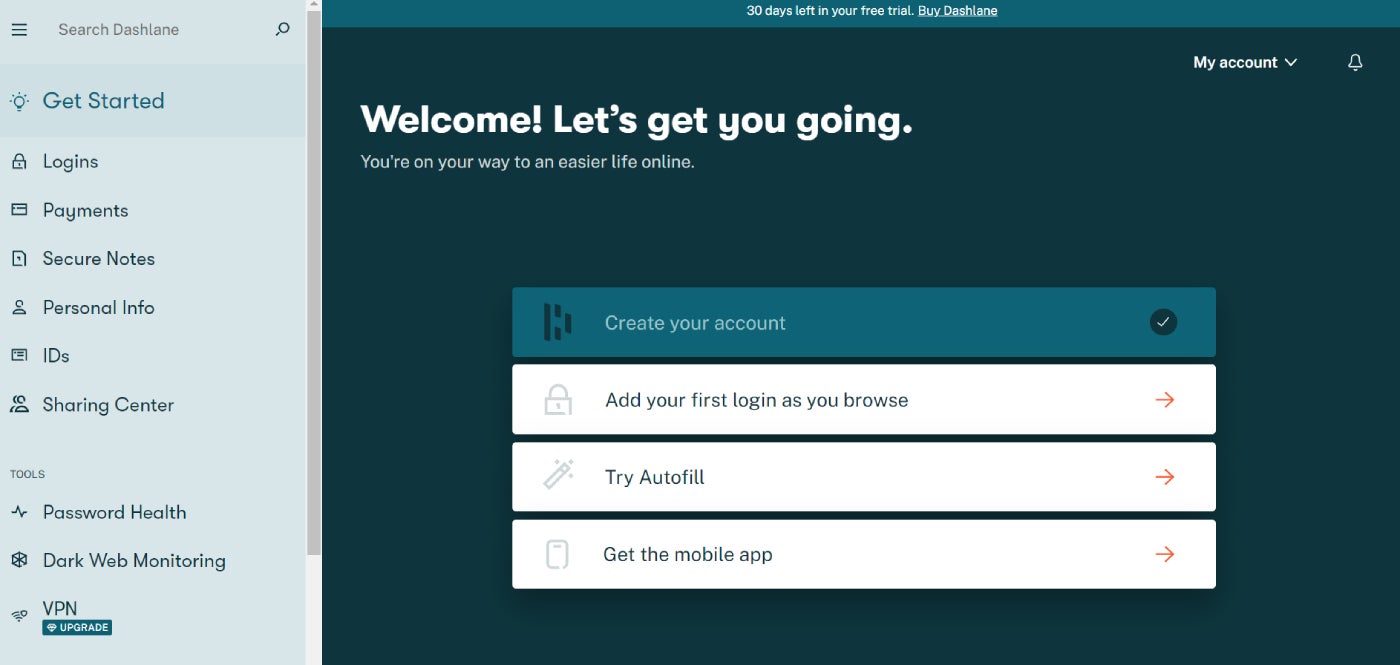
On the flip side, Bitwarden regularly undergoes third-party security audits to validate its security claims and comply with security requirements. Bitwarden is also open-source, which allows the public to easily view their code and spot vulnerabilities.
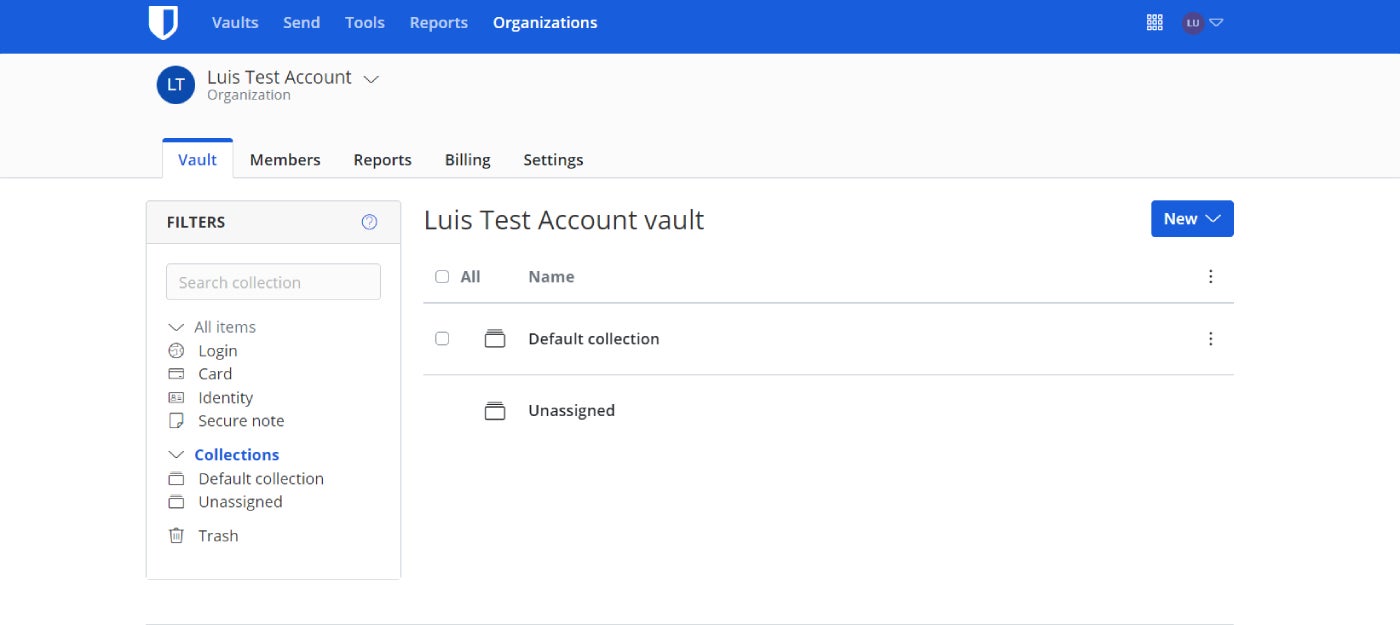
I personally like software that’s open-source, but it isn’t a deal-breaker per se. I just want to see providers take concrete steps to show customers they take security seriously. Of course, if you’re particularly interested in open-source software, Bitwarden is the better choice.
Dashlane is partially open-source, with its Android and iOS applications’ code available for public viewing, but its main desktop application is closed source.
Multi-factor authentication options
Winner: Bitwarden
If you want an abundance of multi-factor authentication options, I recommend Bitwarden. It offers MFA via authenticator apps, email, SMS, phone call, YubiKey, FIDO2 WebAuthn and Duo Security, among others.
SEE: Bitwarden Free vs. Premium: Which Plan Is Best for You? (TechRepublic)
On the other hand, Dashlane has MFA using time-based one-time passwords or TOTPs via authentication apps as well. While Dashlane used to have a dedicated authenticator app, this was discontinued in May 2024.
Ease of use and performance
Winner: Dashlane
When we take a look at ease of use, I have to give it to Dashlane. It uses a sleek dashboard that feels modern and is intuitive to use.
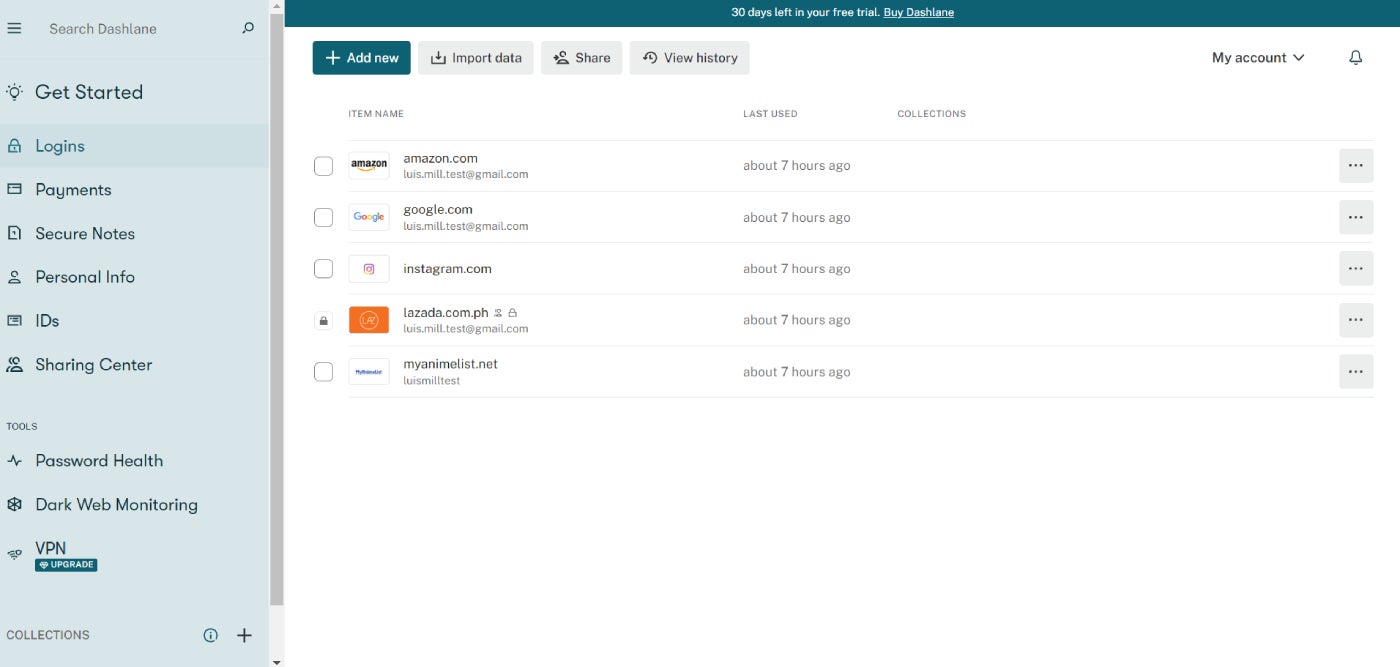
Settings and menus are where I expected them to be, and I had no trouble using all the included features. In particular, I really liked the large spaces and texts used for its menus, as it reduces visual clutter with all the information displayed in the app.
The same can be said for its password management performance. I found Dashlane’s autofill to be reliable, and I encountered zero issues with the app displaying during various log-in attempts — be it for suggesting a randomized password or bringing up a previously saved one.
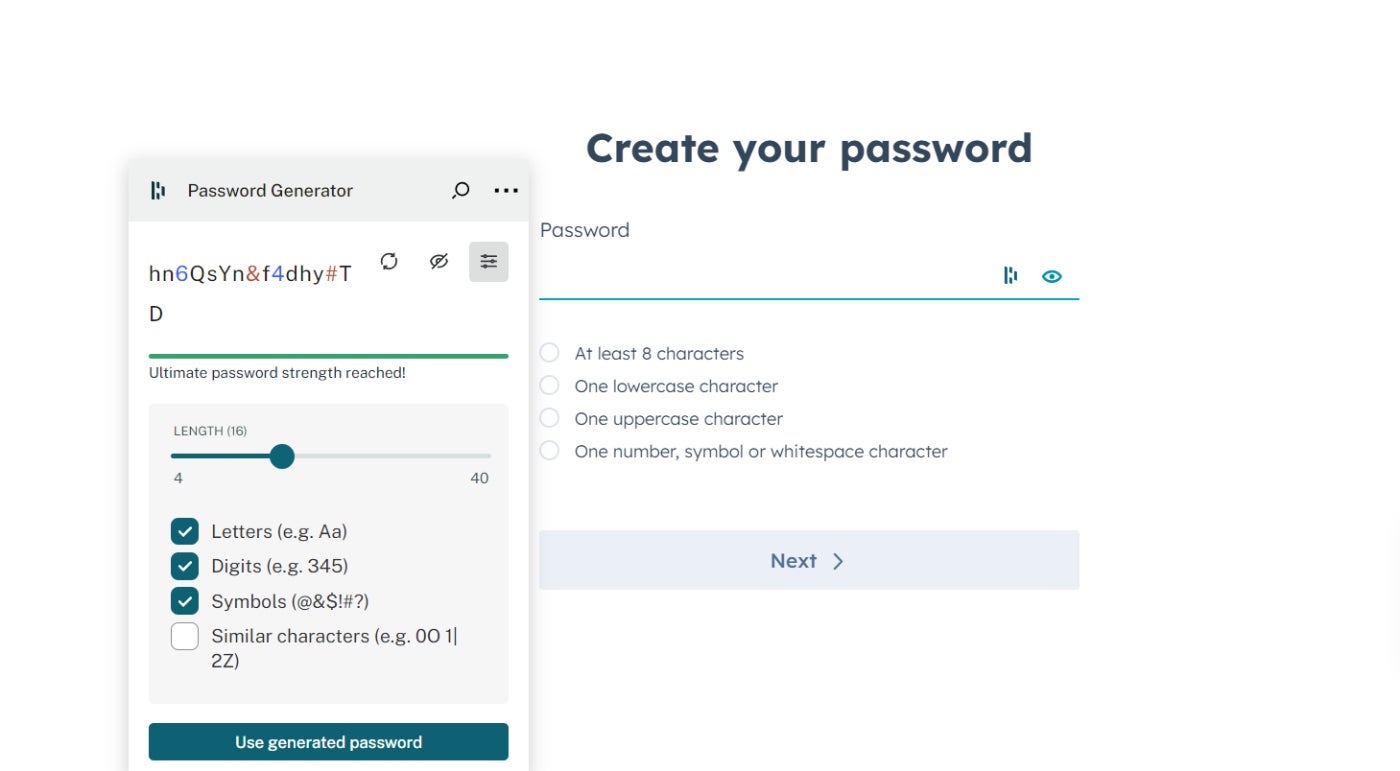
Meanwhile, Bitwarden comes with a fairly decent app of its own. Its app interface is likewise clean and minimalistic. However, I do think Dashlane’s app has a more intuitive placement of settings and menus.
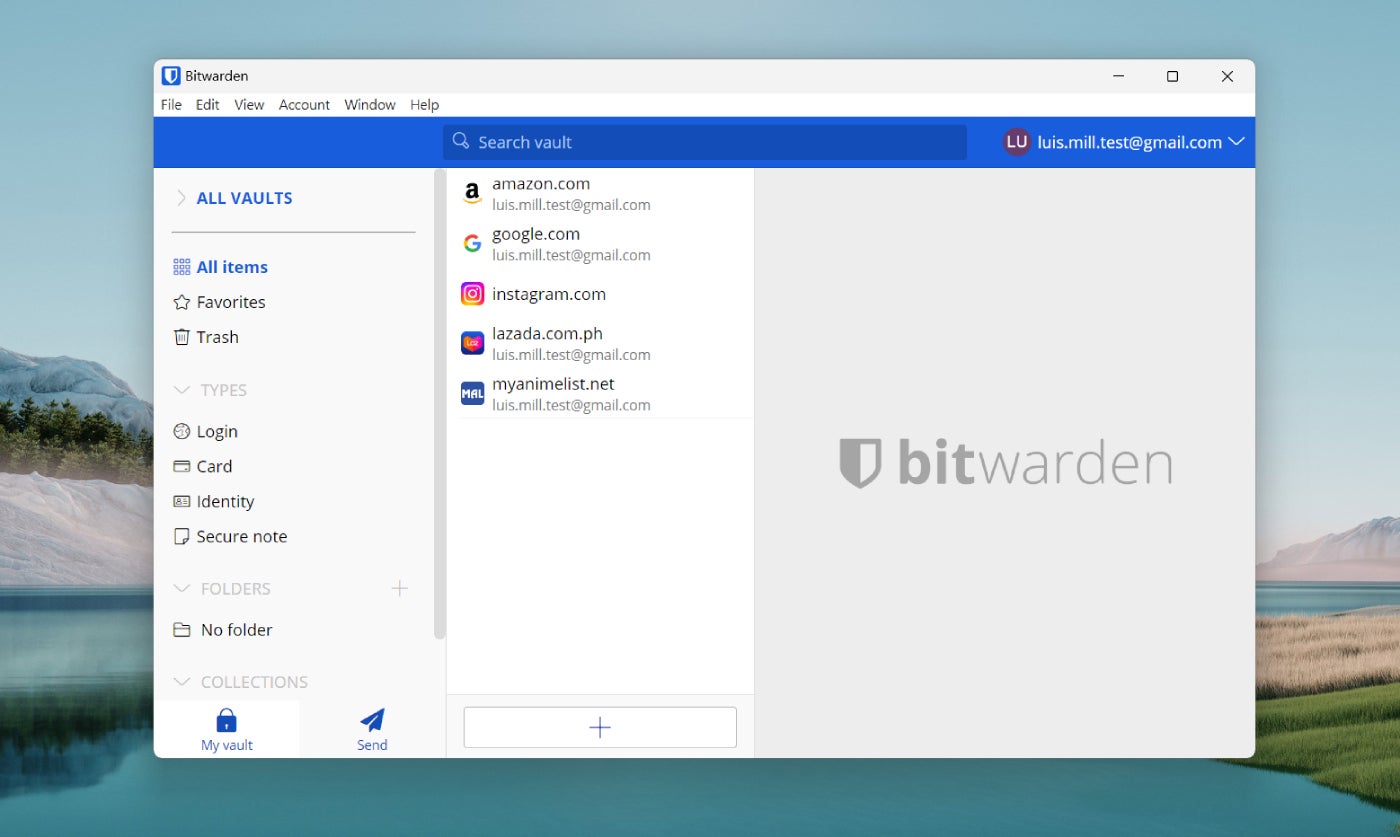
Performance-wise, Bitwarden is solid but not as smooth as Dashlane. During my testing, I initially had trouble with Bitwarden’s autofill functionality, where it required me to click on suggested credentials instead of outright filling them in.
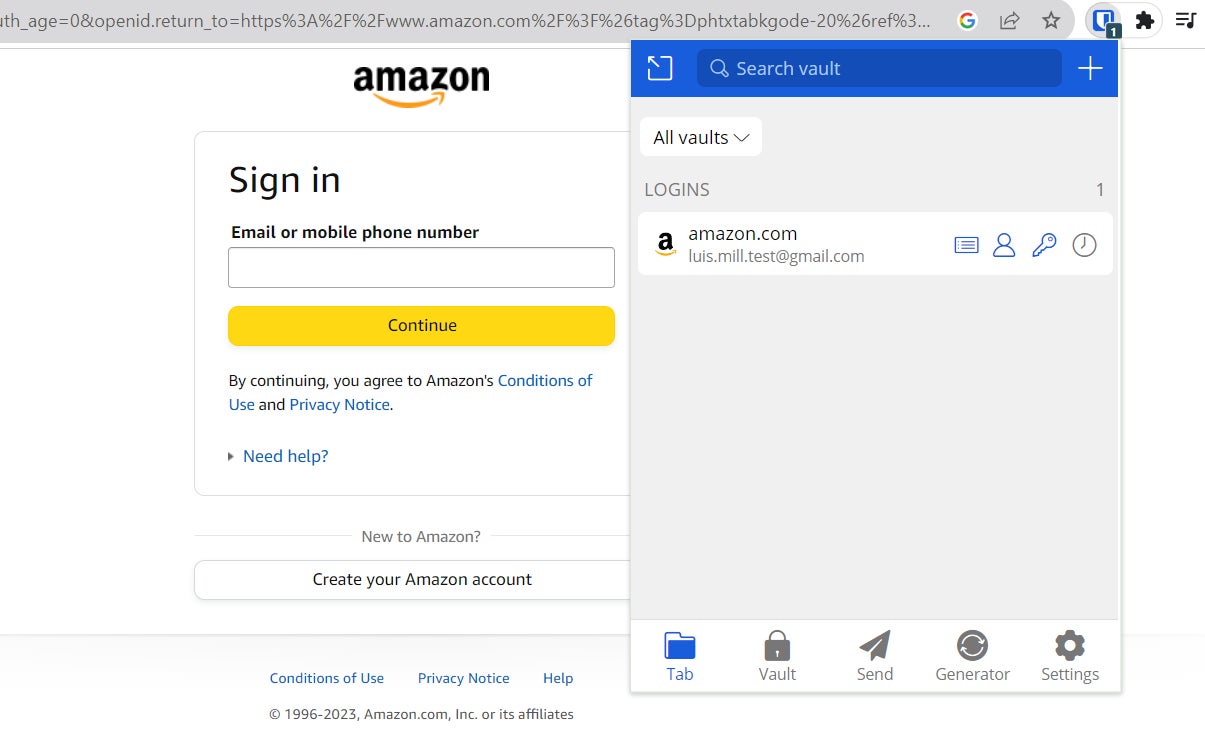
This is because Bitwarden’s auto-fill on page load feature is turned off by default, which is weird since autofill is supposed to be automatic. However, once toggled on, the feature fortunately works as advertised.
Nonetheless, Bitwarden’s user experience is generally positive for the most part. I just feel that Dashlane brings a more polished and user-friendly interface between the two.
Extra features
Both Bitwarden and Dashlane include a handful of additional features on top of their password management service. For Bitwarden, it offers Bitwarden Send — a built-in file and text-sharing feature that allows users to transmit encrypted 1000-character messages or files of up to 500MB.
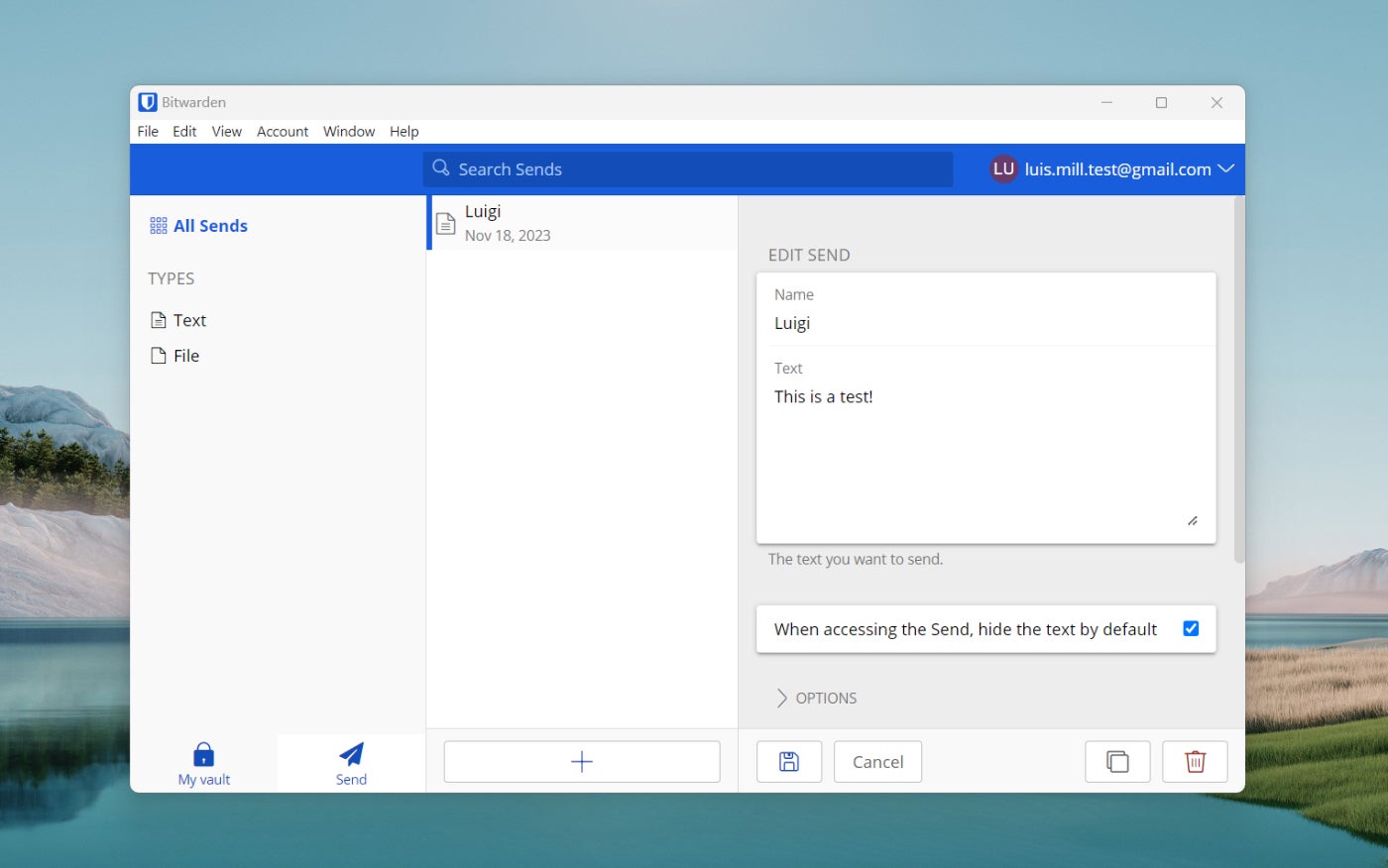
Bitwarden also offers a convenient Emergency Access feature, enabling users to grant emergency access to trusted contacts through email. I personally find this a must-have, as we never know when emergencies can happen and one of our personal passwords is needed by our loved ones in a sticky situation.
SEE: Dashlane vs 1Password: Which Password Manager Should You Use in 2024? (TechRepublic)
On the other hand, Dashlane offers a well-designed Password Health dashboard that displays whether any password in our vault is at-risk. While Bitwarden has its own version of this with Vault Health Reports, I find Dashlane to be better since you can easily view holistic stats on compromised or weak passwords at a glance.
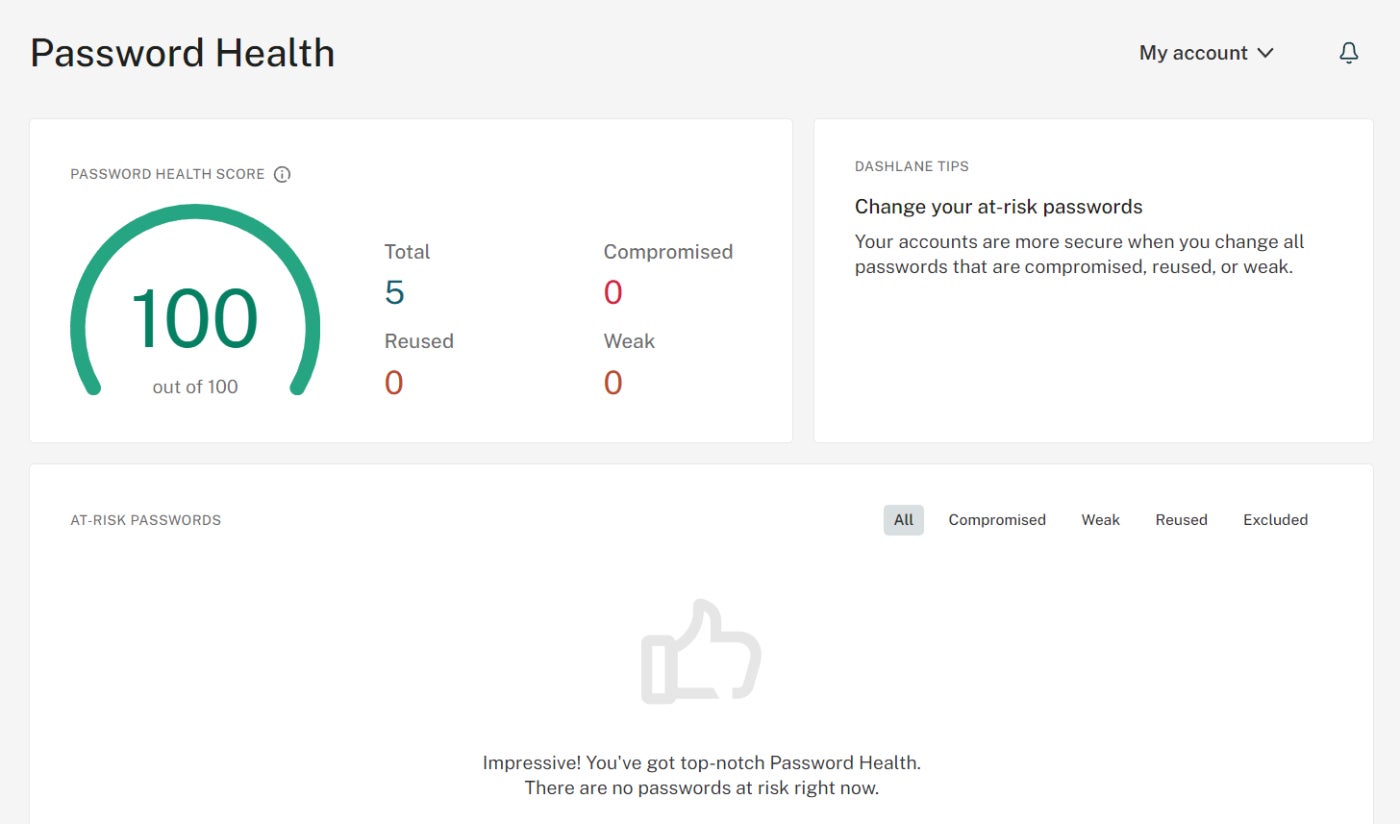
Dashlane is also unique in that it offers a dedicated VPN service with its password manager subscription — something you won’t easily find from other competitors.
In conclusion, both Bitwarden and Dashlane offer a suite of extra features on top of password storage and built-in password generators. You just have to check which extra features matter to you most.
Customer support
For customer support, I give the slight edge to Bitwarden. Taking a quick glance at real user feedback from sites like Reddit, I found that users seem to have a more pleasant experience with Bitwarden’s customer support over Dashlane.
According to one user in the Bitwarden community , they “had the greatest customer experience” with the service with their “fast, genuinely factual… and time friendly response.”
On the other hand, a different user in the Dashlane community shared that he had trouble getting in touch with Dashlane’s support team after encountering issues with the Dashlane icon not appearing on a number of websites.
To be fair, isolated incidents won’t entirely capture both service’s customer support performance. Both Bitwarden and Dashlane offer a decent amount of support channels, like a knowledge base help center, a ticketing system and email support.
If you have any personal stories with either Bitwarden or Dashlane’s customer support, please don’t hesitate to share them with us. This allows us to further refine our recommendations, particularly with something as subjective as customer service.
Platform support
Taking a look at platform support, Bitwarden takes the advantage as it carries more desktop and mobile platforms. While both Bitwarden and Dashlane support Windows, macOS, as well as iOS and Android, Bitwarden takes the lead when it comes to browsers.
Bitwarden has browser extensions for Chrome, Safari, Firefox, Vivaldi, Opera, Brave, Microsoft Edge, Tor Browser and DuckDuckGo for Mac. Meanwhile, Dashlane supports Chrome, Safari, Firefox and Microsoft Edge.
Bitwarden also supports Linux, F-Droid and Command Line Interface — a plus for more technical users.
Of course, if you only use one or two platforms and both password managers support them, this isn’t an issue. But if we’re strictly talking about extensive device and platform support, I give this round to Bitwarden.
Bitwarden pros and cons
- Open-source software.
- Affordable pricing and generous free version.
- Extensive platform support.
- Multiple options for MFA.
- Less polished user experience.
- Premium free trial is for Enterprise plan only.
Dashlane pros and cons
- More refined app experience and user interface.
- Free trial for both consumer and business premium plans.
- Uniquely includes VPN with subscription.
- On the expensive end.
- Free version only stores a max of 25 passwords.
Should your organization use Bitwarden or Dashlane?
During my initial individual reviews of both Bitwarden and Dashlane, I scored them 4.3 and 4.6 out of 5 stars, respectively. After this match-up, I might have to revisit these ratings as Bitwarden offers the slightly better package out of the two.
With its tight security, affordable pricing, extensive MFA options and wide platform support, Bitwarden provides a stronger overall value proposition. However, Dashlane holds its own with its ultra-polished user experience, equally strong security and reliable in-app performance.
Choose Bitwarden if:
- You need an open-source password manager.
- You require flexibility in terms of MFA options.
- You use a variety of browsers and operating systems.
- You want a long-term free password manager with unlimited password storage.
Choose Dashlane if:
- You prioritize design and user experience above all else.
- You want a beginner-friendly interface.
- You prefer closed source software.
- You’re looking for a premium free trial for both a consumer and enterprise password manager.
Review methodology
My comparison of Bitwarden and Dashlane involved an extensive evaluation of each password manager’s features, cost and real-world performance.
Both password managers were scored on everything from their MFA options to their included security features. In particular, we took into account five main pillars with their corresponding weights:
- Pricing (25%).
- Core password management features (35%).
- Ease of use (15%).
- Customer support (15%).
- Expert analysis (10%).
I also supplemented my findings with real-world user feedback from sites like Reddit and other reputable review sites to round out my analysis of both products.
You can view our full Review Methodology for Password Managers .
Subscribe to the Cloud Insider Newsletter
This is your go-to resource for the latest news and tips on the following topics and more, XaaS, AWS, Microsoft Azure, DevOps, virtualization, the hybrid cloud, and cloud security. Delivered Mondays and Wednesdays
- 1Password Review (2024): Features, Pricing & Security
- Cisco Talos: LilacSquid Threat Actor Targets Multiple Sectors Worldwide With PurpleInk Malware
- Are Password Managers Safe to Use? (Benefits, Risks & Best Practices)
- International Malware Takedown Seized 100+ Servers
- Cybersecurity: More Must-Read Coverage

Create a TechRepublic Account
Get the web's best business technology news, tutorials, reviews, trends, and analysis—in your inbox. Let's start with the basics.
* - indicates required fields
Sign in to TechRepublic
Lost your password? Request a new password
Reset Password
Please enter your email adress. You will receive an email message with instructions on how to reset your password.
Check your email for a password reset link. If you didn't receive an email don't forgot to check your spam folder, otherwise contact support .
Welcome. Tell us a little bit about you.
This will help us provide you with customized content.
Want to receive more TechRepublic news?
You're all set.
Thanks for signing up! Keep an eye out for a confirmation email from our team. To ensure any newsletters you subscribed to hit your inbox, make sure to add [email protected] to your contacts list.
- Password Manager
Cloudwards.net may earn a small commission from some purchases made through our site. However, any earnings do not affect how we review services. Learn more about our editorial integrity and research process .
- Great patented security
- Never been hacked
- Dark web monitoring
Dashlane Review
Dashlane continues to be one of the best password managers for its support of basic and advanced features that protect online credentials and keep you safe. Our Dashlane review provides extensive details about its cost and quality.

Password managers offer a way to secure your online world with minimal effort. Dashlane is an excellent choice that helps you use unique passwords without having to remember anything but a single master password. In this Dashlane review, we’ll take a look at everything from features to security and see how it compares to the other options out there.
Key Takeaways:
- Dashlane has a competitively priced Advanced plan that includes multi-device sync, unlimited password storage, dark web monitoring and snappy autofill.
- The service has an intuitive UI that looks and functions the same way on mobile and desktop, with a pleasant, modern design.
- Dashlane has proven security practices and extras like dark web monitoring to keep you in the know about leaked passwords or data breaches.
In summary, Dashlane sustains a patented security architecture that includes zero-knowledge password sharing and dark web monitoring. Those strong features use intuitive interfaces with responsive user support. With the newer Advanced plan, Dashlane provides all of that at a price comparable to its top competitors. Its updated free plan is a great way to try it out.
Dashlane earns its place in the top bracket of our review compilations for a reason (check our best password managers guide to compare). It offers great features and technologies that make it one of the most secure password managers. Read on to get the full details in this Dashlane password manager review.
Dashlane Video Review

Rewrote the review. Desktop app no longer supported; changes in pricing, security and features.
Dashlane Alternatives
- : Android, iOS
Dashlane Review: Strengths & Weaknesses
- Secure notes (1GB storage)
- Intuitive UI
- Supports passkeys
- Unsupported desktop app
- Lacks custom categories
- Mobile-only 2FA generator
- Password changer removed
Dashlane positions itself as a security manager with a robust set of features. As a free service, it includes password captures, autofill and a password generator. Its base paid plan adds multi-device sync, while a premium tier throws in a VPN. Later on, we’ll compare those plans against their prices, but for now, let’s focus on how the features perform.
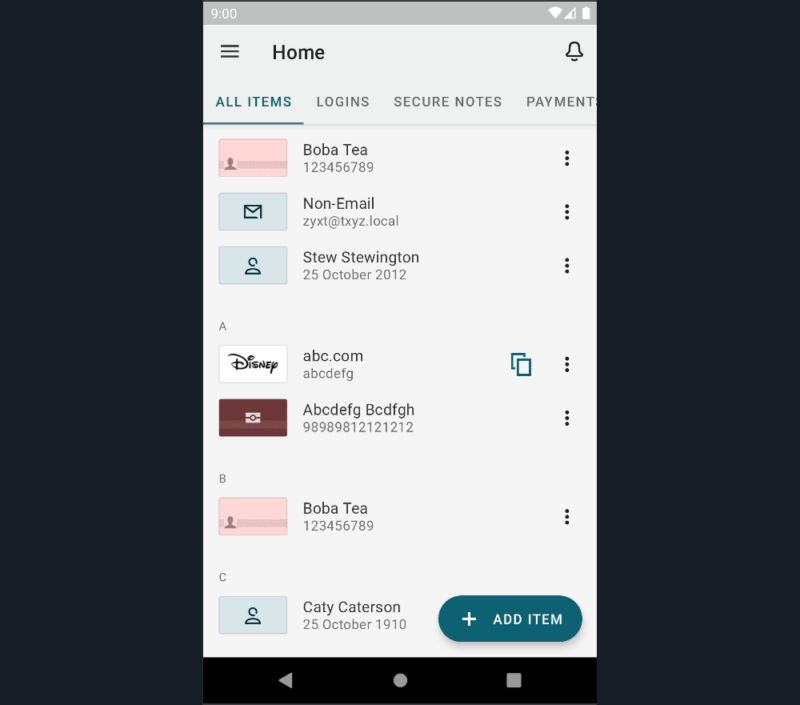
The password capture feature works well and without any hiccups on desktop or mobile. Similarly, autofill runs smoothly while going the extra mile by inputting more than just usernames and passwords. Other key capabilities are also included, so you’re set whether importing passwords or writing secure notes.
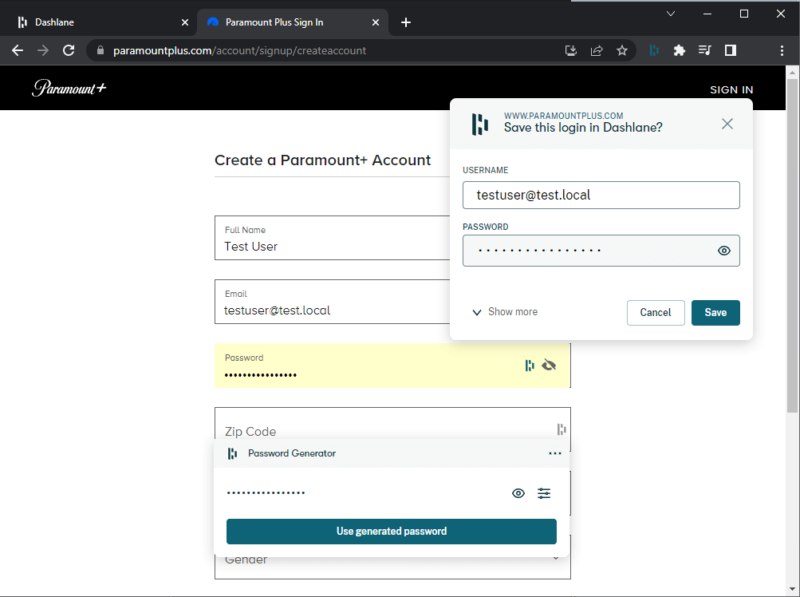
Users can generate new passwords with a quick click of Dashlane’s icon in a form field. Alternatively, that task can be accomplished by editing items within the web or mobile UI. It was also nice to see a “settings” button for the generator available during autofill.
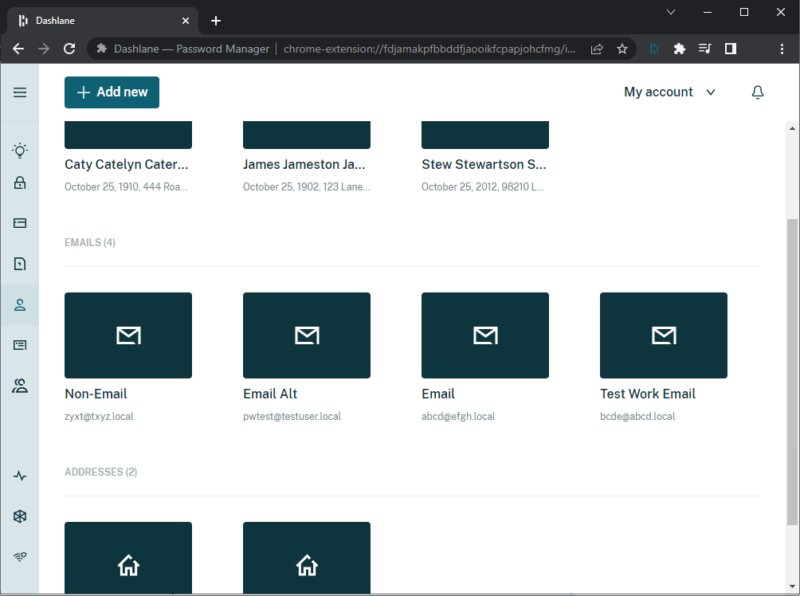
As of 2022, Dashlane also supports passkeys as a new feature. These are a new data type that supports passwordless logins . At the moment, there’s limited compatibility for the majority of sites and apps, but it’s a nice option as companies add the functionality. The current implementation is largely used for two-factor authentication.
Password Health and Dark Web Monitoring
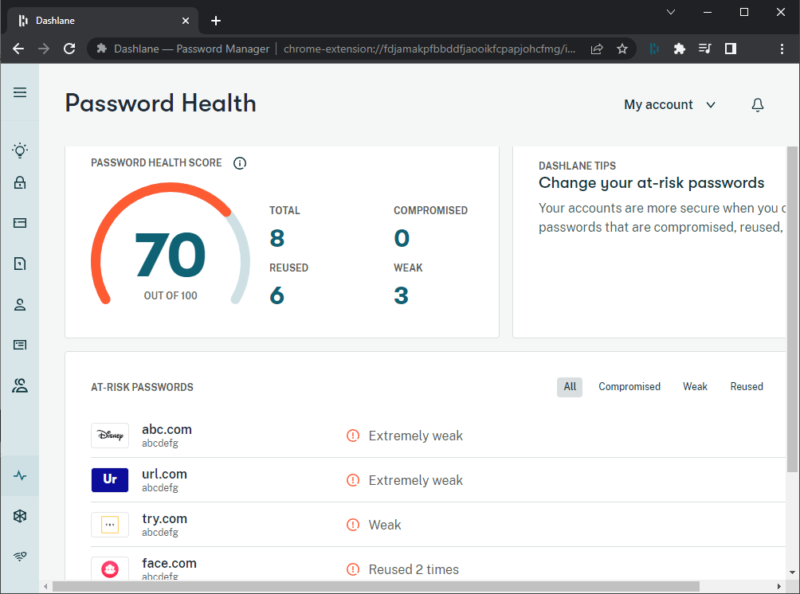
Using a password manager means that you may not know your passwords. That makes it tough to remember what passwords you’ve used, assess password strength and know whether they’ve been breached.
Dashlane’s password health page tracks that for you. It gives you an easy-to-read chart and instructions on how to change risky passwords, whether they’re reused, weak or compromised.
Dashlane’s dark web monitoring will give you a report on any compromised credentials that may be tied to your email addresses. The dashboard lists any history of data breaches for up to five email addresses. Deep web searches are combined with data from the SpyCloud service (a breach monitoring service) to track leaks tied to any emails you’ve agreed to monitor.
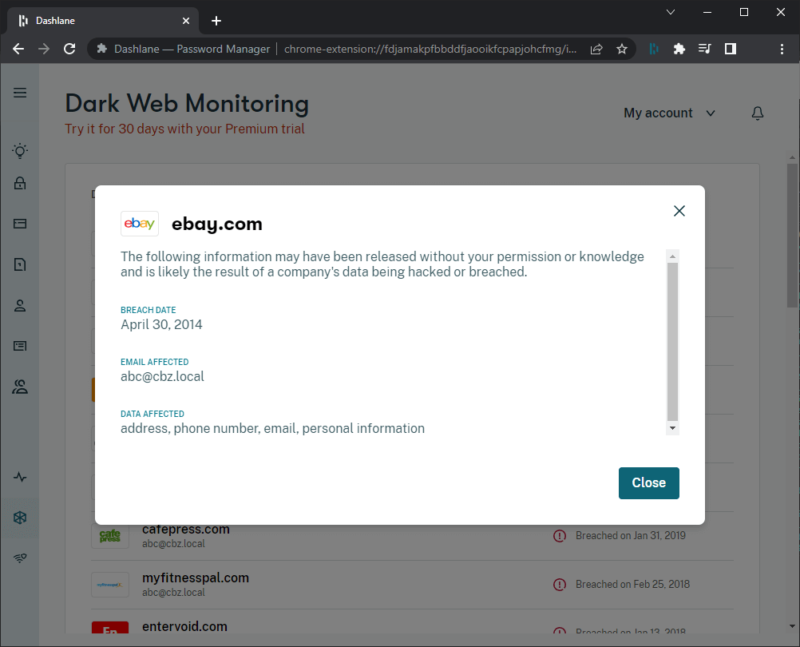
Breaches aren’t all equal, so Dashlane gives extra details for each compromise. One hack might only reveal your email address, but others could include everything from phone numbers to credit cards. You can use Dashlane’s dashboard to identify accounts you may not need or get suggestions for compromised passwords.
The Dashlane VPN
Upgrading to the Dashlane Premium plan will add the option of using its virtual private network through a partnership with Hotspot Shield . That provides unlimited bandwidth and decent speeds for roughly twice the monthly cost. It requires the Hotspot Shield app for your computer or mobile device, but the service is included with Dashlane’s subscription .
Using Dashlane Premium for a VPN is cheaper than subscribing to Hotspot Shield separately, but you’re stuck with Hotspot’s privacy terms and randomized addresses.
As mentioned in our Hotspot Shield review , this VPN collects user data and can share that with third parties. Unless you’re tied to Dashlane, we recommend one of our top VPNs like ExpressVPN (check out our ExpressVPN review ) instead.
Removed Features
Dashlane was previously notable for including an automatic password changer and desktop app, but both features were removed in early 2022.
Dashlane no longer supports a desktop app, and its password changer was deemed unsupportable due to complexity. If that’s important to you, you can read our LastPass review to learn more about the only major password manager that still supports automatic password changing.
It’s a minor quibble, but we still wish Dashlane would provide an “add category” feature. Custom data types could be consolidated into a “custom” tab or added as subcategories of existing types. Dashlane has already committed to doing more than password management, so give us a “create category” button and seal the deal.
Dashlane Features Overview
Our password manager reviews always look for the same things: security, functionality and ease of use. Dashlane provides all three in spades, but its paid plan comes at a price that wasn’t always justifiable. Recently, Dashlane started offering an “Advanced” plan without the VPN, and it makes its offer much easier to recommend.
Many top-performing password managers are approaching a stalemate in competitive pricing. Services are raising prices or lowering them to meet the pack.
Dashlane currently offers its Advanced plan subscription for per month billed annually. That makes the Dashlane cost quite close to similarly equipped services without sacrificing more than a middling (at best) VPN service.
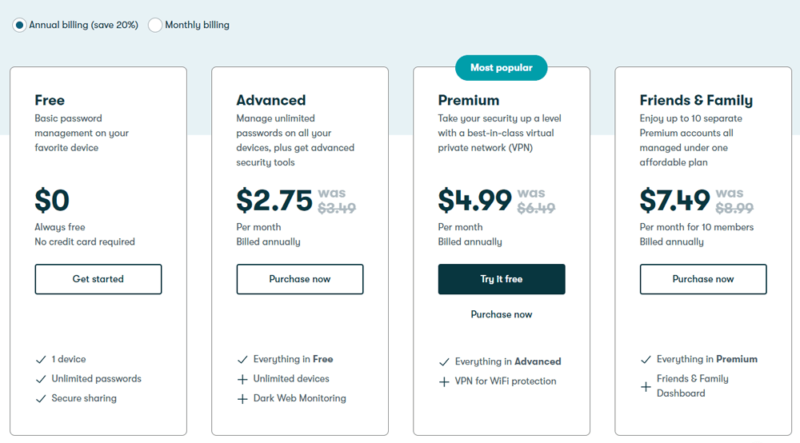
Of course, you can still add that VPN with a subscription to the Premium plan, but that basically doubles the cost of the advanced plan. At that point, you’d be better off paying for a Friends & Family plan. It includes the VPN service and adds vaults for 10 users, but only increases the price to $1.67 per month.
These prices are for annual subscriptions, but monthly billing is available at a 20% markup.
On the free side of things, Dashlane offers an improved experience. Previously, the free plan stored only 50 passwords. Since late 2022, the free plan provides unlimited password storage and sharing between Dashlane users. You’re limited to a single device, but features like two-factor authentication and secure notes are left intact. That could be perfect if you only use your phone.
Dashlane for Business
A Starter plan subscription is billed monthly at $ for 10 seats. The Team package costs per seat per month, billed annually. Business subscriptions are per seat per month, also billed annually. Businesses enjoy premium features with extras like auditing and account management.
For smaller teams, the Friends & Family plan might be better value. It used to allow up to six users, but now it’s $1.67 per month annually and gives 10 seats, just like the Starter package. You still get dark web monitoring, the VPN and a unified dashboard that manages the entire account.
Whichever you choose, anyone with a Dashlane account has unlimited password sharing to other users.
- One device at a time, 25 passwords and login details, Autofill fields, Password Generator, Set up account without a master password
- Billed annually, Unlimited devices, Unlimited passwords & passkeys , Secure sharing, Dark Web Monitoring, VPN for WiFi protection, Real-time phishing alerts, Passwordless login (currently new mobile users only)
- Billed annually, 10 accounts, 1 subscription, Everything in Premium
- Per month for 10 employees Billed annually Coverage for 10 employees Unlimited passwords, passkeys, & payments Unlimited Collection sharing Admin Console Password Health score Basic Activity Logs Admin-assisted account recovery Dark Web Monitoring
- Everything in Standard, plus: Unlimited employees Granular sharing controls Real-time phishing alerts Single sign-on (SSO) integration SCIM provisioning SIEM integration Advanced Activity Logs Security policies VPN for WiFi protection Free Friends & Family plan for each user
- Everything in Business Plus, plus Customized credential management solutions, Robust scalability for large enterprises
Is Dashlane Worth It Compared to Other Password Managers?
Yes, Dashlane is worth it. Compared to other password managers Dashlane offers a lot but charges a reasonable amount.
Password managers can no longer win with a single feature or an appealing price point. As mentioned before, other password managers are approaching a similar price across all services.
1Password is $3.99 per month for a yearly subscription. LastPass is $3 per month for the same term, while Keeper is $2.08 per month. For top-tier password management features, Dashlane may be one of the cheaper options.
As mentioned, Dashlane’s free plan is limited to a single device. Still, that’s a common limitation for other services like Sticky Password or even LastPass. For free multi-device options, use a password management service like Bitwarden or KeePass.
Ease of Use
Password managers shouldn’t be complicated. They should fit into your life without rewiring your daily tasks. Luckily, Dashlane greets you with a unified interface whether you’re using it as a mobile app or browser extension. Getting used to one means you’ll be familiar with the other. The features work the same way on both platforms, with the same intuitive interface.
Every part of Dashlane works without a hiccup. Adding or importing passwords is a breeze, and Dashlane detected new logins at every site we tested. The password generator popped up with a click of Dashlane’s icon, with a prompt that offered to save the new username and password in the app. Everything was very responsive on both Dashlane’s web and mobile apps.
Creating Your Dashlane Account
Getting started is as simple as installing the Dashlane browser extension or mobile app. By default, creating a new account will start you off with a 30-day trial of Dashlane’s Premium plan . You don’t need a credit card to start, so there’s no need to worry about canceling before your trial is over.
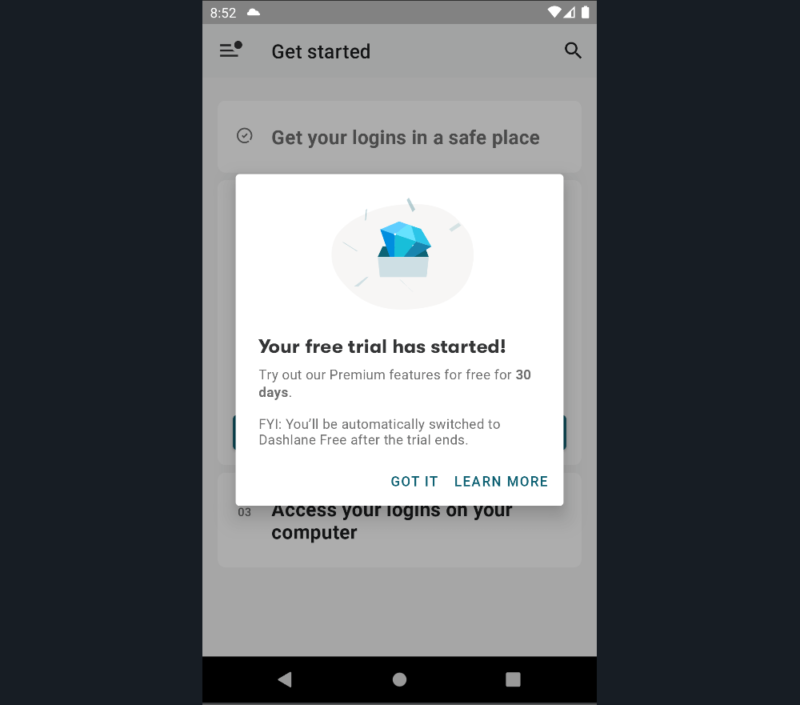
All of Dashlane’s features work on nearly any device. The extension works on most Chromium browsers, Firefox and Safari. Mobile apps are available for Android and iPhone, and they include an authenticator app that can autofill one-time passwords for enrolled sites.
The setup process is similar, whether you’re on a browser or the Dashlane app. Dashlane asks for your email, a master password and whether you want marketing emails. Seconds later, you have full account control without even confirming your email. Then Dashlane suggests your next steps to get started: add logins and enable autofill. In other words, get back to browsing.
Dashlane’s Mobile App
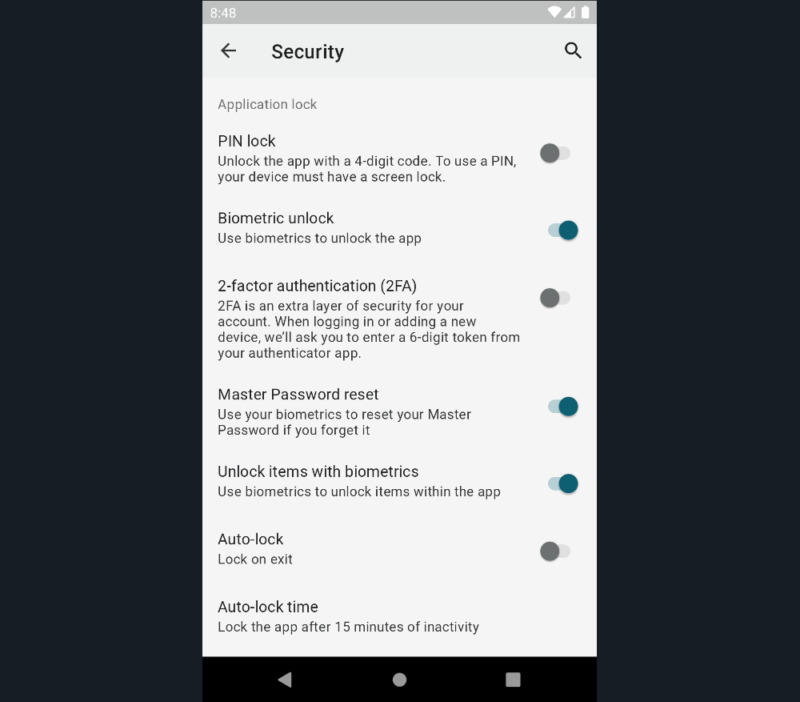
On its mobile password manager, Dashlane gives two additional options during account creation. You can enable biometric security if your device has facial recognition or a fingerprint reader, and that can be used to enable master password recovery. If you forget your master password, you can unlock your secure items and create a new password.
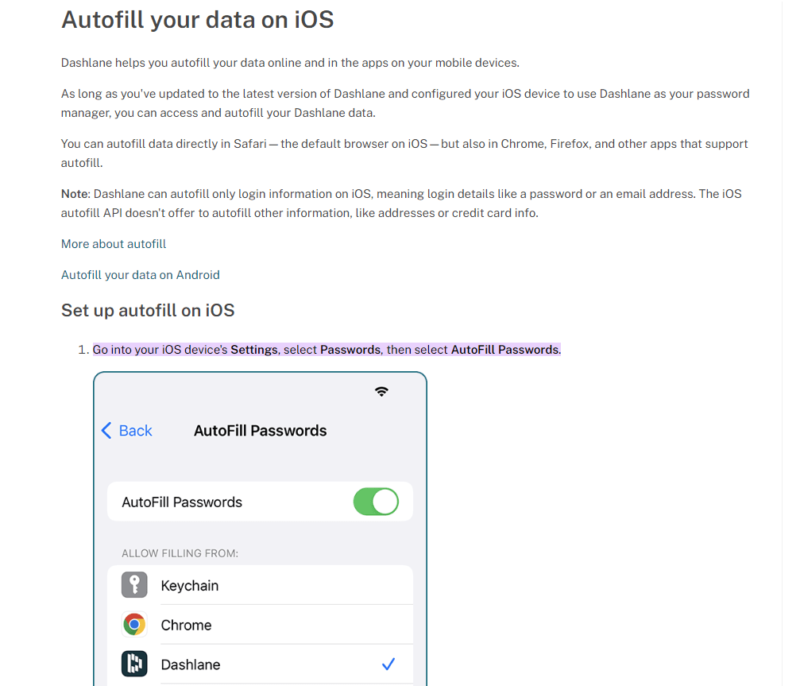
Otherwise, using Dashlane’s mobile app only requires one additional step. Android and iPhone users both have to enable Dashlane’s autofill permissions. Luckily, a modern mobile OS makes this easy. You only have to go into the device settings and search for autofill or input. Then, enable Dashlane as an autofill source.
Extensions and Web Portal
The Dashlane password manager’s options for desktop include the browser extension or web app. There’s no longer the option to use the desktop application; it is unsupported and nonfunctional. That greatly simplifies the service’s setup. The browser extension enables the web app, so you don’t have to download a separate program.
Basic tasks only require the extension. Password generation, new entries or autofill take place with the help of Dashlane icons. An icon is added to any form field that Dashlane can autofill — simply click the icon to load previous data entries like emails or credit card numbers. This makes it much faster when filling out new account details.
Advanced functions and settings are found on the web app. There, you can manage login entries by editing or deleting items. That’s also where you can share passwords or enable two-factor authentication. Additionally, dark web monitoring and the password health dashboard are available in the web app.
Advanced Form Filling
Even a basic password manager should autofill your login details, but a premium password manager will perform advanced form filling. Done right, an app or browser extension can use the manager’s different data types to populate related fields. The Dashlane integrations fulfill this function with smooth consistency.
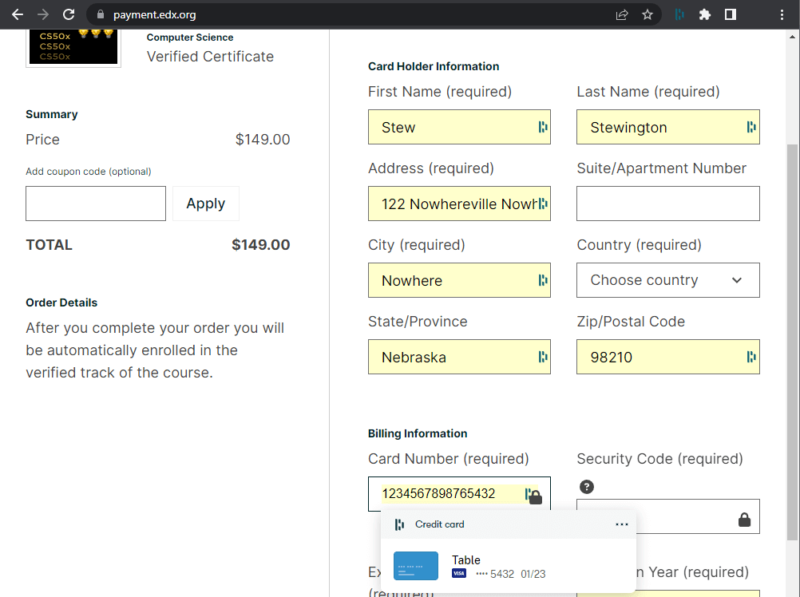
We tested this capability in several different ways. Checking out during an online shopping trip was easy on desktop or mobile. Dashlane icons populate any fields that match its saved data types, and clicking on that icon reveals a dropdown with suggested autofill values.
There was one gotcha while using complex form filling: Selecting one suggested item will insert related data into the rest of the form. A credit card with a matching street address will fill out the billing and shipping addresses automatically.
That can be nice, but it gets frustrating if you’re shipping somewhere new or different. It would be handy to have an option to “only populate this field,” but it’s not a deal-breaker.
Not Quite Easy
Using Dashlane is not all rainbows. One hiccup was related to changing passwords: from the dark web report, the web app’s “change password” button never worked for us. The screen simply went blank whether we were on a Chromium browser or Firefox.
Instead, we had to manually go to each entry to use the password generator.
After speaking with Dashlane support, this feature was enabled by disabling our adblocker. You may have to add exceptions or ignore this button.
Another questionable interface detail was related to new accounts. As with any new password service, we wanted to import passwords. However, the web app doesn’t make this process immediately obvious. First, we had to go to settings to import data. On mobile, there’s a handy dropdown available after tapping the “add item” button.
As we’ve stated, a password manager holds the keys to your online kingdom. Dashlane’s password manager can store logins, credit cards, secure notes and any amount of sensitive data. That’s why it’s important to poke and prod at any secure storage capability. A password manager’s security is paramount.
Luckily, the security Dashlane uses has an excellent track record in protecting accounts. They have not been hacked at the time of this writing, and its zero-knowledge architecture means a hack won’t reveal any of your data. Dashlane security details are also readily available on their website through whitepapers and help articles.
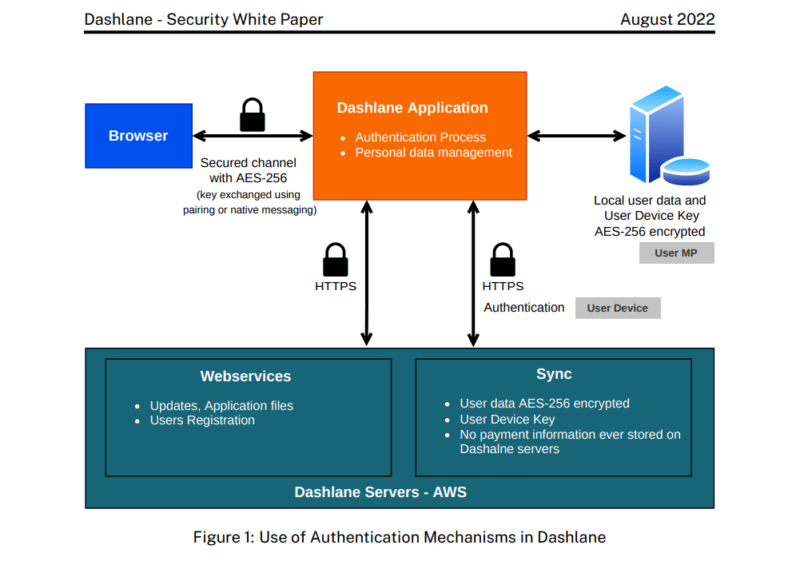
Dashlane’s security features add more reassurances for its trustworthiness as a secure service. Its servers have zero knowledge of your master password and all data is encrypted with the AES 256-bit standard. Even the password hash isn’t stored on Dashlane’s servers — only the fully encrypted user database gets transmitted over the internet.
Going a step further, using Dashlane on a new device takes more than just the master password. A unique user device key is generated for each system accessed by a user. You must authenticate new logins through email, the web app or a pre-authorized mobile device. This one-time code prevents any attempt at a brute-force guess of your master password.
A Password Manager With Evolving Features
Dashlane’s security practices aren’t just on the back end. Two-factor authentication can be used through services like Google Authenticator or with hardware like a Yubikey. For an all-in-one service, Dashlane’s mobile apps can operate as an authenticator that will generate a security code. Then, security keys are generated and automatically filled by Dashlane.
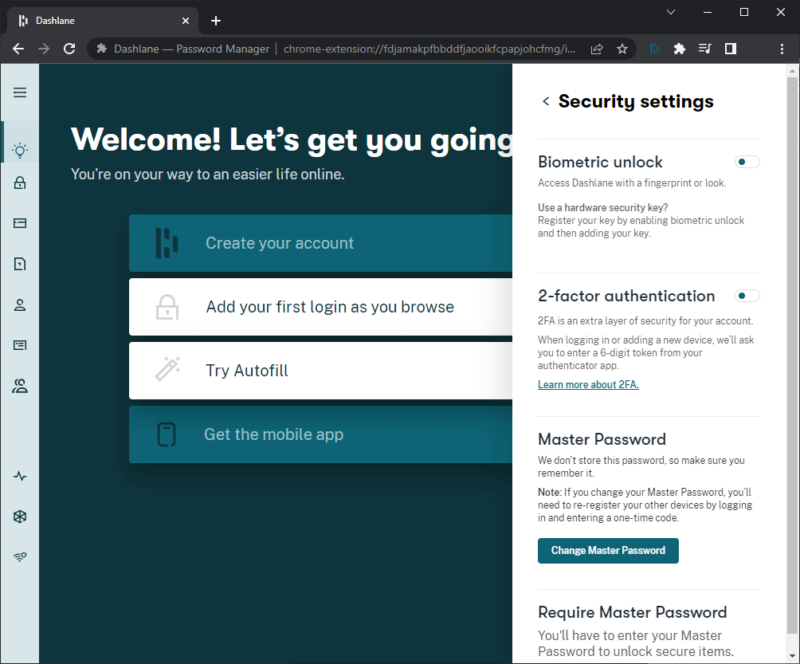
Though still an emerging technology in 2022, Dashlane began support for the tech industry’s passkey system. That’s a system to authenticate between devices and websites without any passwords. The underlying FIDO technology uses a sort of device fingerprint combined with your pins or biometrics to prove it’s you. Not all sites support it yet, but Dashlane is ready.
Analyze Your Passwords
All our security woes can’t be solved by technology alone. We still have to make good decisions and take reasonable precautions to stay safe. For older accounts, we haven’t always made those secure choices. Fortunately, Dashlane has more security features that help nudge us toward stronger online safety.
The Dashlane password manager includes a security dashboard that provides a password health score. Switching over to this feature reveals a color-coded number based on repeated passwords, weak passwords or compromised credentials.
Clicking on an unsafe entry makes it easy to update with Dashlane’s password generator. As a reminder, you still have to update your actual account with that generated password.
Dashlane’s dark web monitoring can be accessed below the password health checker. Input up to five emails and the dark web service will give personalized security alerts for online accounts that use those emails. Compromised passwords will also affect your security dashboard score. This used to be a feature reserved for Premium tier subscribers, but now it’s included in the newer Advanced plan.
How Safe Is Dashlane?
Security researchers found minor security concerns in Dashlane , but some of that is inherent to the technologies used by all password managers.
Sharing a password may necessarily reveal that password to an untrusted party. An application’s security features must rely on the browser or underlying operating system, so you can mitigate risks by working with trusted devices and people.
Customer Support
In this age of the internet, it feels like we should be able to find an answer to every question. Unfortunately, some problems don’t have easy solutions, which is why we still need customer support. Fortunately, Dashlane has a comprehensive help center, a way to submit trouble tickets and a live chat feature for problem resolution.
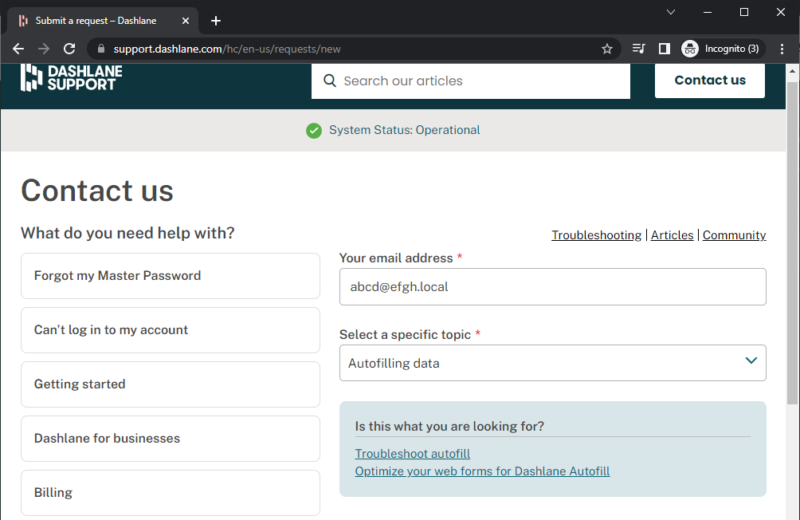
If those don’t work, Dashlane also has active staff on reddit. There’s a whole subreddit for the Dashlane password manager, and the community may have answers to your problem. Support personnel can also be contacted through Facebook or Twitter, but those sites are harder to search for specific issues.
Sometimes, a problem can’t be resolved. If that happens with Dashlane, you still have options. First, you can use the 30-day trial to test for any deal breakers. If you’re still on the fence after that, Family, Advanced or Premium plan users also get a 30-day money back guarantee. Team and Business account payments cannot be refunded.
The Limits of Support
Dashlane’s customer support does require some expectation management. For one, their live chat is only staffed by humans during business hours — a chatbot is used for 24/7 responses. Additionally, only Business-tier users get on-demand phone support, and there’s no readily available email address for support requests.
Another limitation is Dashlane’s account recovery option. It’s only available for Team or Business plan users. In most cases, a forgotten master password means you’re out of luck, and resetting your account clears out your secure database. On mobile, you have another chance if you enable biometrics and password recovery.
It would be nice if Dashlane included an emergency-reset feature; the feature could be tied to a trusted friend or another user’s account.
The Verdict
Dashlane has always been a strong contender as a password manager. It’s secure, easy to use and full of useful features. Its login capture and autofill features work automatically and without noticeable error. The user interfaces are intuitive and attractively modern.
The service’s recent pricing changes are elevating. At the very least, its free tier gives single-device users plenty to work with. The cheaper Advanced plan aligns Dashlane with comparable services, and it also removes the questionable VPN service. There’s a lot to like for a very reasonable price.
In any case, we were happy to see positive changes in Dashlane’s service, and we’re interested in seeing their next steps for standing out in a crowded market. What about you? Are any of Dashlane’s updates enough to make you switch services? Are there any features you’re still hoping to see? Let us know, and thank you for reading.
Our best password managers regularly include 1Password , Bitwarden , Zoho Vault and Keeper . Dashlane readily matches many of these top password managers with dependable features and intuitive interfaces.
Dashlane is not going out of business. The Dashlane desktop app was sunset as of January 10, 2022 . However, full Dashlane features are now available on the browser extensions and mobile apps.
As of 2022, Dashlane has never been hacked. Security researchers have found vulnerabilities in many popular password managers in 2016 and 2022, but Dashlane has since responded that these vulnerabilities have been remediated.
Dashlane was accidentally removed from the Chrome web store in 2020 , but it was reinstated after the mistake was caught by Google. Chrome also prevents extensions from being installed while in incognito mode, so you’ll need to open a normal tab to install new extensions.
Garbage since they decided to get rid of the desktop app. I was a long-time premium subscriber but I decided to move change to 1password which has an amazing desktop app!

- How to Sync Cloud Services in 2024: Cloud Sync and Transfers
- How to Improve Website Loading Times: 6 Easy Tips

Because the Cloudwards.net team is committed to delivering accurate content, we implemented an additional fact-checking step to our editorial process. Each article that we fact check is analyzed for inaccuracies so that the published content is as accurate as possible.
You can tell that an article is fact checked with the Facts checked by symbol, and you can also see which Cloudwards.net team member personally verified the facts within the article. However, providers frequently change aspects of their services, so if you see an inaccuracy in a fact-checked article, please email us at feedback[at]cloudwards[dot]net. We strive to eventually have every article on the site fact checked. Thank you.
- Main menu News
- Crypto News
- Main menu Statistics
- Business and Workplace Statistics
- Main menu Crypto Statistics
- The Biggest Crypto Scams of All Time – 2024 Update
- Crypto Gambling Market Statistics: A Look At The World Of Crypto Casinos
- Cybersecurity Statistics
- Entertainment Statistics
- Main menu Finance and Marketing Statistics
- Digital Lending Statistics – The Automated Solution Changing Finance
- Hardware and Gadgets Statistics
- Science Statistics
- Main menu Software & Web Statistics
- YouTube Shorts Statistics Shaping Online Media Content in 2024
- Sports Statistics
- Main menu Software
- Main menu Spy Apps
- Main menu Best Spy Apps
- Best Phone Spy Apps
- Best Spy Apps for iPhone
- Best Spy Apps for Android
- Main menu Social Media Spy Apps
- Best Facebook Spy Apps
- Best WhatsApp Spy Apps
- Best Instagram Spy Apps
- Best Tinder Spy Apps
- Best Telegram Spy Apps
- Best TikTok Spy Apps
- Best Snapchat Spy Apps
- Best Text Message Spy Apps
- Main menu Catch Cheater
- Best Cheating Spouse Tracker Apps
- Top Boyfriend Spy Apps
- Best Girlfiend Spy Apps
- Signs Your Girlfriend is Cheating
- Main menu Parent Control
- Best Parental Control Apps
- Best Parental Control Apps in the UK
- Best Parental Control Apps in Australia
- Best Parental Control Apps in Germany
- Facebook Parental Controls
- Best Parental Control Apps for iPhone and iPad
- Best Parental Control Apps for Android Devices
- Main menu Track Location
- Best Geofencing Apps
- Best Secret GPS Trackers
- Best Boyfriend Phone Trackers
- Main menu Keyloggers / Recording
- Best Keylogger Apps
- Best Keylogger Software For Windows PC
- The Best Android Keylogger Apps
- The Best iPhone Keylogger Apps
- Best Secret Screen Recorder Apps
- Main menu Spy App Reviews
- mSpy Review
- Spynger Review
- uMobix Review
- GEOfinder Review
- Phonsee Review
- EyeZy Review
- XNSPY Review
- Spyic Review
- Spyera Review
- Main menu Spy Tips and Tricks
- Is It Illegal to Spy on Someone Without Their Knowledge?
- How to Spy on Devices Connected to Your Wi-Fi
- Main menu VPN
- Main menu VPN Guides
- What is a VPN?
- How to Hide IP Address
- How to Get Into Pornhub – Unblock Without Sign-In
- How Do I Hide My IP Address?
- How to Watch DStv online
- How To Watch NRL 2023 Online
- Main menu VPN Reviews
- NordVPN Review
- ExpressVPN Review
- Surfshark VPN Review
- CyberGhost VPN Review
- Ivacy VPN Review
- PureVPN Review
- VyprVPN Review
- Proton VPN Review
- ExpressVPN Vs NordVPN
- Best VPN Service Overall
- Best Cheap VPNs
- The Best VPN for Streaming
- Best Gaming VPN
- Best VPN for Business
- Main menu Best VPN Apps
- Best VPN for Android
- Best VPN for iPhone
- Best Linux VPN
- Best VPN for Firestick
- Fastest VPN Providers
- Main menu Free VPNs
- Best Free VPN Services
- Best Free VPNs According to Reddit
- Free VPNs for Android
- Free VPNs for iPhone
- Free VPNs for Netflix
- Free VPNs for Torrenting
- Free VPNs Chrome Extensions
- Free VPNs for Firestick
- VPNs with Free Trials
- Best VPNs According to Reddit
- Main menu VoIP Services
- What is VoIP? The Definitive Guide to VoIP
- Main menu Wiki
- VoIP vs Landline – Everything You Need to Know
- What is a VoIP Number & How Does it Work?
- What is a Virtual Phone System & How Does It Work?
- How to Get a VoIP Number
- How to Choose a VoIP Provider
- What is ISDN?
- Call Center Technology 101
- VoIP Security Guide
- VoIP Hacking: How to Protect Your VoIP Phone
- VoIP Statistics and Trends
- Best VoIP Services
- Best VoIP Service for Home
- Cheapest VoIP Phone Service Providers
- Free VoIP Phone Number Solutions
- Best VoIP Mobile Apps
- Main menu VoIP for Business
- Best Virtual Phone Service Providers for Business
- Best VoIP for Small Business
- Best VoIP Business Phone Systems
- Best Hosted VoIP Providers
- Main menu By Country
- Best US Virtual Phone Number Provider
- Best Unlimited VoIP UK
- Best VoIP Providers in Canada
- Best VoIP Australia
- The Best VoIP Apps for Iran
- Main menu Password Managers
- Best Password Managers
- Best Password Managers for Business
- Best Password Manager in the UK
- Best Password Managers in India
- The Best Password Manager for iPhone
- The Best Password Manager Reddit Users Recommend
- The Best Password Manager for Windows
- Keeper Password Manager Review
- Main menu Business Software
- Main menu Accounting Software
- Best Accounting Software
- Best Self-Employment Accounting Software
- Best Cloud-Based Accounting Software
- Best Accounting Software to Integrate with WooCommerce
- Best Mac Accounting Software
- The Best Payroll Software for the UK
- Best Accounting Software Australia
- Main menu Project Management
- The Best Resource Management Software – Top 10 Compared for 2024
- The Best Gantt Chart Software Solutions
- The Best Workflow Management Software
- Best Project Management Software
- The Best Free Project Management Software
- Monday.com Review
- Zoho Projects Review — Best Use Cases & Testing in 2024
- ResourceGuru Review with Tests — Is It a Good Software in 2024?
- Main menu Employee Monitoring
- Best Employee Tracking Software
- Best Employee Monitoring Software For Mac
- Best Employee Time Tracking Software
- Best Employee Time Tracking Software for Windows
- Main menu Hosting
- The Best WordPress Hosting Services
- The Fastest WordPress Hosting You Can Get
- Best Cheap WordPress Hosting Services
- The Best Website Hosting Services
- Main menu CRM
- What is CRM?
- Best CRM Software
- CRM for Small Businesses in the UK
- CRM Marketing Automation Software
- Real Estate CRM Software
- CRM for Startups
- Recruitment CRM Software
- Best Free CRM Software
- Best CRM for Non Profits
- Construction CRM Software
- Automotive CRM Software
- Best CRM Insurance Software
- Best CRMs for E-Commerce Reviewed
- Best Free CRMs for Startups
- Main menu Background Check Services
- Best Background Check Software
- Best Tenant Background Check Sites
- Main menu Hiring Software
- The Best HR Software: Top 10 for 2024 Compared
- Best EOR Services for International Hiring
- Best Applicant Tracking Systems
- The Best Applicant Tracking Systems for Small Businesses
- The Best Recruitment Software
- Teamtailor Review
- ClearCompany Review
- Zoho Recruit Review
- Monday.com Recruitment Review
- Main menu Employer of Record
- Deel Review
- Multiplier Review
- Main menu Antivirus
- Main menu Antivirus Reviews
- TotalAV Review
- ESET Review
- Trend Micro Review
- Kaspersky Review
- Surfshark Antivirus Review
- Best Antivirus Software Overall
- Best Antivirus for Windows
- Best Antivirus for Mac
- Best Antivirus for Android
- Best Antivirus for Servers
- Best Lightweight Antivirus – Low-End PCs and Light RAM Usage
- How to Remove Spyware
- Best Spyware Detectors
- Main menu Artificial Intelligence
- A Full Jasper.ai Review
- An In-Depth Copy AI Review
- Best AI Writing Tools
- Best AI Copywriting Tools
- The 10 Best Copy.ai Alternatives Reviewed for 2024
- Main menu Crypto
- Main menu Crypto Learning Hub – Guides, Research, & Info Latest Crypto Tech Explained
- Ultimate Crypto Glossary in Simple Words
- Global Cryptocurrency Regulations – From The Wild West to Outright Bans
- CBDC Meaning – Will It Replace Cash and Should You Worry?
- Security Token Offerings – How Do they Work + Examples
- Main menu Best Crypto to Buy Now
- Best Crypto Presales
- Best Meme Coins
- Best Crypto to Buy Now
- Best Altcoins to Buy
- Next Crypto to Explode
- Best Crypto to Hold Long Term
- Main menu New Cryptos
- New Cryptocurrencies to Invest
- Best Crypto ICOs
- New Upcoming Binance Listings
- New Upcoming Coinbase Listings
- Main menu Crypto Robots
- Best Bitcoin Robots
- Bitcode Method Review
- Bitcoin 360 AI Review
- Qumas AI Review
- BitiCodes Review
- Immediate Connect Review
- Immediate Edge Review
- Immediate Fortune Review
- Main menu Streaming
- Main menu Euro 2024 Schedule & How to Watch Anywhere
- How to Watch Germany vs Scotland in Euro 2024
- How to Watch Serbia vs England in Euro 2024
- Where to Watch Spain vs Italy Euro 2024
- Where to Watch France vs Netherlands Euro 2024
- Main menu How to Watch F1 Live Stream for Free
- How to Watch F1 Spanish Grand Prix 2024
- How to Watch Wimbledon for Free
- How to Watch UFC Anywhere
- How and Where to Watch Boxing Online (Paid and Free Options)
- How to Watch the ICC World Cup in the US & Anywhere
- How to Watch Copa America in the US
- How to Watch USMNT Matches at Copa America
- Main menu Streaming Service Reviews
- Paramount+ Review
- HBO Max Review
- Prime Video Review
- Hulu Review
- Netflix Review
- FuboTV Review
- Sling TV Review
- Main menu Gambling
- Main menu Crypto Gambling
- Best Bitcoin Betting Sites
- Best Bitcoin Gambling Sites
- Best Bitcoin Slot Sites
- Best Ethereum Casino Sites
- Best Solana Casinos
- Main menu Sports Betting
- Best Sportsbooks
- Best Offshore Sportsbooks
- Best AI Sports Betting Prediction Sites
- Best Sports Betting Bots
- Main menu Casino
- Best Offshore Casinos
- Best Anonymous Casinos
- Best Casino Apps for Real Money
- Best Online Blackjack Casinos
- Best Roulette Casinos
- Best Online Slots
- No-KYC Casinos
- VPN Friendly Casinos
- New Casinos
- Safe Online Casinos
- Best No ID Verification Casinos
- Telegram Casinos
- Best $20 Minimum Deposit Casinos
- Top Plinko Gambling Sites
- Inclave Casinos
- Credit Card Casinos
- Best Payout Casinos
- Best Cash App Casinos
- Main menu USA
- Best Anonymous Online Casinos
- Best Casino Apps For Real Money
- Best Blackjack Online Casinos
- Best Live Blackjack Online Casinos
- California Sports Betting
- Florida Online Gambling
- Florida Sports Betting
- Missouri Online Casinos
- North Carolina Sports Betting
- California Online Casinos
- New York Online Casinos
- North Carolina Online Casinos
- Main menu UK
- Betting Sites Not On Gamstop
- Non Gamstop Casinos
- Main menu Canada
- Crypto Casinos
- Main menu Spain
- Tragaperra online con dinero real
- Solana casino
- Casino Bizum
- Apuestas Bitcoin
- Ethereum casino
- Casinos sin licencia en España
- Casinos sin depósito
- Casas de apuestas
- Casinos online
- Telegram Casino
- Main menu Malaysia
- Online Casino Malaysia
- Malaysia Online Gambling Sites
- Malaysia Sports Betting Sites
- Main menu Indonesia
- Indonesia Online Gambling Sites
- Indonesia Sports Betting Sites
- Online Casino Indonesia
- Main menu Singapore
- Singapore Online Gamblling Sites
- Singapore Online Casinos
- Singapore Sports Betting
- Main menu Sweden
- Casino Utan Svensk Licens
- Main menu Philippines
- Online Gambling Sites Philippines
- Philippines Online Casino
- Philippines Sports Betting
- Main menu South Korea
- South Korea Online Gambling Sites
- Online Casino South Korea
- Main menu India
- India Online Gambling Sites
- Online Casino India
- India Sports Betting Sites
- Main menu Australia
- Bitcoin Casinos in Australia
- Main menu Gambling Guides
- Main menu Sports Betting Guides
- How To Gamble Online
- Spread Betting Guide
- How to Arbitrage Bet
- How To Bet on Kentucky Derby
- Parlay Betting Guide
- What Is a Moneyline Bet?
- Main menu Poker Guides
- How To Play Poker
- Poker Strategy
- Poker Cheat Sheet
- Main menu Blackjack Guides
- Blackjack Strategy
- Main menu Roulette Guides
- How To Play Roulette
- Roulette Strategy
- Roulette Odds
- Main menu Baccarat Guides
- How to Play Baccarat
- Baccarat Strategy
- Main menu Craps Guides
- How To Play Craps
- Craps Strategy
- Main menu Gadgets
- Gadget digest
- Main menu Hardware
- Motherboards
- Main menu About
- Editorial Policy
- Why Trust Tech Report
- Meet the Tech Report Team
- Our Writers and Editors
Dashlane Review & Analysis – Is It The Best Password Manager?
Tech Report is one of the oldest hardware, news, and tech review sites on the internet. We write helpful technology guides, unbiased product reviews, and report on the latest tech and crypto news. We maintain editorial independence and consider content quality and factual accuracy to be non-negotiable.
Our comprehensive Dashlane review examines the core features, pricing, and ease of use of one of the most popular password managers . We’ll also compare it with the industry leaders to see if it’s an option you should consider in today’s volatile cyberspace.
Setting strong passwords for different accounts and remembering them all is undoubtedly an uphill task. Between a busy routine and a countless number of online accounts, it’s almost certain that you will forget your passwords sooner rather than later—or you may end up choosing weak passwords that are a privacy nightmare.
This is where having a secure password manager like Dashlane proves to be the game-changer. It not only saves your passwords in a secure vault but also detects your weak passwords and suggests strong ones in their place.
Plus, it offers a myriad of other features, which we’ll discuss in this in-depth Dashlane analysis. We’ll also address the few downsides of the service to ultimately determine whether Dashlane is competent enough to be the answer to all your password management woes.
Dashlane Pros And Cons
Two-factor authentication, zero-knowledge architecture, dark web insights, phishing protection, passwordless logins, password health score, vpn protection, premium plan, friends & family, business plan, enterprise plan, dashlane interface – is it easy to use, dashlane vs other password managers, dashlane reviews – what are people saying, dashlane alternatives, why you can trust our dashlane review, step 1 – add the chrome extension, step 2 – login or create a new account, step 3 – enter your first password, step 4 – enter your password, step 5 – the password has been saved, step 6 – adding payment details, step 7 – saving your ids, dashlane review – the verdict.
Our experts have leveraged their years of experience working with password managers and tested Dashlane in and out. Before we dive into the details, here are the most notable Dashlane pros and cons:
- Passwordless login for extra security
- Dark web monitoring for data breaches
- Admin-level password breach details
- No recorded data breaches
- 30-day free trial on all paid plans
- 30-day money-back guarantee
- More expensive than some of the competitors
- Cancelling a subscription can be difficult

What Is Dashlane?
Dashlane is a password manager that stores and saves the passwords of all your accounts in one place. The company was formed on July 6, 2009, and released its first product in 2012.
Ever since its launch, Dashlane has continued to improve its products and is one of the best password managers today. Besides managing your passwords, it also tests their strength, looks for breaches, and stores details of your payment cards and bank accounts as well. Simply put, Dashlane is a one-stop secure online vault for all your sensitive information.
Dashlane was awarded the “Best of 2015” by Google in 2015 for being one of the best apps on the Play Store. It was also one of the finalists in the 2024 SC Europe Awards for Best Identity and Access Management Solution. These accolades go on to prove how successful Dashlane has been in securing passwords over the years.
At the time of writing, Dashlane caters to 18 million users and over 20,000 businesses in 180+ countries .
Is Dashlane Safe?
Dashlane is one of the most secure password managers. In addition to receiving a security patent from the USPTO (United States Patent and Trademark Office) in 2016, Dashlane has never been hacked , a testament to its state-of-the-art security architecture.
Here’s how your data is ciphered on the Dashlane platform:
- Dashlane uses Argon2, a state-of-the-art key derivation function , to derive a cipher key from your master password.
- The platform then employs AES-256 encryption technology to cipher information such as passwords, personal details, and payment information.
- Dashlane does not store your master password on its servers, making it nearly impossible for malicious third parties to access it.
In addition to the above, Dashlane follows strict two-factor authentication (2FA) protocols for new device logins. Under this, in addition to the password, you will be required to enter a one-time password (OTP) , which you’ll receive in your email.
Next, a unique User Device Key is generated and stored on the provider server to establish a trusted authentication link.
Dashlane follows the ‘ zero-knowledge ’ principle , which means that no one except you has access to your data. All your logins and passwords are encrypted before being stored on Dashlane servers. Whenever you enter your master password, it’s decrypted on your device. This way, no one except you – not even Dashlane employees – will know your master password.
A highlight is that Dashlane runs a bug bounty program . In this program, it invites white-hat hackers to find vulnerabilities on its websites and rewards them if they find security breaches.
This way, Dashlane uses external expert help to point out and then resolve any security risks on its platforms.
Key Dashlane Features – What Can It Do?
Dashlane is undoubtedly one of the biggest names in the industry, but what makes it special? Here’s a more detailed look into some of its best features:
Dak Web Insights is an admin-level dashboard that provides information about your organization’s security health.

If Dashlane finds any sensitive data leaks, it immediately notifies admins and suggests remedial methods.
Once an admin has identified a data leak, they can invite the affected employee to Dashlane. The platform then scans more than 20 billion records for each employee’s email and sends real-time alerts and recommendations to secure their account.
Since dark web monitoring is done at an admin level, employees do not have to worry about their passwords being vulnerable. They can go about their day-to-day tasks – and pay attention to their passwords only when Dashlane detects any anomaly.
More than 90% of all cyber security attacks start with a phishing email.

Dashlane has upgraded its auto-fill feature with phishing protection . The web extension will never fill out login details on a website it considers suspicious. Instead, it will display a real-time warning so that you can double-check that you’re on the correct platform.
However, the feature doesn’t work on the Safari browser—as of now—but Dashlane is working on bringing it to Safari very soon via Apple’s Safari 17 release.
Dashlane is a board member of the FIDO alliance and is working closely with industry leaders toward a password-less future. It was one of the first password managers to offer in-app passkeys for both Android and iOS.
With the help of this passkey, you can log in without your password even on the Dashlane apps. When you set up your account for the first time, you’ll see an option to enable biometrics (Face ID, fingerprints, and so on). Once you enable this option, you won’t have to enter your master password every time you want to log in.
This also makes logging into another device easier:
- For example, if you’re logging in to your Dashlane account on your laptop, you’ll just need to enter your email ID.
- After that, open the app on your phone and click ‘Add a new device’.
- You’ll see the name of your laptop, your location, and the time of login. Click ‘Confirm Request.’
- You will then need to complete an authentication task.
- Click ‘Next’ and you will be logged in on your laptop.
Dashlane calculates your Password health score out of 100 based on all the passwords you’ve stored on the platform. Admin can also check the Password Health score of all the members on the plan.

Dashlane categorizes your passwords into three categories – compromise, reused, or weak.
- A compromised password is one that has been leaked in a security breach – or is similar to one of the leaked passwords.
- Reused passwords are ones that you use for two or more accounts.
- Weak passwords are ones that are vulnerable because of common words, dates, names, and more.
To get a score close to 100, you need to update all your compromised, reused, and weak passwords.
Dashlane also offers a native Virtual Private Network (VPN) for its Premium and Family users at no additional cost. This will help you spoof your IP address and encrypt your online data – so you’ll stay protected from online predators.

The VPN will come in handy, especially when you’re out and about and want to connect to a public Wi-Fi – in an airport, cafe, or hospital, for example.
Public Wi-Fis are hotspots for lurking malware and spyware, making a VPN connection almost indispensable. With Dashlane’s VPN, you can hide and protect your online activities, even on unsecured public networks.
However, for all its might, Dashlane’s VPN is still just an additional offering. While it provides incredible value, it cannot match dedicated VPNs like those offered by Surfshark or Nord .
With one of the best VPN services , you can not only protect your online privacy but also unblock geo-restricted content from anywhere in the world, save money on flight and hotel bookings, and so much more.
Dashlane Pricing – Is It Affordable?
In addition to a fantastic free forever plan , Dashlane offers two broad pricing tiers – Personal and Professional. Let’s discuss each of these in detail.
The free Dashlane account allows you to store up to 25 passwords on a single device . You also get access to features such as a strong password generator, autofill, password health score, phishing alerts, and a dark web monitor for your master password.
A slight negative, though, is the limitation on the number of passwords. You can save unlimited passwords on NordPass’s free plan. However, with Dashlane, you’re limited to just 25 passwords – which, in all fairness, should be more than enough to cover the majority of your online accounts, if not all of them.
Personal Plans
Dashlane offers two personal plans – one for individuals and the other for groups.
The Premium plan, starting at $4.99/month , is meant for individuals and allows you to store an unlimited number of passwords on unlimited devices.
You also get a VPN to protect your online privacy, dark web monitoring for all your passwords , and the ability to use passwordless logins.
Dashlane is admittedly more expensive than its competitors. For instance, RoboForm’s Premium plan starts at just $2.49 per month, and NordPass is a mere $1.99 per month.
However, NordPaas does not offer dark web monitoring or phishing protection, which are indispensable in today’s world of rising cybercrime. For instance, LastPass, once a top password manager, was hit by a major phishing scam that attacked users’ master passwords.
It’s also worth noting that Dashlane is one of the most secure password managers out there, thanks to a US-patented security architecture . All in all, although it costs a pretty penny, it’s every bit worth the splurge, given the protection it provides.
The Dashlane Friends & Family plan offers the exact same set of features as the Personal plan above. The only difference is that this plan accommodates up to 10 users , as opposed to a single user in the Personal plan, and costs $7.49 per month.
Also, note that the VPN in this plan is only available to the admin —no other member has access to it.
Are you on a tight budget? You can consider opting for NordPass, which is priced at just $3.69 per month for six members—this works out to approximately $0.615 per member .
Dashlane Professional Plans
The Professional plans are meant for businesses that are looking to improve their organization’s password habits.
Dashlane’s Business plan starts at $8 per seat per month and allows unlimited members . This plan offers a host of additional features tailored to businesses.
This includes a Password Health Score dashboard, Dark Web Insights, and unlimited group login sharing. You also get a customer success manager – dedicated one-on-one assistance and on-demand phone support.
While Dashlane’s Business plan is admittedly more feature-packed than the rest, it’s not the cheapest going around, especially for small organizations.
For instance, if you have a team of 10 members or less, you’d be more tempted to buy the 1Password Team Starter Pack, which costs $19.95 for 10 members . Similarly, NordPass’ Enterprise plan, which is its highest-end plan, costs $5.99 per user per month.
However, large organizations usually need robust security mechanisms to protect sensitive information. Remember, privacy is priceless when it comes to protecting company data that can be worth millions of dollars. This is where Dashlane steers ahead of the competition.
1Password’s Business plan, for instance, also costs $7.99 per user per month. However, there you won’t get the extent of security-focused features that Dashlane offers.
This is a custom-priced plan for super large-scale businesses with tons of employees. It comes with everything in the Business plan plus three additional features:
- Dedicated customer success manager
- Onboarding customer support specialist
- Onboarding technical engineer
All you need to do is add the Chrome extension (if you’re on a desktop) and follow the prompts. The desktop dashboard, as you can see in the image below, is uncluttered and all the options are clearly laid out in the left-hand side panel.

Once you’ve set up your account, everything works almost intuitively. For example, every time you visit a website and enter a password, Dashlane will ask your permission to save it.
Now, if you visit the website again, Dashlane will automatically fill in the details for you . All in all, the Dashlane experience is pretty seamless, with minimum human intervention needed.
As part of my thorough hands-on testing, I also installed the Dashlane app on my mobile phone. I’m happy to report that the Dashlane mobile app works just like the website—it’s well-curated, has minimum clutter, and is very easy to use overall.

A tiny ‘+’ sign at the top-right allows you to add a new password, which is as easy as it gets—just enter the details, including the website whose password you’re saving, and that’s about it.
You’ll also see a small bar at the bottom of your screen, where you can access other tools, such as the random password generator and password health checker.
Overall, the experience on both platforms is very polished. Often, password managers focus more on their websites and consider the mobile app just an ancillary. However, that isn’t the case with Dashlane.
There are just one too many password managers available on the market right now, all of which claim to be better than those around it. However, that’s clearly not the case.
Luckily for you, we’ve prepared a bite-sized yet thorough table comparing some of the top password managers in the industry so that you can make a well-informed decision.
As you can see, password managers come in all shapes and sizes. Although every good platform offers rock-solid essentials, such as password storage and autofill, there are quite a handful of differences between them.
For instance, if you handle sensitive data regularly, you’d probably want a dark web monitor that notifies you if your passwords have been compromised on the dark web . This is something you get with Dashlane but not with platforms like Avira or Kaspersky.
On the flip side, you may be looking for an affordable password manager . In that case, options like NordPass and Kaspersky will make more sense – both of them cost less than $2 per month.
If you’re looking for more password managers as well as a guide that thoroughly reviews and compares all the top options, check out TechReport’s compilation of the 10 best password managers to secure your accounts in 2024 .
Dashlane has received many positive reviews on independent customer review websites. It boasts an impressive 4.5 stars on Trustpilot from 5,800+ reviews , 90% of which are 4 stars or above.

The good news keeps coming, as Dashlane has earned 4.5 stars on G2 as well . People have appreciated Dashlane’s business-centric features, which make it easy and intuitive for both employees and contractors to provide and revoke access to accounts when needed.
However, a few reviews have highlighted that it’s difficult to cancel a Dashlane subscription —you can’t do it from the dashboard. Unfortunately, we also found this to be true in our own testing.
While not as straightforward as we would’ve liked, canceling a Dashlane subscription is still pretty simple. All you have to do is contact the Dashlane customer support, and they’ll cancel your subscription without any delay.
Plus, as I’ve already mentioned, Dashlane’s support team is super responsive . So, even if it’s the last day of your subscription and you’re hurried into canceling it, rest assured that it will be done.
Dashlane is one of the best password managers available. It offers a full suite of advanced features (especially for organizations) that are difficult to find elsewhere.
However, it might not be the right fit for every single user. So, keeping the diverse needs of various TechReport readers in mind, here I’ve outlined some fantastic Dashlane alternatives, including individual reviews as well as full-fledged buying guides with as many as 10 password managers.
- Keeper Password Manager Review 2024
- 1Password Review – Is It Reliable and Secure?
- The Best Password Managers for Business in 2024
- 10 Best Password Managers to Secure Your Accounts in 2024
Our team of experts at TechReport has more than a decade of experience testing password managers, meaning we know exactly what to look for when reviewing one.
We used Dashlane first-hand , installed it on all compatible devices, and tested every feature to see if it worked as advertised. Then, we contacted their customer support to check if they’re adept at solving genuine queries, including complex ones.
During our testing, we compared Dashlane to other high-ranking password managers such as 1Password and NordPass. This is because we wanted to give you a clear picture of where Dashlane stands amidst the competition in terms of features, pricing, and usability.
Lastly, we combed through hundreds of customer reviews on independent review sites to find out the pain points (if any) of long-term customers.
Then, we checked the platform hands-on to determine whether the purported negatives were indeed valid. This means that we’ve compiled the most comprehensive and unbiased Dashlane review you can find.
How To Use Dashlane – A Step-By-Step Guide
Saving a password on Dashlane is simple. I’ve outlined an in-depth step-by-step guide to show you how:
First things first, you need to add the Dashlane extension to your Chrome browser. Visit the Chrome web store , search for Dashlane, and click ‘Add to Chrome’.

Once the extension is installed, you’ll be automatically redirected to the Dashlane website. Enter your email ID and click ‘Next.’ Then, choose a strong master password and click ‘Create my account.’

You’ll see the Dashlane dashboard (as shown above). To add your first password, click the ‘Add your first login as you browse’ option. Then, select the app for which you want to add the password (say LinkedIn).
On the next screen, you’ll be redirected to the respective website. Enter your login ID and password. A small box will appear in the top-right corner, asking you to save the password to Dashlane. Click ‘Save.’
The Dashlane dashboard shows all your saved passwords. You can view the details of each password and copy and delete it at any time.
You can also add your credit card, debit card, or bank account details on Dashlane:
- Click the ‘Payments’ option from the left-hand side panel, and choose which detail you want to add (for example, debit card).
- A box will appear where you must enter details such as the cardholder’s name, card number, CVV, and date of expiry.
- Once you’ve done this, click ‘Save’. Now, every time you want to make a payment, you won’t have to enter your card details from scratch—Dashlane will autofill them for you, saving you time and enhancing your online shopping experience.
Just like your payment details, you can save various IDs on Dashlane for quick access. This includes:
- Social security number
- Driver’s license
Here’s how you can add an ID of yours on Dashlane:
- From the left-hand side panel, select ‘IDs’, and choose an option from the above list (let’s say driver’s license).
- A new window will open, where you can add your name, ID number, issue date, and expiration date.
Using other Dashlane features, such as the dark web scanner or password health checker, is also easy. In case you get stuck, just contact customer support, where helpful agents will resolve your query within minutes.
Dashlane is a seasoned password manager with more than 15 years of experience and 18 million customers worldwide. It boasts a US-patented USPTO security architecture, ensuring that your passwords do not fall into the wrong hands.
As part of its rock-solid security approach, Dashlane ensures that your master password is always encrypted and decrypted locally on your device – meaning it never reaches the internet, so perpetrators cannot intercept and hack it.
Apart from this, you get advanced features like dark web monitoring, phishing protection, and detailed dark web insights at the admin level. These are essential for businesses that handle sensitive data. A decent built-in VPN rounds off an excellent security suite and makes sure that not only your passwords but also the details of your online activities stay protected from prying eyes.
While the features all worked as advertised during our testing, I was particularly impressed with Dashlane’s customer support. It’s one of the best in the industry and offers quick and accurate responses to all queries.
Although Dashlane is admittedly not the cheapest, it makes up for that by offering a top-notch free plan with enough features to keep most individual users happy.
Furthermore, all paid plans are very reasonably priced, especially considering Dashlane’s focus on security and delivering high-quality password management services to businesses. Get started with Dashlane’s Basic plan for just $4.99 per month – and you’ll also get a 30-day free trial to try it out risk-free.
Can Dashlane be trusted?
Yes, Dashlane is a secure and trusted online password manager with more than 15 years of experience. It has received a security patent from the USPTO and uses a state-of-the-art key derivation function. You get bank-grade security with AES-256 encryption technology, plus the platform operates on a zero-knowledge architecture, which means no one other than you knows your master password.
What are the disadvantages of Dashlane?
A common complaint about Dashlane is that it’s a bit on the expensive side, especially when compared to budget-friendly password managers that cost less than $2 per month. However, they do not come with advanced features like dark web protection and real-time phishing alerts, which you get with Dashlane.
Is Dashlane still free?
Dashlane offers a free plan that allows you to save up to 25 passwords on a single device. It also comes with features such as autofill, a password generator, phishing alerts, password health score, and dark web monitoring. Furthermore, all paid Dashlane plans (the cheapest one is $4.99/month) come with a 30-day free trial so you can try the tool out without risking a single penny.
Is Dashlane worth the price?
Dashane provides exceptional value for your money thanks to a jam-packed suite of both basic and advanced password management features. For just $4.99/month, you can save unlimited passwords on any number of devices and benefit from dark web monitoring, real-time phishing alerts, and passwordless login for your mobile devices.
- Dashlane Bounty Bug Program (HackerOne)
- Why Use 2FA? (Boston University)
- 91% of all cyber attacks begin with a phishing email to an unexpected victim (Deloitte)
- Exploring the Dark Web and Its Dangers (EC-Council University)
- What You Should Know about Dashlane’s Patented Security Architecture (Dashlane)
- Get started with the Dashlane Safari extension (Dashlane)
Our Editorial Process
Krishi Chowdhary Journalist
Krishi is an eager Tech Journalist and content writer for both B2B and B2C, with a focus on making the process of purchasing software easier for businesses and enhancing their online presence and SEO.
Krishi has a special skill set in writing about technology news, creating educational content on customer relationship management (CRM) software, and recommending project management tools that can help small businesses increase their revenue.
Alongside his writing and blogging work, Krishi's other hobbies include studying the financial markets and cricket.
More Password Manager Guides Guides View all

The Ultimate Guide to the Best Password Manager in 2024
We Tested the Best Business Password Managers in 2024

The Best Password Manager in the UK: Top 10 Compared for 2024
The Best Password Manager for Mac Devices: Top 9 Compared
Latest News

CFTC Secures Administrative Stay of Court Order Against Kalshi, Forcing Platform to Halt Election Bets
China’s AI Models Lag Behind US But May Overtake in Adoption, Says Former Google China Head
Kai-Fu Lee, the former president of Google China, predicts that AI-powered applications will gain widespread adoption in China more quickly than in the US. While Chinese AI models currently lag...

OpenAI o1: a New AI Model That “Thinks Like a Human” Before Responding
OpenAI unveiled a new AI model, called OpenAI o1 (codenamed Strawberry), which “thinks like a human” before answering a question. It has been designed to answer more complex questions from...

The UK Declares Its Data Centers as Critical National Infrastructure

Vodafone-Three Merger: CMA Raises Concerns That Could Get the Deal Blocked

Dogecoin (DOGE) Mitigates Key Resistance at 0.1028 Amid Bearish Trend – Can the Bulls Break Above $0.1162?

Crypto Expert Explicates Confusion Surrounding XRP In Swift’s Plan Of Integrating Regulated Assets
REGULATION & HIGH RISK INVESTMENT WARNING: Trading Forex, CFDs and Cryptocurrencies is highly speculative, carries a level of risk and may not be suitable for all investors. You may lose some or all of your invested capital, therefore you should not speculate with capital that you cannot afford to lose. The content on this site should not be considered investment advice. Investing is speculative. When investing your capital is at risk. Please note that we do receive advertising fees for directing users to open an account with the brokers/advertisers and/or for driving traffic to the advertiser website.
Crypto promotions on this site do not comply with the UK Financial Promotions Regime and is not intended for UK consumers.
© Copyright 2024 The Tech Report Inc. All Rights Reserved.
- Privacy Policy
- About Us & Our Team
- Why Trust Us

Dashlane vs 1Password (2024): Features & Pricing Compared
Alison Barretta
eSecurity Planet content and product recommendations are editorially independent. We may make money when you click on links to our partners. Learn More .
Dashlane and 1Password are password managers that businesses trust for their robust security. Dashlane stands out for its integrated VPN, 24/7 dark web monitoring, and user-friendly interface. 1Password has a great mix of basic and high-level features, with more flexibility when it comes to billing, compatibility, and sharing. If you’re undecided between these two products, I’ve compared their features, pricing, and support options to help you find the better fit.
- Dashlane : Better for overall ease of use and perks like dark web monitoring and VPN support ($8 per user per month for Business license; contact for Enterprise pricing)
- 1Password : Better for a well-rounded feature set, flexible pricing, and compatibility ($19.95 flat fee for up to 10 Teams users per month; $7.99 per user per month for Business license; contact for Enterprise pricing)
Table of Contents
Featured Partners: Password Management Software

Dashlane vs 1Password at a Glance
Dashlane and 1Password both boast a clean breach history, and their business plans cost roughly the same — but with 1Password, you’ll get slightly more for your money with secure guest accounts and broader compatibility. Another advantage of 1Password is its lower-cost Teams plan with the option to choose between annual or monthly payments. You can see my evaluation of both products below or keep reading for an overview of each product.
Dashlane Overview
Better for Dark Web Monitoring & Overall Usability
Overall Rating: 3.6/5
- Core features: 4/5
- Security: 4.1/5
- Ease of use & implementation: 3.7/5
- Advanced features: 3.1/5
- Customer support: 3.8/5
- Pricing: 2.1/5
Dashlane is a password manager that’s trusted by thousands of companies around the world for its superb security features — namely 24/7 dark web monitoring with phishing alerts, built-in VPN, and secure storage for documents like passports and IDs. It has a clean breach history, and its iOS and Android source code is available to the public. Dashlane’s uncluttered interface is easy to navigate on mobile and web, making it a good pick for first-time users.
Pros & Cons
Key features.
- Encryption: Protected by zero-trust architecture, AES-256 encryption, and PBKDF2 standard for master passwords.
- VPN: Provided by Hotspot Shield VPN, access region-locked content and protect your data when browsing on unsecured WiFi networks.
- Dark web monitoring: Includes 24/7 surveillance, instant breach notifications, and smart suggestions for changing compromised information.
- Secure storage: Scan and attach IDs, passports, and other sensitive documents in a secure vault; 1GB of encrypted storage is included.
- Single sign-on (SSO): Dashlane’s Confidential SSO integrates with popular SAML 2.0 identity providers, (Okta, Azure Google Workspace), or you can use a self-hosted SSO.
Read our comprehensive Dashlane review , which covers everything you need to know about pricing, features, ease of use, and support availability.
1Password Overview
Better for Features, Security & User Support
Overall Rating: 4.3/5
- Core features: 4.4/5
- Security: 4.8/5
- Ease of use & implementation: 4.9/5
- Advanced features: 3.7/5
- Customer support: 4/5
- Pricing: 3.4/5
1Password is considered the best password manager for its robust security tools and well-rounded feature set. Notably, it offers perks like a travel mode that hides your secure vaults while in transit and includes guest accounts so businesses can safely share access with clients and contractors. There’s a slight learning curve but 1Password is generally easy to use, and its 24/7 user support has a favorable reputation among customers.
- Guest accounts: Grants temporary, limited access to specific vaults and apps to freelancers, clients, and other outside collaborators.
- Travel mode: Hide portions of your vault when traveling to protect sensitive data in the event your device is lost or impounded.
- Command line interface: In the CLI, admins can manage vaults, automate tasks, and secure private keys and tokens.
- Security key: Back up and access data with a physical security key such as YubiKey or Titan.
- Custom reports: Included with 1Password Business; generate reports about breaches for individual users, vault security issues, and account activity.
Our in-depth 1Password review breaks down everything from the pros and cons to pricing structures, support options, and usability.
Better for Pricing: 1Password
Winner: For small to medium businesses, 1Password is the winner for offering flexible billing and an affordable starter plan. For large businesses and enterprises, it’s a draw.
Dashlane offers a business plan for $8 per user per month, a custom-priced enterprise plan with free onboarding, and a 14-day free trial. However, Dashlane no longer offers a dedicated Teams plan for business. (There is a 10-user Family plan, but it’s intended for personal use.) A stripped-down free-for-life version of Dashlane stores up to 25 passwords, offers passwordless login, and comes with 1GB of encrypted storage.
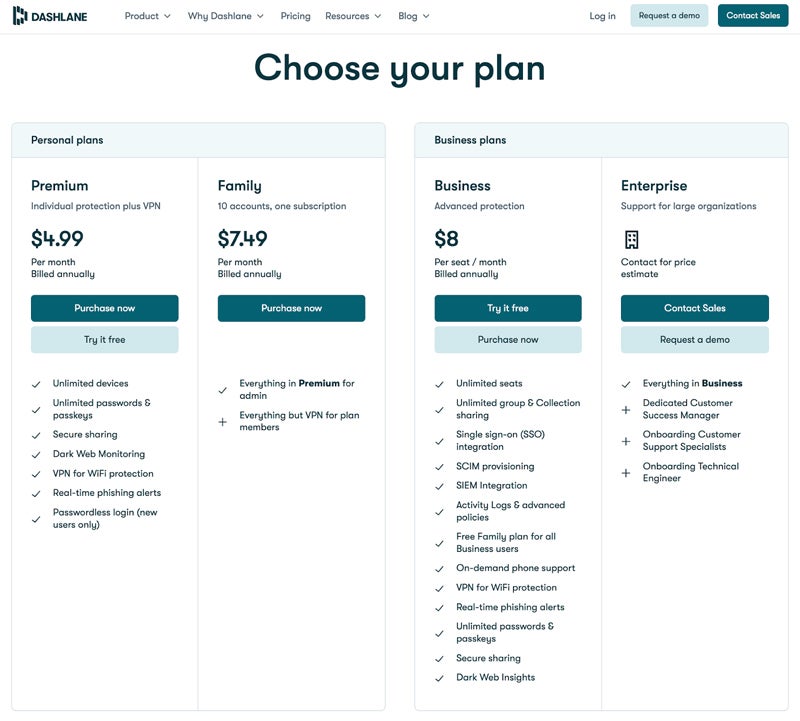
1Password Business costs the same as Dashlane’s equivalent and also comes with a 14-day trial. There’s no free-for-life version of 1Password, but there is the 1Password Teams Starter plan, which is valid for up to 10 users and costs $19.95 per month (around $2 per user). Customers also have the option to choose between annual or monthly pricing. Small to medium businesses may prefer 1Password for its flexible billing and affordable team plan.
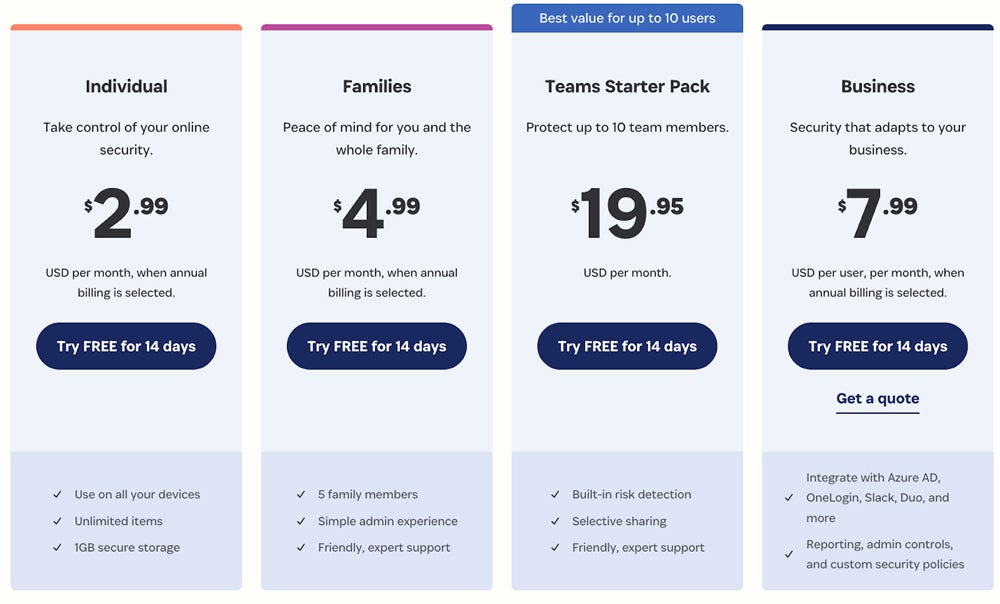
Better for Core Features: 1Password
Winner: 1Password is more robust in compatibility and features (especially with its Business plan), but Dashlane is a better choice for dark web monitoring.
Dashlane Business and Enterprise offer support for unlimited devices, SSO integration, personalized security alerts, and secure group sharing. However, Dashlane’s most notable feature is 24/7 dark web monitoring for up to five email addresses. It includes a password health dashboard with up-to-date information on compromised accounts, real-time phishing alerts, and detailed reports regarding breached passwords.
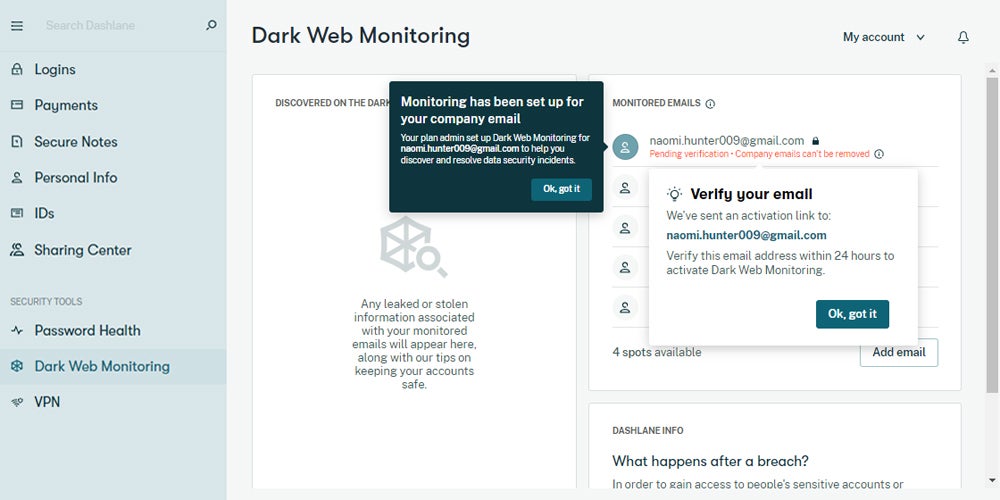
1Password may not be as thorough as Dashlane’s with dark web monitoring, but it’s compatible with more file types (CSV, 1PIF, 1PUX), operating systems (including Linux), and biometric logins (fingerprint, face, iris). There’s a greater disparity in features between the Teams and Business tiers; the latter adds custom reports, SSO, and SCIM provisioning. 1Password Teams users can still avail of domain breach reports, masked emails, and secure sharing.
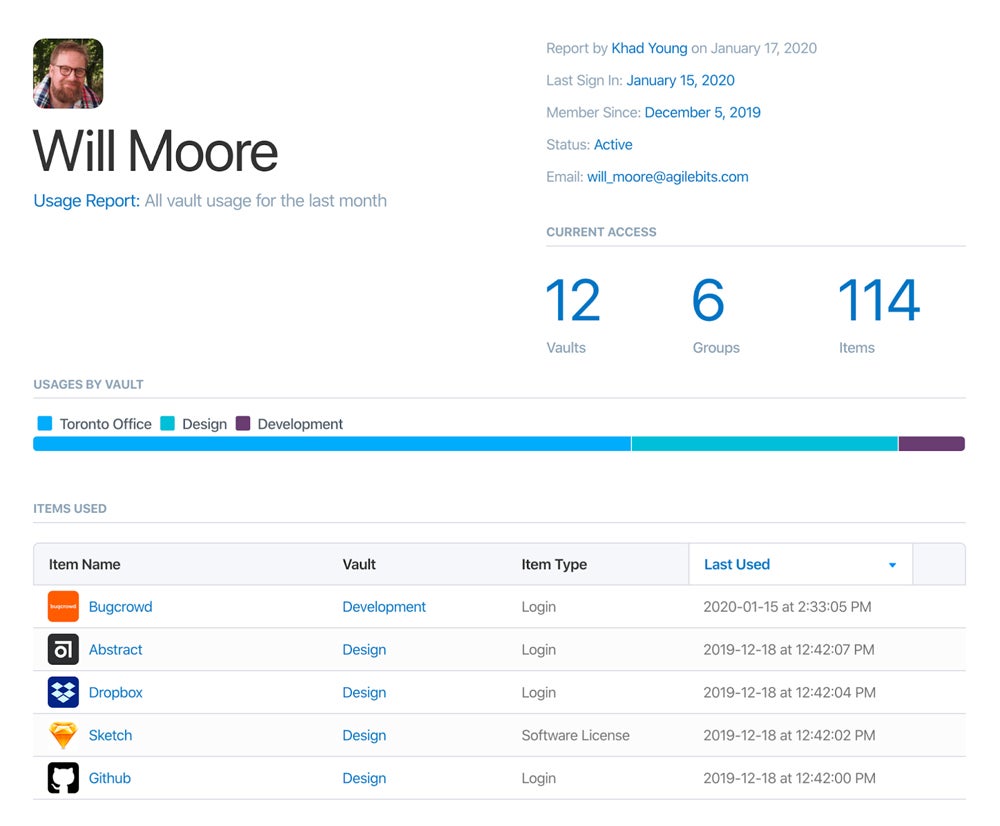
Better for Advanced Features: 1Password
Winner: Dashlane’s built-in VPN is a nice perk, but 1Password has the advantage when it comes to collaborating with clients and safeguarding data during travel.
Dashlane Business and Enterprise come with an integrated VPN for access to region-locked content and to provide an extra layer of protection when browsing unsecured WiFi networks. All Dashlane plans come with support for unlimited passkeys and secure notes with 1GB of encrypted storage. However, secure sharing is limited to other Dashlane users, so keep that in mind if you collaborate with contractors or clients often.
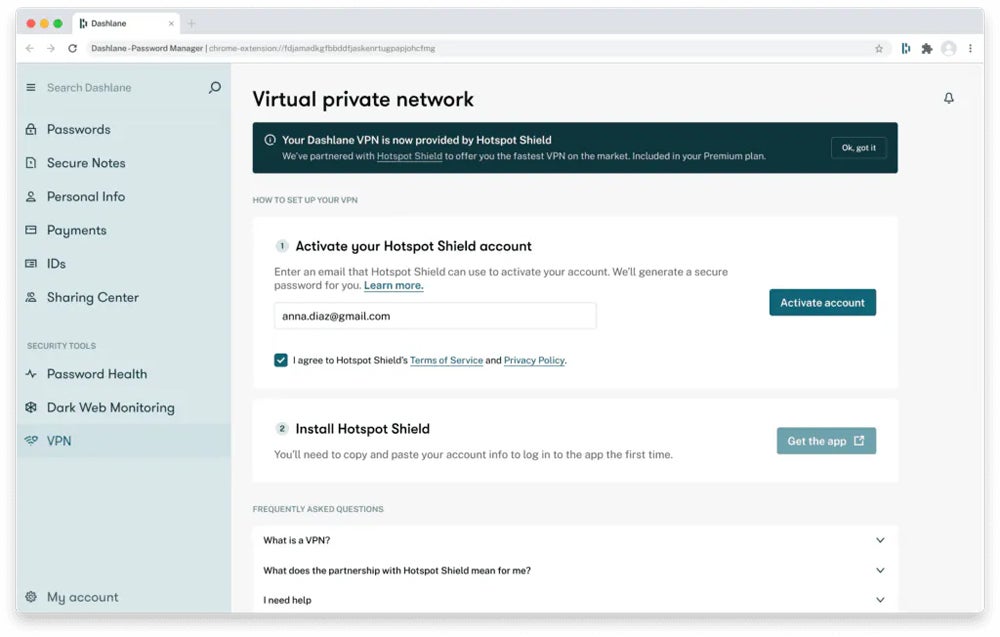
1Password offers secure sharing with third parties through guest accounts, which grants non-team members limited access to files and apps. Instead of a VPN, 1Password has a travel mode that lets you remove secure vaults in transit and restore them upon arrival. To access all of 1Password’s high-level features, you’ll need a Business plan, which includes smart suggestions for potential breaches, SEIM integration, and 5GB of encrypted storage.
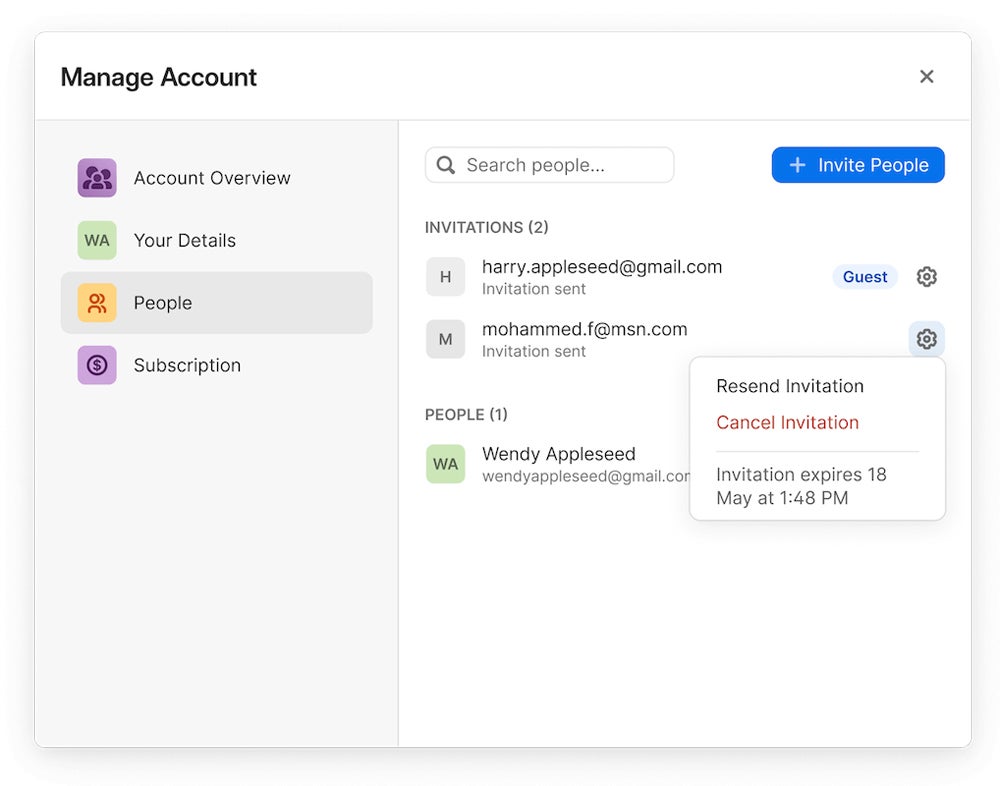
Better for Security: 1Password
Winner: Both options are highly secure, but 1Password takes this category for more transparency with its audits and support for security keys.
Dashlane is built on a zero-trust architecture that has never been breached. It uses AES-256 encryption for data and PBKDF2 standard for master passwords. Security audit details aren’t as easily accessible, but the source code for Dashlane’s iOS and Android apps is publicly available on GitHub. Other security measures include 24/7 dark web monitoring and a built-in VPN, both of which are included with Dashlane Business and Enterprise.
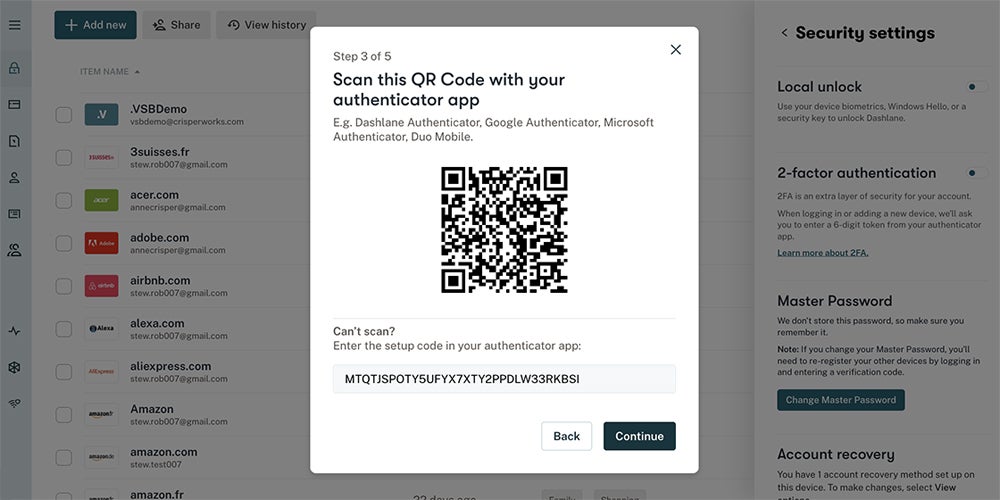
1Password also boasts a clean breach history and uses zero-trust architecture with AES-256 encryption. If you lose access to your account, 1Password supports physical security keys like YubiKey or Titan to prevent unauthorized access. Although 1Password does not make its source code publicly available, it’s transparent about the results of its third-party security audits and penetration tests, which are conducted several times a year.
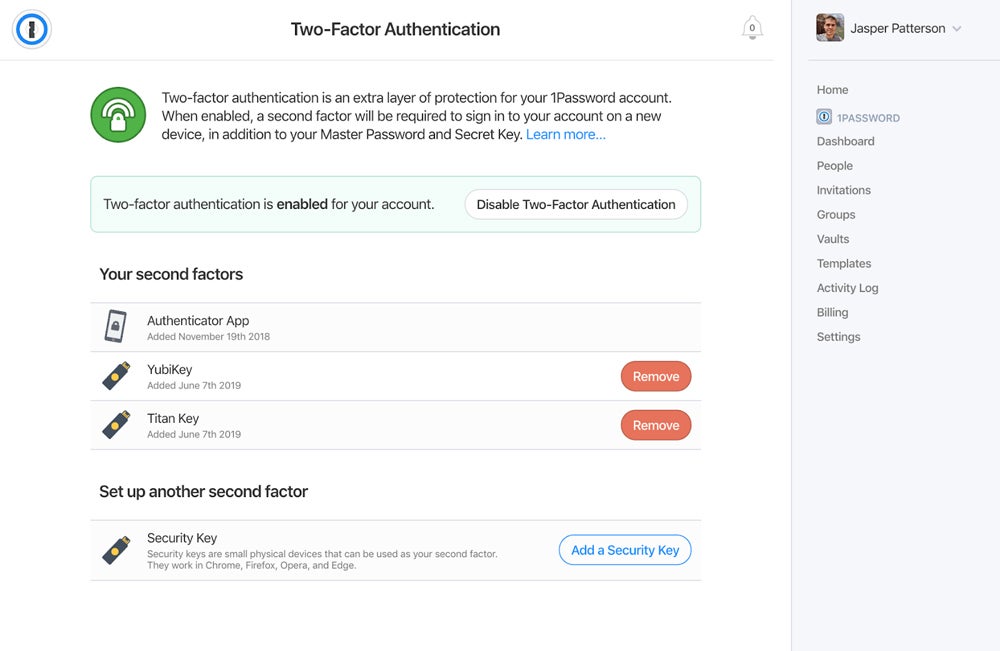
Better for Usability & Administration: 1Password
Winner: It’s a close call for ease of use, but 1Password gives admins more tools at their disposal for monitoring activity and setting custom permissions.
Dashlane stands out for its seamless one-click access, smooth sync across apps, and overall user-friendliness. It’s a good choice for teams that are new to password management software. On the other hand, native reporting is limited, and it’s not as customizable for admins as 1Password. Onboarding is included with Dashlane Enterprise; for help with setup, Dashlane has an active Reddit community and an extensive resource library to tap into.
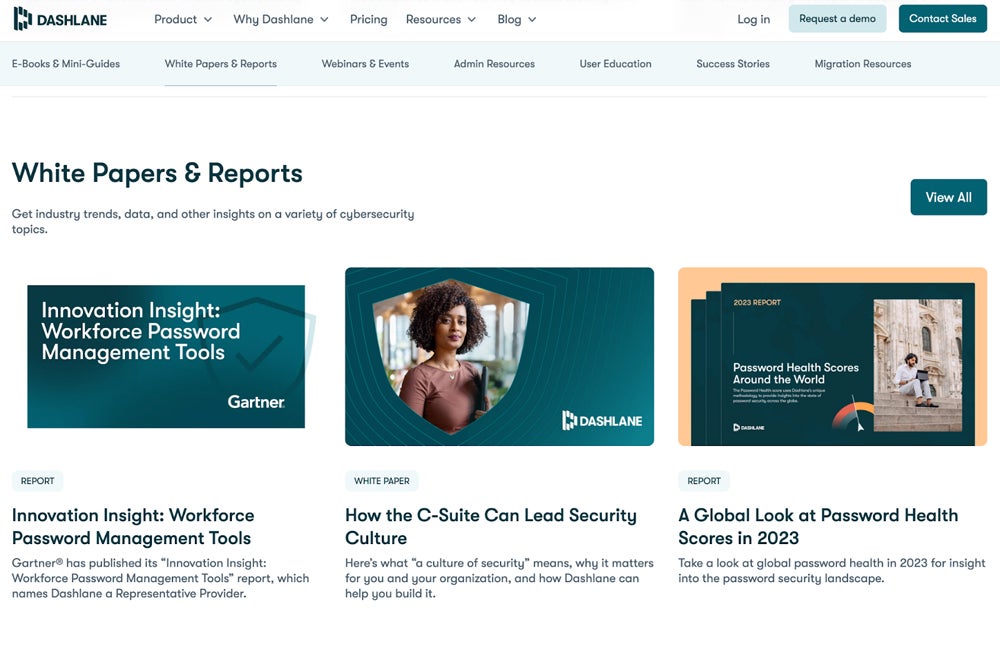
1Password offers administrators more flexibility when it comes to setting up custom groups and security policies and generating reports to monitor suspicious activity. Although it scores well for ease of use among users, there is a steeper learning curve with 1Password. Onboarding comes with Enterprise and Business plans with over 75 users. Smaller teams that need help with setup can access 1Password’s user forums and vast knowledge base.
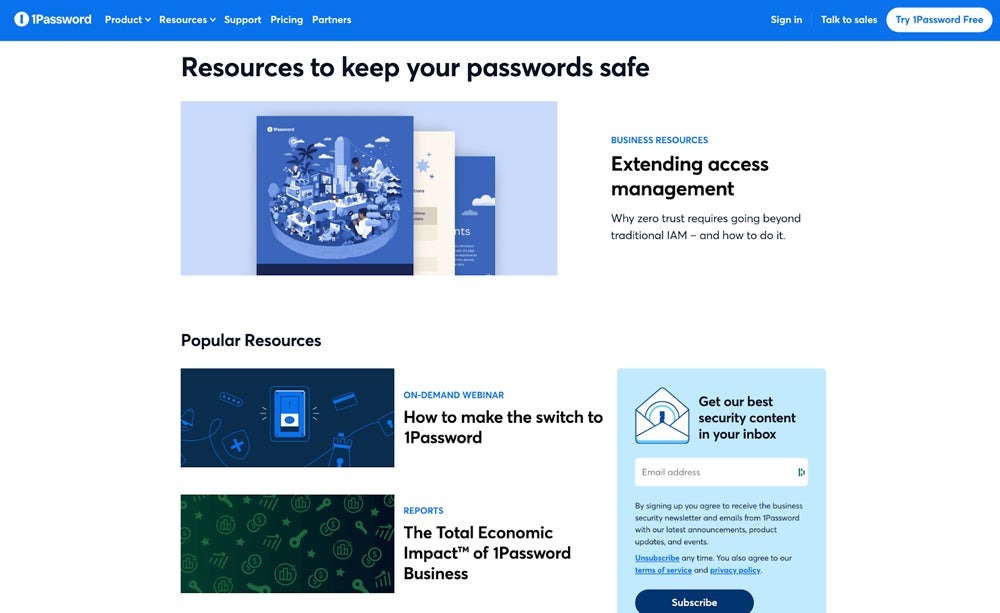
Better for Customer Support: 1Password
Winner: Both Dashlane and 1Password provide multiple support channels and access to a live demo upon request. However, 1Password’s support team has a more favorable reputation.
Dashlane Business and Enterprise comes with access to live chat on-demand phone support during East Coast business hours, but its AI chatbot and Reddit forum are on hand if you need assistance outside of that time frame. Email support is also available 24/7, but some users report that this method isn’t always timely. Dashlane Enterprise comes with access to a dedicated customer service rep for personalized 1:1 support.
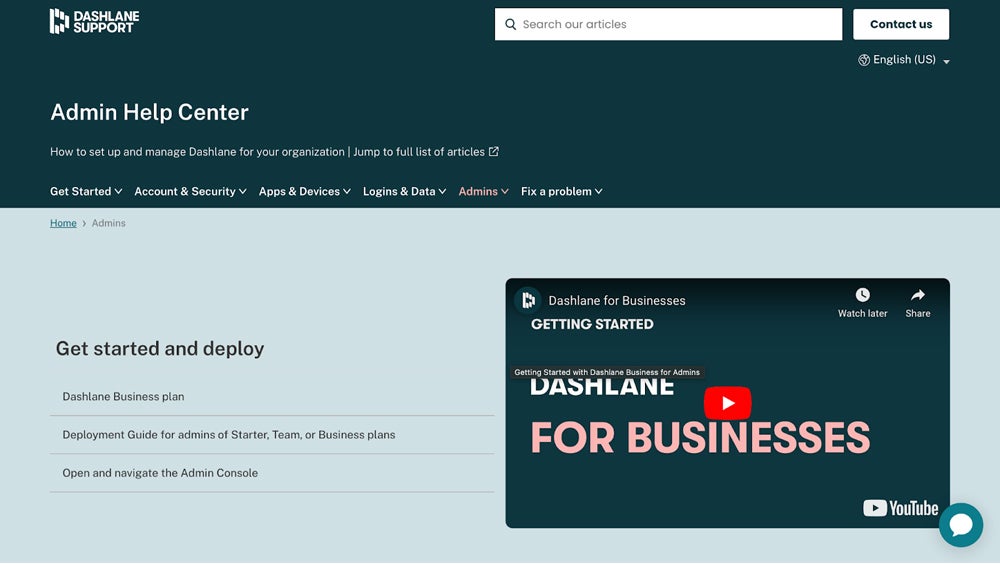
1Password provides all of its users with 24/7 support via email, chat, social media, and community forums. While it doesn’t have on-demand phone support as Dashlane does, 1Password receives slightly higher marks from its users for a more seamless support experience overall. Enterprise and Business plans with over 75 seats are appointed a dedicated technical account manager. Both platforms offer a live demo upon request.
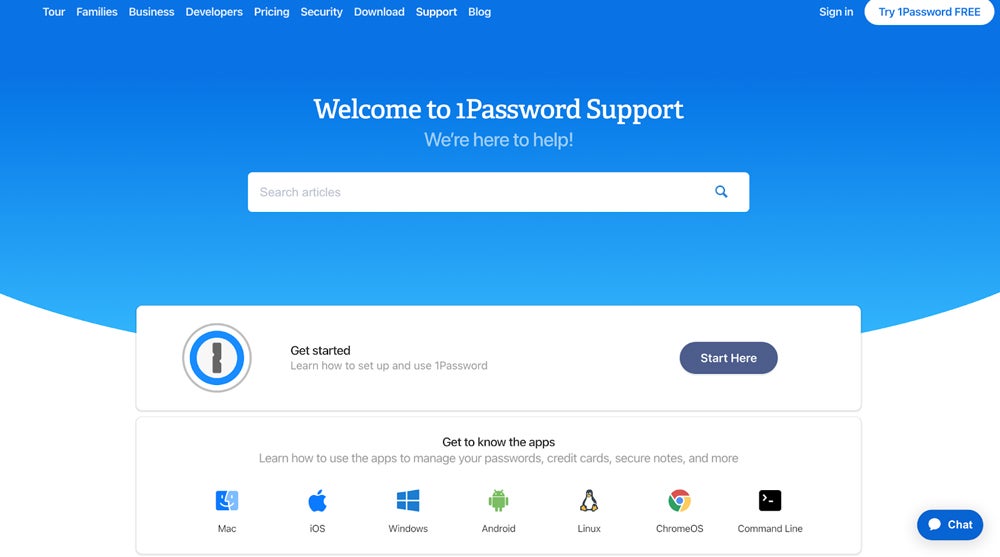
Who Shouldn’t Use Dashlane & 1Password?
Dashlane and 1Password have their strengths, but you’ll want to consider something else if their glaring weaknesses align with your company’s most pressing needs. Here are a few use cases where these password managers may not be a right fit for your business.
Who Shouldn’t Use Dashlane
Look for an alternative to Dashlane if you identify with any of these scenarios:
- Small companies with a small budget: Dashlane eliminated its Teams plan and doesn’t allow for flexibility in billing. Although there’s a free-for-life option, it’s incredibly barebones.
- Businesses that collaborate often with non-employees: Guest accounts aren’t available, which may limit what and how you can share with clients and contractors.
- Users who prefer a dedicated desktop app: Dashlane no longer supports a dedicated app for Windows, Mac, or Linux. You must use the browser extension on your desktop or laptop.
Who Shouldn’t Use 1Password
1Password may not be the right choice for your business for these reasons:
- Teams new to password managers: While its UX is generally well-received, 1Password may be overwhelming for employees who are new to this type of software.
- Admins who want live 1:1 support: 1Password doesn’t offer phone support and its chat is run by AI instead of a live agent.
- Organizations that want a simple solution: Provided your business only requires top-notch data encryption and strong password generation, 1Password might be overkill.
3 Best Alternatives to Dashlane & 1Password
If neither Dashlane nor 1Password is a good fit for your network securit y strategy, there are other options to consider. Find out why you may want to go with LastPass, Keeper, or Bitwarden instead.
LastPass is an attractive choice for small teams that have never used password management software because it’s easy to deploy and has a minimal learning curve. LastPass Teams costs $4 per user per month and includes passwordless login, offline mode, and dark web monitoring. Upgrading to LastPass Business at $7 per user per month adds over 100 custom security policies, advanced reporting, and API access.
Support options include 24/7 email and phone support. There’s a free version of LastPass that provides passwordless login and dark web monitoring for a single device. Just note that LastPass has been breached in the past, so reconsider if you deal with a lot of sensitive data.
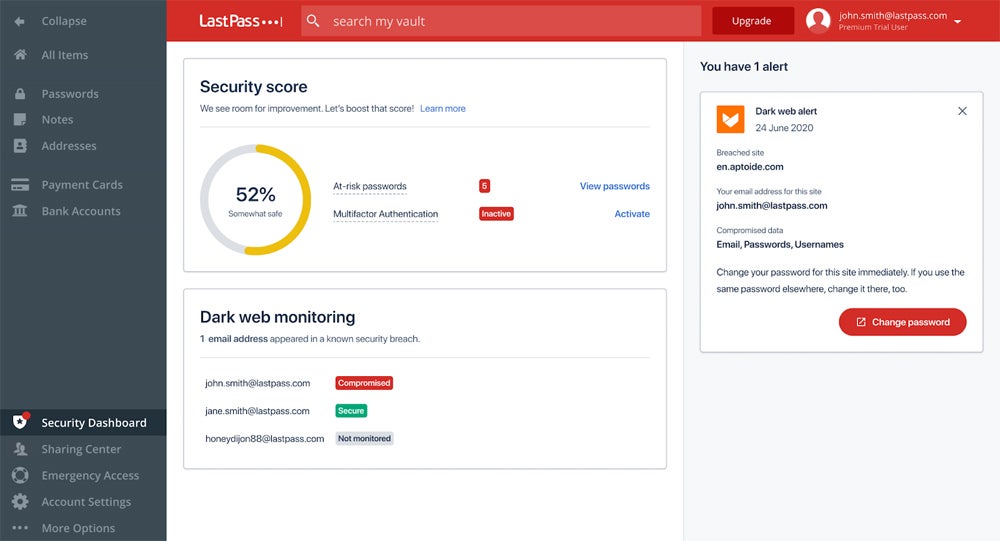
For more details about this password manager, read our LastPass review . You can also learn about LastPass alternatives by reading our 1Password vs LastPass showdown or our Dashlane vs LastPass breakdown.
Keeper is a versatile and affordable password manager for businesses of all sizes, as well as managed service providers (MSPs). Its Business Starter plan costs only $2 per user per month for up to 10 users and comes with basic 2FA, activity reporting, and a free Family plan for every user. Keeper Business at $3.75 per user per month has additional advanced admin tools, and Keeper Enterprise (contact for quote) includes SSO, command line provisioning, and APIs.
You can tailor Keeper to meet your company’s needs through add-ons such as compliance reports, additional secure file storage, and an encrypted chat for workspaces. While this is convenient, these add-ons could end up costing you quite a bit more each month.
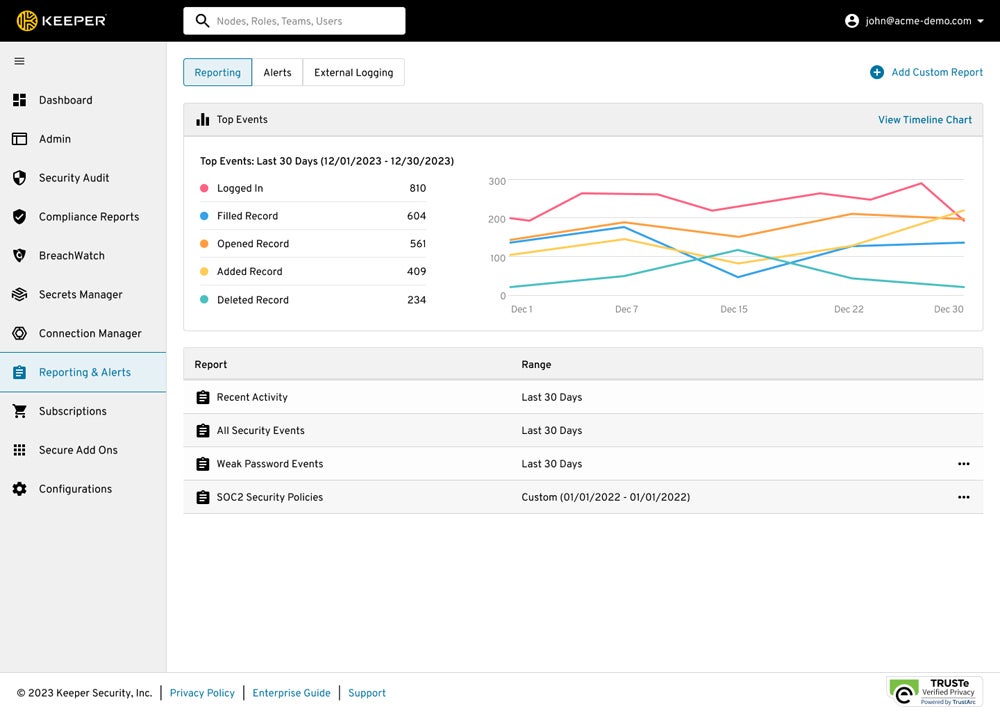
Find out more about this affordable password manager in our complete Keeper review . Alternatively, see how it stacks up against Dashlane and 1Password in our Keeper vs Dashlane and 1Password vs Keeper guides.
Bitwarden is a password manager known for its open-source and locally hosted options. (Its code has been publicly available on GitHub since 2016.) Its full-featured Teams plan, from $4 per user per month, supports unlimited users, two-step login with either digital or physical keys, and emergency contacts. Bitwarden Enterprise (from $6 per user monthly) adds self-hosting, SSO integration, and customizable roles and policies.
Though you might be enticed by the low monthly per-user price, Bitwarden is hindered by a clunky user and admin experience that could prove especially frustrating for those new to PMs. On the other hand, admins who want a malleable platform will find a lot of flexibility with Bitwarden.
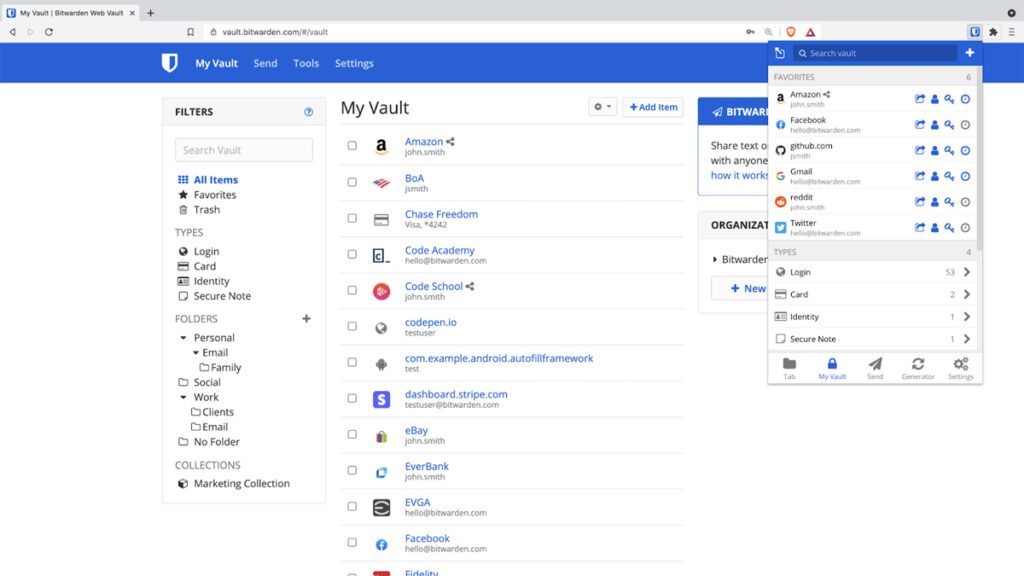
Our analysis of Bitwarden vs 1Password explains how these password managers rate when it comes to pricing, features, and usability.
How I Compared Dashlane & 1Password
To compare Dashlane and 1Password, I created a scoring rubric based on six key criteria businesses most often consider when selecting a password manager: core features, security, ease of use, advanced features, user support, and pricing. Each criterion included multiple subcriteria and was weighted according to its relative importance. Both software received a final score out of 5, with individual category winners named, too.
Core Features – 25%
Core features are the foundation of any password manager and integral to its success. For this category, I honed in on must-have functions — 2FA/MFA, password recovery options, monitoring and reporting, policy management, and secure sharing — as well as the degree of compatibility across mobile, desktop, and web browsers. I also considered other key features like autofill, auto-save, biometrics, and password generator/evaluator.
Security – 20%
Password managers are trusted by organizations to securely store and protect their sensitive data. To evaluate Dashlane and 1Password’s commitment to security, I considered their encryption standards, third-party audit history, master password protection methods, and whether they implement a zero-knowledge or zero-trust architecture. I also researched their breach history to gauge the strength of their infrastructure against hackers.
Ease of Use & Implementation – 20%
Admins and employees are likelier to buy into a password manager if it’s easy to deploy and use. To determine this category score, I reviewed G2 scores and feedback regarding Dashlane and 1Password’s ease of setup and overall usability. I also considered each software’s reporting capabilities, security policy management, user provisioning features, and the accessibility of its knowledge base.
Advanced Features – 15%
Companies with complex needs will benefit from a password manager with higher-level features. Here, I looked for the availability of travel modes, guest accounts, custom sessions, VPNs, passkey support, and IAM/PAM integrations. Developers and admins wanting greater control over their software may want access to a CLI and the ability to add storage.
Customer Support – 10%
When dealing with a technical emergency, businesses need timely and effective support. I evaluated the availability of Dashlane and 1Password’s customer service channels and reviewed G2 user feedback regarding the quality of support they’ve received from each. I also looked for access to live demos, status reports, and onboarding services for enterprises.
Pricing – 10%
To help you determine which password manager would be the right fit for your budget, I evaluated each software’s pricing structure for team, business, and enterprise plans. In addition to that, I looked at whether Dashlane and 1Password offer a free trial and flexible billing.
Bottom Line: Dashlane vs 1Password
1Password emerged as the victor in all categories, but it helps to go beyond the ratings. Dashlane stands apart from 1Password for its built-in VPN, extensive dark web monitoring, and comparatively shallow learning curve. Both platforms charge the same for their Business plans so if that’s what you’re after, the right choice will come down to the features you’re willing to pay for, the level of compatibility you need, and the quality of support you require.
Password managers are essential to any business that operates online, but how else can you protect sensitive data? Read our guide to the most common types of network security solutions to find out.
Get the Free Cybersecurity Newsletter
Strengthen your organization’s IT security defenses by keeping up to date on the latest cybersecurity news, solutions, and best practices. Delivered every Monday, Tuesday and Thursday
Previous article
Next article

Subscribe to Cybersecurity Insider
Strengthen your organization’s IT security defenses by keeping abreast of the latest cybersecurity news, solutions, and best practices.
IT Security Resources
Cyber security in banking: threats, solutions & best practices.

What is a Virtual Private Network (VPN)? VPN Security Explained

The RAMBO Attack Explained: Risks, Implications, & Mitigations for RSA Security

Vulnerability Recap 9/9/24 – Exploited Vulnerabilities Persist

Top Cybersecurity Companies
Get the free newsletter.
Subscribe to Cybersecurity Insider for top news, trends & analysis
Related Articles

7 Best User & Entity Behavior Analytics (UEBA) Tools

How to Use Dashlane in 2024: Complete Starter Guide

Top Cybersecurity Startups You Need to Know in 2024
Get access. Manage passwords. Prevent breaches.
Protect more than your passwords with intuitive credential management for your whole organization. Set, forget, and trust Dashlane to secure your people and data against breaches.
TRUSTED BY LEADING ORGANIZATIONS ACROSS THE WORLD

Seamless workforce access
Log in fast, get to work faster
Dashlane seamlessly integrates with your security stack and employees' day-to-day work, closing a critical security gap and powering secure access.
Autofill passwords:
Immediate, reliable account login every time
SSO integration:
Faster deployment, provisioning, and access
proactive BUSINESS protection
Stay ahead of threats
With an organization-wide Password Health score, continuous monitoring, and automatic alerts, we keep entire orgs protected against breaches.
Phishing alerts:
Built-in, real-time warnings for phishing resistance
Dark Web Insights:
Proactive monitoring of compromised passwords
patented privacy
Enjoy enterprise-grade protection
We pair patented, zero-knowledge architecture with the strongest encryption available to safeguard against credential-based threats.
Security principles:
The architecture powering our platform
Trust Center:
The procedures, controls, and compliance keeping organizations safe
Commitment to compliance
Dashlane stays up-to-date on the latest industry standards, and we have the certifications to prove it.

Innovative protection for your entire enterprise
Security threats evolve—but so do we. Dashlane is at the forefront of credential security innovations, keeping passwords protected and employees seamlessly connected to the access they need.

Start using the secure, phishing-resistant password replacements that you can store right in Dashlane.

Enjoy an easier, faster, more secure way to access Dashlane and other accounts.

Seamlessly integrate Dashlane with your Identity Provider (IdP) to give employees easy access to their vaults and automate Dashlane user provisioning, deprovisioning, and management.
The leading password manager
Between recognition for our security standards and awards for our easy-to-use platform, there’s a reason Dashlane is leading the way as the credential manager for organizations of all sizes.

Trusted by 23,000 organizations & millions of people worldwide
From new to established and private to public, companies across the globe love how Dashlane pairs enterprise-grade security with consumer-grade design in one easy-to-use platform.

“Dashlane’s security is the best. I love the solution’s architecture.”

“People who use Dashlane love it.”

“Dashlane is one of the main ways we demonstrate how seriously we take security.”

“Dashlane is crucial for keeping our business running smoothly. We couldn't be happier with it.”

“For us, Dashlane set the standard for password managers.”
#1 password manager in customer satisfaction.
Don’t just take our word for it: The proof is in thousands of positive reviews.
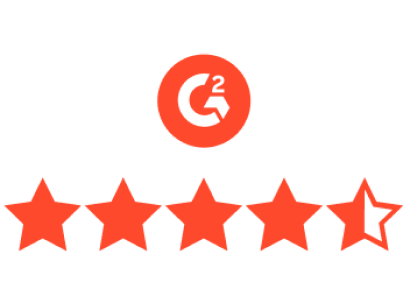
The latest in security news, views, and trends

A Global Look at Password Health Scores in 2023
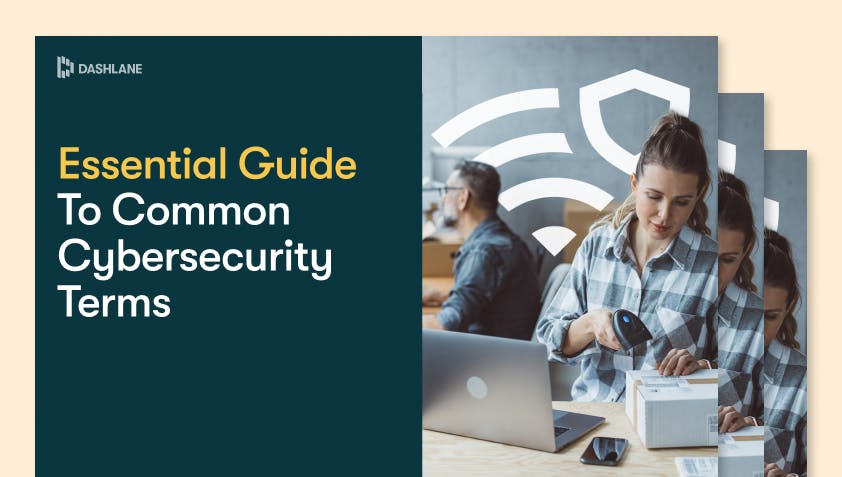
Essential Guide to Common Cybersecurity Terms

Future of Passwords and Passkeys Panel
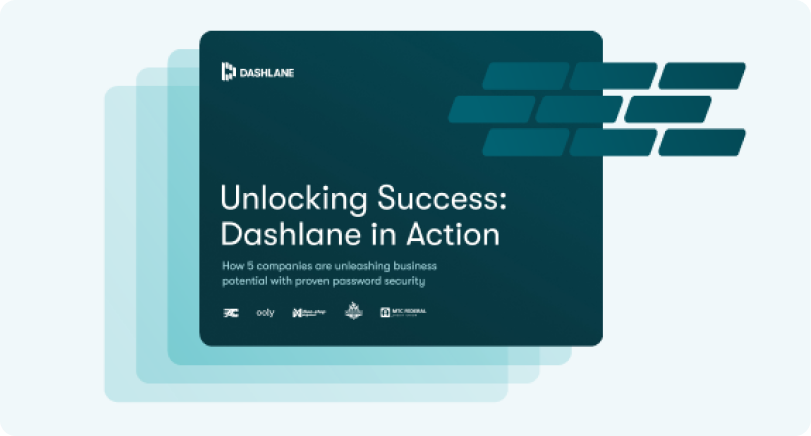
How 5 Companies Solved Cybersecurity Challenges
Password manager faqs.
Still have questions? Check out our Help Center or contact us .
What is a password manager?
How does a business password manager work, how does dashlane improve business security, is a business password manager scalable for growing organizations, what if dashlane gets hacked, how do i get started with dashlane, how do i switch to dashlane, what onboarding help does dashlane provide businesses, experience the expert-backed solution.
Please note: We use cookies on our site to give you the best experience. Please accept these cookies, or change your settings here: Cookie preferences.

Safari Pearl Comics 18
Comic book store, costume store, business info, similar businesses.

Eclectica 5
Safari Pearl Comics 4
Book people of moscow 14, safari pearl 18, book people of moscow 98, nearby neighborhoods, moscow , id.
- Media Assets
- Investor Relations
- Get Started
- Neighborhoods
- 2023 Neighborhood Faves
- Anti-Racism Resources
Business and Organizations
- Small Business
- Brands & Agencies
- Public Agency
- Businesses on Nextdoor
- Neighborhood Faves
- Self-Service Ad Terms
- For Developers
- Home & Garden
- Real Estate
- Professional Services
- Food & Entertainment
- Shopping & Retail
- Medical & Dental
- Legal & Terms

IMAGES
VIDEO
COMMENTS
Dashlane offers apps for Windows, Mac, Linux and Chrome OS on desktop as well as mobile apps for iOS and Android. There are also browser extensions available for Chrome, Safari, Edge, Firefox ...
In 2024, we tested 11 password managers: 1Password, Bitwarden, Dashlane, Enpass Premium, Keeper, mSecure, NordPass, Proton Pass, RoboForm Premium, Sticky Password, and Zoho Vault. We installed ...
Dashlane is described as 'Password manager that can generate unique passwords and also record purchase history across websites' and is a popular password manager in the security & privacy category. There are more than 100 alternatives to Dashlane for a variety of platforms, including Android, Linux, Mac, Windows and iPhone apps. The best Dashlane alternative is Bitwarden, which is both free ...
Dashlane is a versatile password manager and digital wallet that allows you to keep your personal information secure. Works on Windows/OS X, Android/iOS, Firefox/IE/Chrome/Safari.
9. Avira Password Manager. Avira Password Manager offers a user-friendly interface and robust security features, making it an attractive alternative to Dashlane. The software focuses on cross-device sync, allowing users to access their passwords seamlessly across various platforms and devices.
Security. Both Dashlane and 1Password use AES-256 encryption. Dashlane offers dark web monitoring, while 1Password offers its Watchtower feature that alerts you of any suspected or known security ...
Meanwhile, Dashlane supports Chrome, Safari, Firefox and Microsoft Edge. Bitwarden also supports Linux, F-Droid and Command Line Interface — a plus for more technical users.
Keeper: Better for cost, secure sharing, and customer support ($2 per user per month for Starter plan; $3.75 per user per month for Business plan) Dashlane: Better for ease of use plus core and ...
Dashlane Business is $96 per year per seat, or you can purchase a Starter plan subscription, which is $240 annually for up to 20 users. 1Password's equivalent business tiers are $95.88 per year ...
The best overall Dashlane Password Manager alternative is LastPass. Other similar apps like Dashlane Password Manager are 1Password, Keeper Password Manager, RoboForm, and Bitwarden. Dashlane Password Manager alternatives can be found in Password Managers Software but may also be in Core HR Software. Answer a few questions to help the Dashlane ...
Dashlane Alternatives. 1. 1password.com: : : : : $3.99 / month. Visit 1Password Review. 1Password. 2. ... Firefox and Safari. Mobile apps are available for Android and iPhone, and they include an ...
However, the feature doesn't work on the Safari browser—as of now—but Dashlane is working on bringing it to Safari very soon via Apple's Safari 17 release. ... Dashlane Alternatives.
May 9, 2021. Almost everyone thinks Bitwarden is a great Dashlane alternative. Bitwarden is the most popular Web-based, Windows, Android & Mac alternative to Dashlane. Bitwarden is the most popular Open Source & free alternative to Dashlane. Bitwarden is Freemium andOpen SourceDashlane is Paid and Proprietary.
Edge, Chrome, Firefox, Safari, Opera: Visit Dashlane: ... 3 Best Alternatives to Dashlane & 1Password. If neither Dashlane nor 1Password is a good fit for your network security strategy, there are ...
The chart below details top workplace features and the key differences between the Dashlane Team and Business plans. . Starter. Business. Cost (per month per user, billed annually) $2. $6 ...
I want to see if you guys have a good alternative out there. Archived post. New comments cannot be posted and votes cannot be cast. Bitwarden. If you're looking for free, you could go to keepass and keep the encrypted database file (AES256) synced to your various devices via Google drive or Dropbox.
The Dashlane Safari extension improves your online experience. An extension—also called a plug-in or an add-on—is a small program you download to add features to your computer browser. From the extension pop-up, use the shortcuts to open the web app, sync your devices, and access our Help Center. You can also manage your logins and other ...
Step 2: Import your data from Safari into Dashlane. Import your Safari CSV file into Dashlane using our web app or Android app. You can't import a CSV file to Dashlane using the iOS (Apple) app, the Dashlane macOS app, or the Dashlane Safari extension. Important: CSV files aren't encrypted, and others can read them.
Chrome maintains its longtime lead on this test with a score of 528. Edge, Opera, and other Chromium-based browsers hew closely to Chrome. Firefox and Safari bring up the rear, at 515 and 468 ...
The New Safari Web Extension. With the help of all the feedback received here in the community and across all of our channels, we're happy to announce the new Dashlane Safari Web Extension will be released later this month! Enjoy all Dashlane Autofill key features and settings in a new interface that completely integrates with the Apple ecosystem.
Dashlane encrypts your information and uses zero-knowledge architecture to protect and secure passwords and sensitive data. Additionally, admins have more control with a password manager, including an Admin Console to configure policies and settings. Admins also have tools to manage and monitor users, giving them visibility into the ...
18 Faves for Safari Pearl Comics from neighbors in Moscow, ID. Connect with neighborhood businesses on Nextdoor.
#Sancharam #Siberia #SafariTV #Santhosh_George_Kulangara #Lal_JoseStay Tuned : https://www.safaritvchannel.com Enjoy & Stay Connected With Us !!---...